
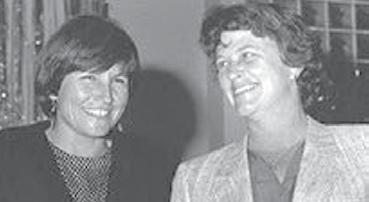
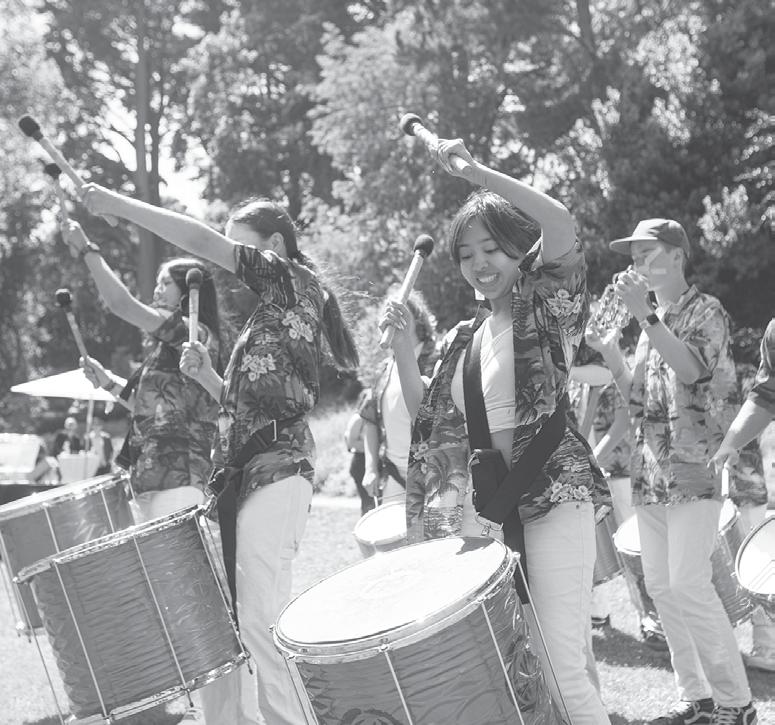

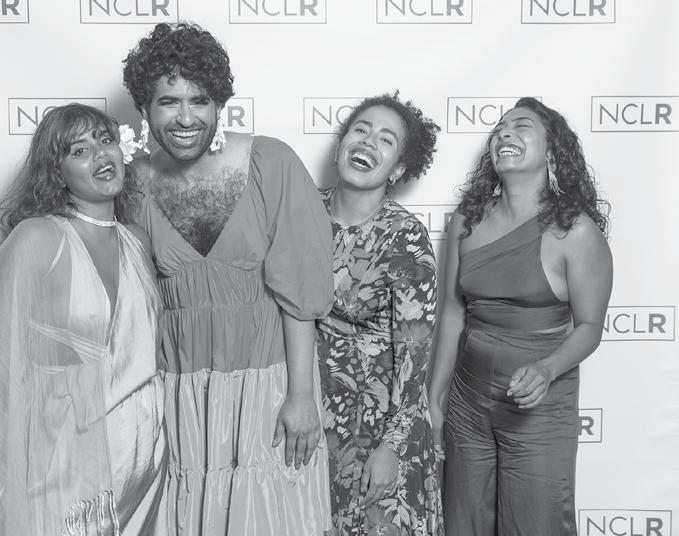

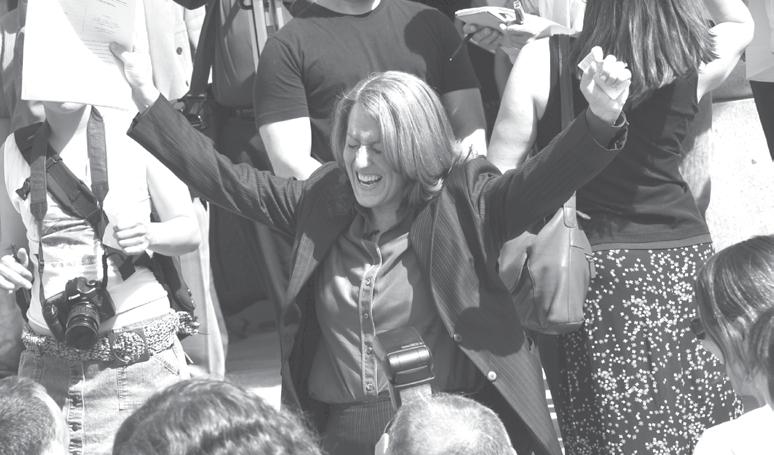
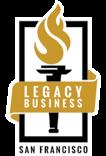
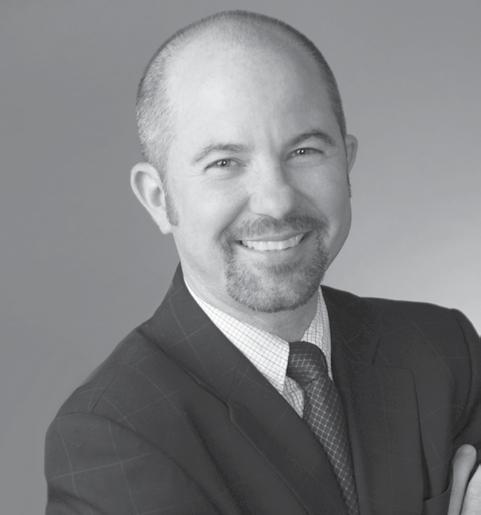
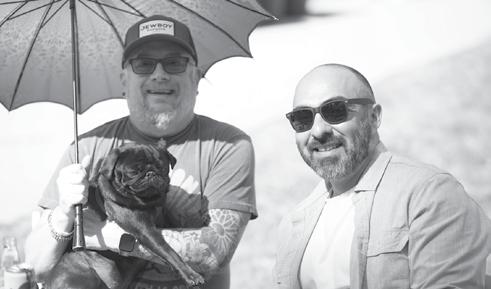

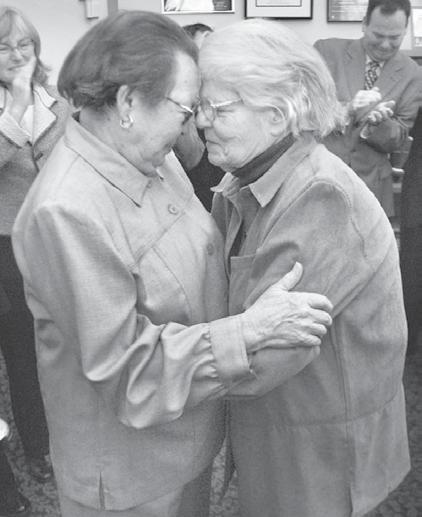

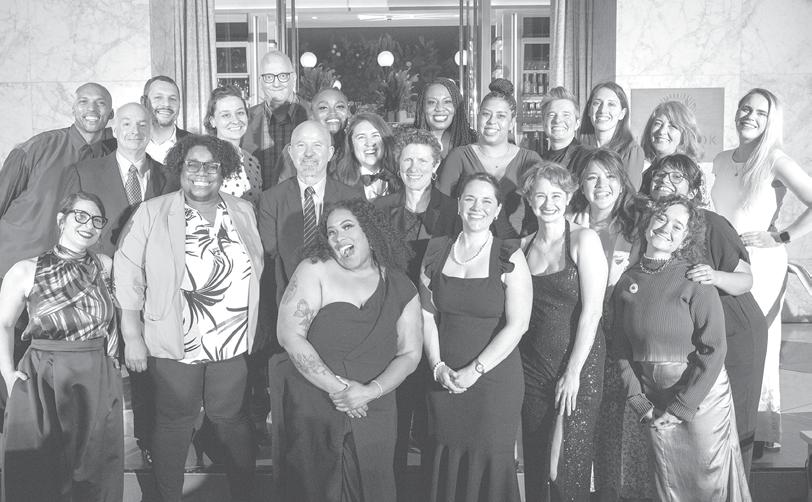

















After nearly 50 years as a leading LGBTQ civil rights organization, the National Center for Lesbian Rights (NCLR) announced this week that it is changing its name to the National Center for LGBTQ Rights (NCLR) to better reflect its longtime commitment to advocacy on behalf of the full LGBTQ community.

NCLR was founded in 1977 by Donna Hitchens, who went on to become the first openly lesbian judge elected to the bench in the United States, and Roberta Achtenberg, the first openly LGBTQ person appointed to a position requiring U.S. Senate confirmation. NCLR’s original name reflected the fact that it was the first national LGBTQ organization to be founded by women. The organization was revolutionary because it recognized that lesbian women

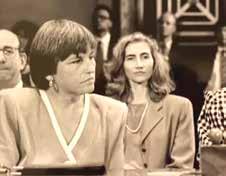
faced unique legal challenges that were not being addressed by existing gay rights organizations, which tended to focus on issues more relevant to gay men. By creating specialized legal advocacy for lesbians, particularly around family law issues, NCLR helped establish new areas of civil rights law that would benefit the entire LGBTQ community.
Hitchens’ and Achtenberg’s initial goal was to provide legal support to lesbian mothers fearful of losing custody of their children after coming out, which very quickly expanded to advocating on behalf of gay parents living with HIV, transgender parents, asylum seekers, and young people seeking justice in schools and on the playing field.
Since its founding, NCLR has become a leading national impact litigation organization, taking on Prop 8, winning marriage equality in California and nationally, defending transgender servicemembers, fighting for health care for LGBTQ people, and defending laws protecting LGBTQ youth from conversion therapy.
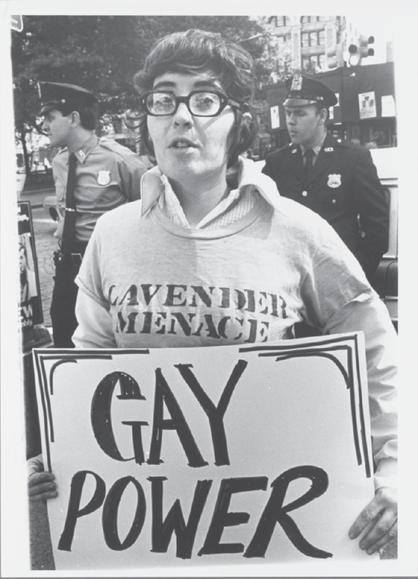

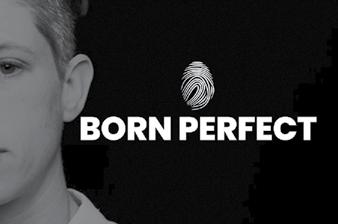
“NCLR’s feminist roots have always called on us to support and amplify the most underrepresented communities and those often left out of the mainstream movements,” Imani Rupert-Gordon, President of NCLR, told the San Francisco Bay Times. “At a time when the LGBTQ community is facing increasing attacks, it is critical that we are crystal clear that we represent the entire community. Without losing touch with our roots, NCLR will continue its nearly 50-year commitment to protecting the most vulnerable members of our community, forging new partnerships, and working toward a day when every LGBTQ person can live with
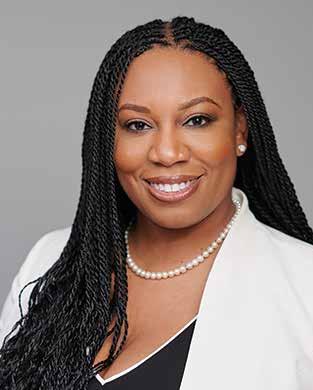
full dignity, equality, and freedom under the law.”
San Francisco is the birthplace of so much of the LGBTQ movement, and NCLR was the first national legal organization rooted in our region. For decades, NCLR curated a community of feminists—many of them lesbians—who understood the importance of inclusion, collaboration, and focusing our fight for equity on those most vulnerable to oppressive systems.
When NCLR was founded, the women’s movement avoided issues impacting lesbians. Dubbed the “Lavender Menace,” queer women were seen as a threat to the goals set forth by heterosexual feminists like Betty Friedan and organizations like The National Organization of Women (NOW), who eschewed ideas of queer liberation in favor of expanding rights for women willing to align themselves with a heteronormative worldview.
At the same time, the gay rights movement, focused on morality laws and the AIDS crisis affecting gay men, did not consider “women’s” issues like child custody and caregiving to be of much importance. As a result, like many times before and since, lesbians took care of themselves, and, in turn, so many others. NCLR was born of this exclusion, and from day one, they’ve committed to setting a better example, expanding their vision, and their organization, to include those most in need of legal support. This work has always been unique. NCLR is
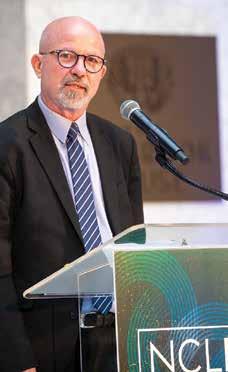


(continued from page 2)
consistently expanding their programming to meet the moment. In 1994, when the Clinton Administration affirmed that LGBTQ foreign nationals facing discrimination at home could seek asylum in the United States, NCLR was the first to create an Immigration and Asylum program. Now called Hogar (Home), the project has been operating for more than 30 years, helping hundreds of LGBTQ asylum seekers and their families find a safe home within our borders.
After successfully drafting and helping pass legislation to ban conversion therapy for LGBTQ minors in California in 2012, NCLR in 2014 created Born Perfect, a first in the nation program to ban the dangerous and ineffective practice of conversion therapy nationwide. After more than 10 years, Born Perfect’s efforts have been successful in 22 states, and have built a network of conversion therapy survivors working together to end the practice for good.
NCLR’s litigation team takes the cases many will not, starting with lesbian moms fighting for custody in the 1970s and 1980s and expanding to child custody rights for transgender parents, same-sex second parent adoption, workplace discrimination, and spousal benefits after a wrongful death. Outside of litigation, NCLR has maintained a strategy based on coalition building, creating policy programs focused on reproductive rights, economic justice, common ground with religious organizations, and LGBTQ equity in education.
There are big wins: two same-sex parents on a birth certificate; marriage equity in California and then the United States; NCAA policies supporting LGBTQ athletes; representing the first transgender parent in a custody case; stopping Don’t Say Gay policies in states like Arizona, South Carolina, and Florida; and so much more.
And today, suing the Trump administration four times since January—and counting.
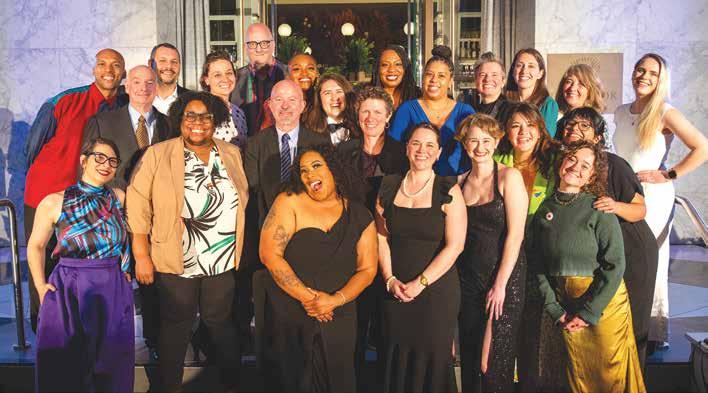
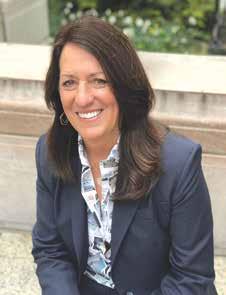
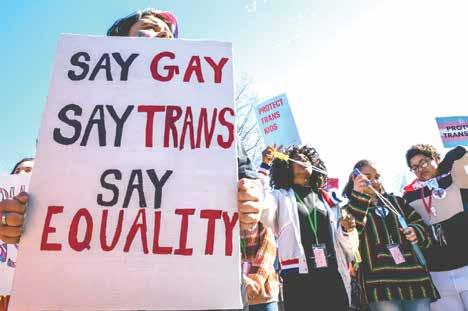

The lesbian community has always been special: fiercely loyal, intensely interconnected, and always ready to pull together to protect, support, and fight for the community. Being the National Center for Lesbian Rights at a time when queer women needed it most was a great honor for the organization. Women have fought for centuries to be prioritized and NCLR did just that. The response was great: a family of supporters for meaningful, essential work.
NCLR remains committed to centering issues that matter most to families, and to prioritizing queer women; to upholding and honoring lesbian history while ensuring that, like the founders felt almost 50 years ago, not a single member of the LGBTQ community will feel unwelcome, unseen, or unsupported in NCLR’s work.
“Being the executive director of the National Center for Lesbian Rights from 1996–2018 will continue to be one of my greatest life honors,” Kate Kendell told the San Francisco Bay Times. “The work of NCLR impacts every single member of the LGBTQ community from employment and housing protections, the right to marry and create a family, to immigrating and creating a new home in the United States without violence and oppression. I could not be prouder to now be the former executive director of the
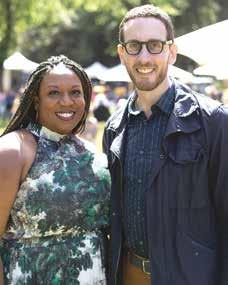
National Center for LGBTQ Rights! I am so proud to be a part of an organization and a community that actively responds to the needs of its constituents, declaring loudly and proudly what has been true since 1977—that NCLR is for everyone!”
NCLR is clear in the vision for this name change, wanting everyone to know that the breadth and scope of the work have been inclusive from the very beginning, and that every LGBTQ community member is welcome.
“This change reflects what has always been true: NCLR works tirelessly to defend, protect, and advance the entire LGBTQ community,” NCLR Legal Director Shannon Minter told the San Francisco Bay Times. “Since this administration took office,
(continued on page 24)

Since 1977, NCLR—now known as the National Center for LGBTQ Rights—has been fighting for justice and equity for our entire community. Here’s a look back at some key moments in the organization’s history.
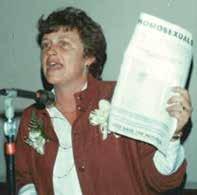


In 1977, two lesbian leaders—Donna Hitchens and Roberta Achtenberg—co-founded the Lesbian Rights Project, later renamed the National Center for Lesbian Rights and now the National Center for LGBTQ Rights. Achtenberg went on to be the first out lesbian to serve on the San Francisco Board of Supervisors. Hitchens was the first out lesbian to be elected to the bench in U.S. history.
Family Law is an area of focus at NCLR. In 1980, the organization won a landmark victory in California for Denise Kreps, who was denied a job as County Sheriff because of her sexual orientation. In 1986, NCLR also successfully represented Annie Affleck and Rebecca Smith as they become one of the first same-sex couples to jointly adopt in the U.S. In 1988, NCLR won one of the nation’s first court custody battles for a parent with AIDS on behalf of Artie Wallace, a gay dad whose son was kidnapped by his ex-wife. And in 2009, NCLR won a landmark case requiring Florida to recognize second parent adoptions from other states.
NCLR became the first LGBTQ legal organization in the country to launch a project dedicated to advocating for LGBTQ youth. In 2020, NCLR won a historic U.S. Supreme Court case upholding the right of colleges and universities to enforce non-discrimination policies that protect LGBTQ students. Directly following in 2011, NCLR successfully represented two LGBTQ students in Minnesota in one of the first cases allowing a samesex couple to attend a school dance.
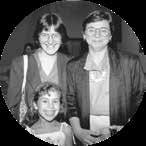
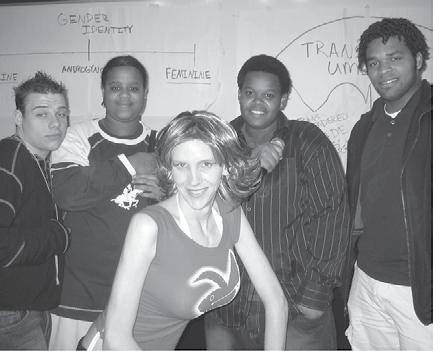
NCLR was the first national LGBTQ legal organization to create a program for LGBTQ immigrants and asylum seekers. The organization’s Immigration Project has helped thousands of LGBTQ immigrants obtain legal status in the U.S. NCLR has represented hundreds of asylum seekers. In 2012, NCLR helped a lesbian couple from the United Arab Emirates when they arrived in the U.S. to escape death threats from their families.
NCLR is the first LGBT legal organization to launch a permanent Elder Law Project as the first wave of baby boomers become senior citizens. In 2020, NCLR won a settlement from a senior housing facility on behalf of Mary Walsh and Bev Nance who had faced discrimination because they were a lesbian couple. Then, in 2010, NCLR represented Clay Greene, an elderly man forcefully removed from the Northern California home he shared with his long-time partner after he was hospitalized, eventually settling the case for $600,000.

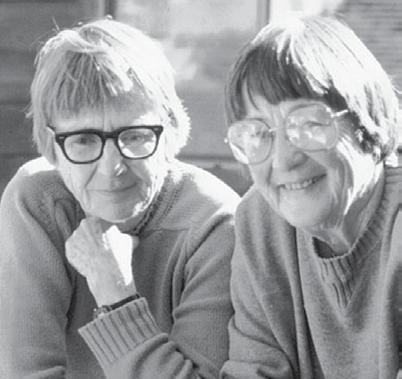

NCLR was the first national LGBTQ legal organization to launch a Transgender Law Project. This project has won many vital cases—including stopping Trump’s cruel Trans Military Ban in 2017—and continues fighting for trans rights including winning injunctions in 2022 against laws criminalizing essential medical care for transgender children in Alabama and banning transgender girls from school sports in Utah. Given the threats posed by the second Trump presidency, this tireless fight continues.
In 2001, NCLR also became the first national LGBTQ organization to tackle homophobia and transphobia in sports with the
(continued on page 5)

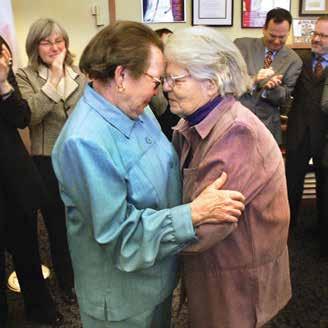
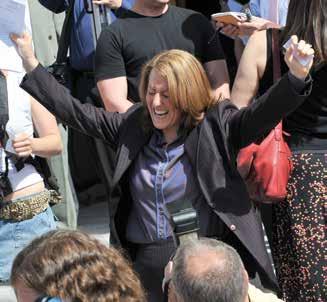
(continued from page 4)
launch of the Sports Project led by long-time LGBTQ sports pioneer Helen Carroll. In 2005, NCLR filed a lawsuit against Penn State on behalf of lesbian players who claimed they were discriminated against by their coach.
2008 - Love Is Love
NCLR’s Legal Director Shannon Minter was lead counsel for several same-sex couples in the landmark California marriage equality case. In 2014, NCLR helped win a lawsuit that allowed the first samesex couples to marry in MiamiDade County, Florida. NCLR went on to litigate marriage equality cases in Alabama, Florida, Idaho, New Mexico, North Dakota, Tennessee, and
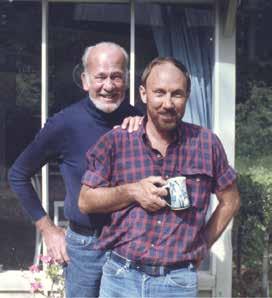

Wyoming. In 2015, NCLR’s Tennessee case was part of the historic U.S. Supreme Court victory that established marriage equality nationwide.
2013 - #BornPerfect
NCLR’s Born Perfect is the first national legal campaign to end the dangerous and discredited practice of conversion therapy. A priority of NCLR’s work since the early 1990s, Born Perfect has worked to ban this deadly practice in more than 20 states and 100+ municipalities in the U.S. In 2022, the Ninth Circuit unanimously upheld Washington state’s law protecting LGBTQ minors from conversion therapy.
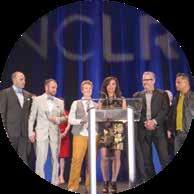
2019–2024 - A New Leader
NCLR embarked on the next chapter in its history by naming Imani RupertGordon as the organization’s Executive Director, succeeding Kate Kendell after 22
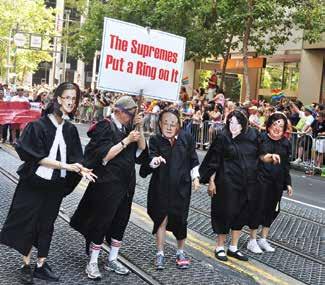
years. RupertGordon’s leadership on LGBTQ justice and its intersection with economic, gender, racial, and disability justice is changing the scope and trajectory of our movement. In September 2022, she was invited to join then Vice President Kamala Harris and other civil rights leaders for a meeting at the White House to stress the urgency to protect reproductive and voting rights.

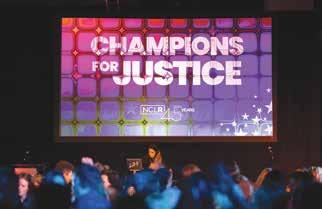
As this brief look at NCLR history reveals, the organization— whose name in June 2025 was changed to the National Center for LGBTQ Rights—has always fought for the basic human rights of all LGBTQ+ community members. With that in mind, check out what your rights are now in a detailed fact sheet prepared by NCLR along with other California LGBTQ+, healthcare, and civil rights advocates: https://bit.ly/43yqsb1
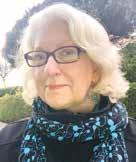
Pride Month is in full swing, with its unique combination of radical joy and fierce political resistance. Each day brings new challenges from the authoritarian administration, from the ridiculous and insulting (seriously, Pete Hegseth, removing Harvey Milk’s name from a navy ship during Pride Month was junior-high-level pettiness) to increasing legal threats toward LGBTQ+ people. And each time, every day, the community shows up with courage, pride, and joy, to say no, you’re not erasing us today. We’re not going anywhere.
The Bay Area is filled with opportunities for celebration. Pride marches are popping up, not just in big cities, but more and more in smaller towns. There are people far better equipped than me to keep you posted on all
the festivities and events going on from City Hall to bars and dance clubs: some of my favorite sources include my fellow Bay Times contributors Donna Sachet and Sister Dana Van Iquity, as well as invaluable e-newsletters from Juanita MORE!, Broke-Ass Stuart, the Office of Transgender Initiatives, and the Leather & LGBTQ Cultural District. There’s something for everyone.
Taking It to the Streets
In addition to Pride celebrations in every city and town in the Bay Area, this month also holds opportunities to add your voice to the growing chorus resisting the authoritarianism that threatens our country and our freedoms, and to show your support for our LGBTQ+ communities. Here are a few to start.

June 14: No Kings! Indivisible, 50501, and many other national resistance organizations are joining forces for No Kings!, a national day of protest on Saturday, June 14. As the current temporary-resident-of-the-White-House celebrates his birthday with a bloated Soviet-style military parade in Washington, D.C., communities across the country will be countering with rallies and marches to make clear that Americans prefer democracy to kings. Be there; you won’t want to miss this one. For
details, and to find an action near you: https://www.nokings.org/
June 22: People’s March & Rally - Pride Week will kick off this year with the sixth-annual People’s March and Rally: Unite to Fight! on Sunday, June 22. Born during both the COVID lockdown and the George Floyd protests in 2020, this grassroots event was created by activists Alex U. Inn and Juanita MORE! to show solidarity with the LGBTQIA+ community, and to bring San Francisco Pride back to its activism roots. Beginning with a rally at the corner of Polk and Washington Streets in San Francisco featuring speakers and entertain-
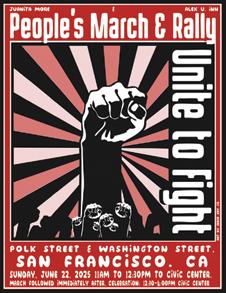
ers, the march will then proceed down Polk Street to Civic Center for a celebration of culture and community with DJs, performers, and artists’ booths from 12:30 to 4 pm. Coincidentally, the route of the People’s March happens to pass by the office of the Consulate General of El Salvador. This will present an opportunity for marchers to raise their voices on behalf of Andry Hernández Romero, the gay man from Venezuela who has been unjustly held in the notorious Cecot prison in El Salvador since midMarch. Join the march and speak out on behalf of Andry.
While proudly political, the People’s March is also a joyful celebration of community. To join the People’s March, or to donate or volunteer: https://tinyurl.com/PMAR25
June 27: Trans March - The San Francisco Trans March is one of the largest trans events in the world. Held the Friday of Pride weekend, the march starts at Dolores Park, and ends at Civic Center. Their website describes the march as “a celebration of trans and gender non-conforming people, and all participants in Trans March are expected to
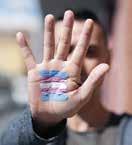
(continued on page 24)
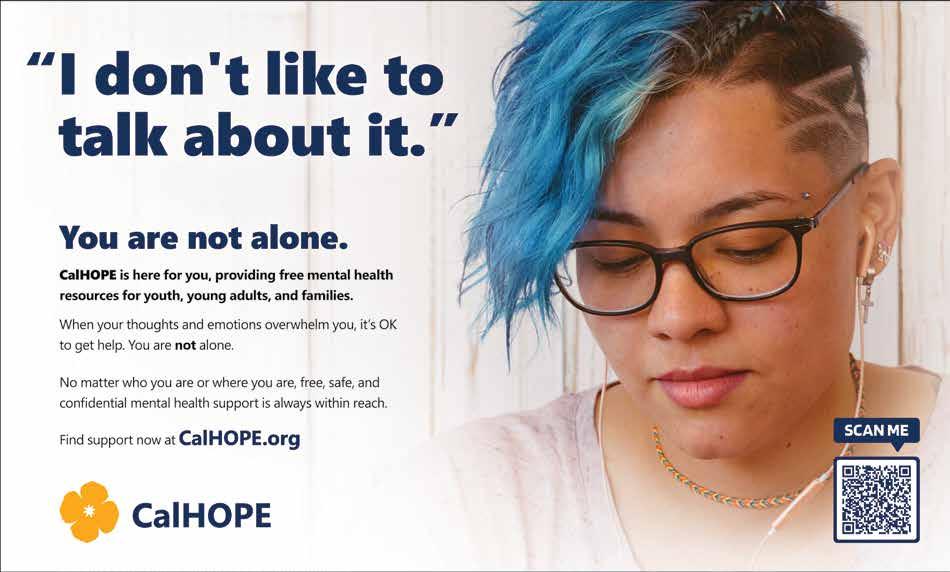

By Suzanne Ford
As we celebrate the 55th anniversary of San Francisco Pride, we do so in a different cultural and corporate environment. Pride organizations throughout the nation are facing the reality that sponsors are backing away—not always with an explanation, and sometimes with little more than a quiet email goodbye.

That’s been our experience at SF Pride too. The past few months have meant difficult discussions, painful compromises, and a constant question: Who’s still going to be with us when it’s not easy or convenient?
Fortunately, we have our answer. And it’s powerful.
Companies such as Alaska Airlines, Kaiser Permanente, and Gilead Sciences haven’t blinked. If anything, they’ve doubled down. They didn’t show up for the photo opportunity or the press release. They showed up for their LGBTQ+ employees, their consumers, and this city. They get that Pride is not a moment for brand—it’s a commitment to uphold equity and visibility, particularly
when both are in peril.
SFO, the airport of San Francisco, was a first-time sponsor this year. And Levi’s came back after two years away, proof that it’s possible for real relationships to be rekindled. Salesforce stepped up its support in the beginning of the year with no publicity or strings attached. These aren’t corporate check writers. These are companies making a statement: that in San Francisco, standing up for LGBTQ+ rights isn’t just doing the right thing; it’s doing business.
We are grateful beyond the boardrooms.
Small businesses such as Hot Cookie, Welcome Castro, and Grace at Lobby Bar didn’t hesitate to pitch in. They don’t want headlines. They’re part of the community. They see us daily. And their kindness, particularly in a down economy, says a lot. In March, when some big businesses suddenly dropped out, we raised the alarm. The subsequent publicity set off a phenomenal response—from individuals donating online to long-time donors who gave more. Two community foundations, the San Francisco Foundation and the St. Francis Foundation, came through with essential funding. We even got calls from individuals who had never donated before but felt they needed to
do something.
That kind of grassroots groundswell reminded us all why Pride has always been of and for the people. But it’s not all rosy.

Some companies still quietly donate behind the scenes—helping financially, but too fearful to appear on our sponsor list. In today’s political climate, even the act of supporting LGBTQ+ communities can attract controversy. I don’t condone that fear, but I do acknowledge it. And while I’ll always advocate for bold, public support, I also understand that change often happens incrementally. A private donation today may be the first step toward public courage tomorrow. What I won’t do is forget who vanished when it counted—or who stepped up anyway.
Let’s be real: this isn’t cancel culture. This is about accountability. This is about recognizing who is genuinely invested in the fabric of this city and who uses Pride as just another marketing checkbox. At SF Pride, we do radical inclusion. That includes leaving space for individuals—and companies—to grow, to reflect, and yes, to return.
But coming back takes more than signing a check. It takes demonstrating that you’ve done the work and that your values align with ours. If a business returns with cleareyed intention and a willingness to make things right by our people, we’ll have that discussion.
In the meantime, we’ll celebrate those who stayed.
They’ve ensured that our celebration goes on with resilience and pride, that our resistance marches with confidence down Market Street, and that our message—of love, visibility, and unapologetic truth—rings out louder than ever.
To every sponsor, supporter, and neighbor who chose solidarity over silence: thank you. You didn’t just support Pride. You stood for something. And in 2025, that’s a powerful thing.
Suzanne Ford is the Executive Director of San Francisco Pride.
Photos courtesy of Joanie Juster and Juan R. Davila
Pink Triangle project founder Patrick Carney, his husband Hossein Carney, and nearly 800 volunteers helped install on Twin Peaks the 30th Pink Triangle, which was officially recognized during a ceremony on June 7, 2025. Among the local leaders attending were Mayor Daniel Lurie, State Senator Scott Wiener, San Francisco Board of Supervisors President Rafael Mandelman, Supervisors Matt Dorsey and Joel Engardio, Treasurer José Cisneros, and others.
“San Francisco is the only city in the world with a giant triangle over its Pride festivities,” Carney said. “It’s a huge reminder and warning of what can happen when hatred can become law.”
He was referring to the prior usage of the symbol by the Nazis, who in the 1930s and 1940s made it central to a concentration camp badge marking LGBTQ+ individuals.
Several members of the San Francisco Bay Times team, including columnists Donna Sachet and Joanie Juster and volunteer coordinator Juan Davila, helped with this year’s installation. Davila literally jumped in celebration during the work, a moment captured by photographer Tâm Vu for the San Francisco Chronicle
The 2025 Pink Triangle consists of 175 pink tarps affixed onto Twin Peaks with 5000 steel spikes that volunteers hammered into the ground. When the work completed, “If I Had a Hammer” was sung while many of the volunteers stood around every part of the dramatic symbol that will be up through Pride Weekend.
Volunteers are now needed for other tasks, including taking down the Pink Triangle. For more information and to sign up to help, go to: https://bit.ly/3HuHKNC
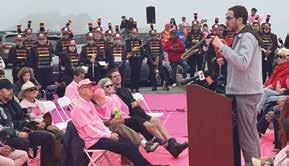
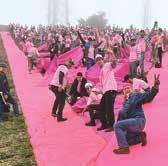

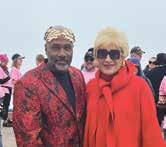
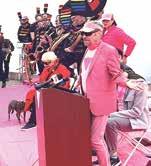
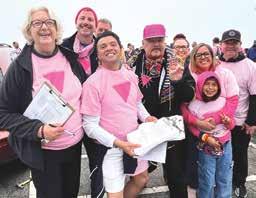

By Dr. Nasser “Nas” Mohamed
This year, I wanted to create something that has a radical sense of celebration—to stage an event that doesn’t just speak of our struggle, but celebrates our beauty, creativity, and resilience. From that vision came Threads of Pride ( https://bit.ly/4mTyoeq ), a fashion show designed to reimagine LGBTQ+ activism as not just protest, but loud, visible, joyful resistance.
As a queer physician and activist, I’m constantly surrounded by the weight of what our communities are facing—fear, instability, attacks on rights and access. The world feels heavy right now, and many of us are tired. But I’ve learned that one of the most effective ways to connect, heal, and move people isn’t always through shouting the loudest. It’s through summoning beauty, joy, and shared humanity.
Why fashion?
Because fashion is political; it’s personal. It’s a language we all speak, whether we realize it or not. Fashion gets people talking in a way that policy briefs never could. When I wear something bold and beautiful, it’s not a look—it’s a message. It invites questions. It starts a dialogue. People pay attention. When I joined the board of San Francisco Pride, I brought that POV with me. We’ve progressed from protest to platform. But I also want to be clear—Threads of Pride is not “instead of” protest. It is my version of protest, my version of defiance, and my version of pushing back.
Enter Threads of Pride.
It’s not just a show; it’s a step toward economic autonomy.
This event is meant to further a vision of queer resistance grounded in brilliance, creativity, and economic power.
Beyond its symbolic possibilities, Threads of


Pride builds bridges, especially to the fashion industry, long celebratory of queerness but rarely structured to uplift LGBTQ+ organizations directly.
For the first time, we’re bringing together designers, including John Varvatos, models, and major fashion houses with a range of local and international LGBTQ+ nonprofits from community health organizations to legal advocacy groups.
Each participating nonprofit will be represented on the runway by color, by story, by presence. Executive directors and social justice leaders will walk, wearing meticulously curated ensembles related to their mission. You’ll see examples such as The San Francisco AIDS Foundation in bold reds, The National Center for Lesbian Rights in rich plums and lavenders, and El/La Para TransLatinas in the soft pastels of the trans flag with bold Latinx hues. Each ensemble is a statement. Each step down the runway is an act of solidarity and an affirmation of civil rights.
But the runway is just the beginning. We are inviting everyone to walk with us ( https://bit.ly/3TgkNAk )—literally and figuratively. QR codes in the show program and at the show will encourage people to help the causes spotlighted by donating, volunteering, sharing a skill, and/or spreading the word.
We’re partnering with All Out to spark an international movement using the hashtag #WALKFORUS, turning this celebration into a global call to action.
This is what queer joyous resistance looks like. It’s beautiful, strategic, and deeply personal.
At the end of the day, I hope people walk away with hope. I want them to leave feeling inspired and reminded that, no matter the


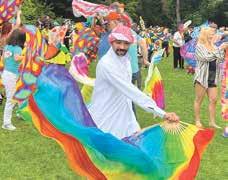
darkness, there is some kind of beauty in fellowship, and that when rights are at risk, we can create spaces that celebrate who we are and push progress further.
This is not a one-off. We aim to make Threads of Pride an annual feature at San Francisco Pride, and an example of how activism, art, and economic self-sufficiency can come together.
We’re already in conversations with national and international outlets, and I’ve been overwhelmed by the generosity of our community. Venue, food, design, and modeling—all have been donated in the service of the collective.
This movement is stitched together with bravery and hue. It’s based on the premise that resistance does not have to be reactive; it can be bright. In that brightness, we construct power.
Join us for the show. Pledge support by signing our petition: https://bit.ly/3TgkNAk Walk with us.
A trailer for Threads of Pride is at: https://bit.ly/3FPdI6N
Dr. Nasser “Nas” Mohamed, M.D., a Board Certified Family Physician at Osra Medical, is a member of the San Francisco Pride Board of Directors.

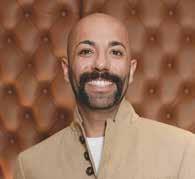


Years ago, when Rainbow Grocery Cooperative first decided to close on Pride Sunday to honor the struggle of LGBTQIA+, a right-wing radio host cold-called the store. Hoping to gotcha whoever answered the phone, the host was surprised when a queer worker told them that the workers of the store had voted on the action. “You aren’t against democracy, are you?” asked our worker/owner.
As a member of a workplace democracy writing this column for the whole cooperative, I think the best way I can honor Pride is to let my coworkers speak about how Rainbow Grocery is important to them and their queer identities.
A lot of my coworkers mentioned the difference between Rainbow and other places where they have worked. Kennedy, an office worker, wrote, “When I was first hired in May 2011, I wanted Saturday off to attend the Dyke March and some of the more senior workers rallied to make sure it was covered. I had only a month and half of employment under my belt but immediately felt the support as a queer person and felt like my identity was validated and valued.”
John, a member of our Cashier Coordinating Committee, says, “One of the things that I was the most excited about when I first started working at Rainbow was knowing that I was going to be working in a safe, supportive environment for queer folks and as a non-binary queer person that’s really important to me because I refuse to work anywhere that doesn’t acknowledge and respect who I am and other members of my community.”
Others mentioned Rainbow openly celebrating Pride and other historically under-recognized holidays, which creates a better atmosphere, not just for workers, but also for everyone who enters the store.
and more friendly. This told me that sometimes it is the people, but many times is the atmosphere and the culture of the place (that matters).”


“The banners during June are important because it communicates to our workers and shoppers that LGBTQIA+ people
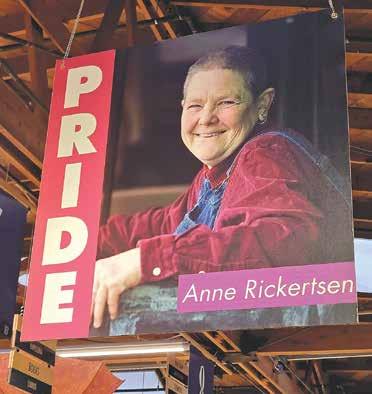
Lastly, in this time of increased attacks on queer, working class, and immigrant communities, the importance of an institution like Rainbow commemorating the need to fight back against those who would try to make us disappear can provide much needed moral support.
“Even San Francisco is not immune to queer phobia, and several months ago I experienced an incident while I was working at Rainbow of harassment (by customers) that was worse than any I’d ever previously experienced in my life,” says John. “I was so grateful to be in a place where, when it happened, my colleagues rallied around me and kept me safe and ejected the hateful bigots. This would not have been the case in other places I have worked at, and having Rainbow in solidarity and closed during Pride is also important because it acknowledges our community and that the fight for equality and freedom is far from over, and that Pride is still a protest!”

“I feel grateful and empowered that Rainbow has allowed me to continuously align my choices with my own personal values on equity, inclusion, and social justice,” says Michelle, who started in January 2024. “I am a queer woman, and both of those things have presented challenges over the years while also giving me a great appreciation for institutions that exist in order to give us back our power.”
Jose, a member of our Storewide Steering Committee, wrote, “In my previous job before I started working at Rainbow, pretty often I felt unsafe and unsupported by my coworkers or the customers. I was working in a deli in the financial district. Almost every day, we had the same customers. Among them there were three who were kind of hostile, demanding, and somewhat unfriendly. When I started working here at Rainbow, I bumped into them and when I rang them up, at different times, they all were nicer

are welcome here. We now have our ‘Protect Trans People’ banner up year-round. During an incredibly scary time, it’s important for us to be loud about our support of Trans people in our community,” points out Kennedy.
Most of all, Rainbow tries to create a living example that the way things are is not the way they have to be. We don’t always succeed, but the moments where it works are beautiful. “As a queer person, since the moment that I started working at Rainbow I felt welcome and safe,” says Jose. “Most of my coworkers and customers have built this community that somehow makes everyone feel supported.”
Gordon Edgar loves cheese and worker co-ops and has been combining these infatuations as the cheese buyer for Rainbow Grocery Cooperative since 1994. He serves on the American Cheese Society Judging and Competition Committee and is a member of the Guilde Internationale des Fromagers. Edgar has written two books on cheese—”Cheesemonger” (2010) and “Cheddar” (2015)—and lives in San Francisco with his adorable white mini schnauzer named Fillmore Grumble. He writes about grief, and sometimes cheese, at https://bit.ly/42IwYf0

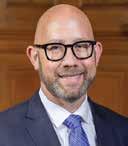
On June 6, 2025, we raised the Pride flag alongside LGBTQ+ community members and leaders across San Francisco and California. While the federal government tries to erase the legacy of San Francisco’s own Harvey Milk, let me be clear: no act of political trolling can erase what Harvey stood for or what this city stands for.
San Francisco will always be a place where LGBTQ+ people are seen, celebrated, and safe. We’ve faced bullies before, and we’re not going anywhere.
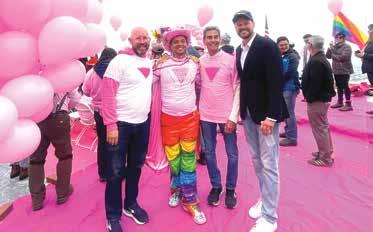
This year, more than ever, it is important to show pride in our ourselves, pride in our communities, and pride in our city. Join me and the District 8 office in the 2025 Pride Parade! Last year we had an incredible turnout and this year promises to be even better. Pets, kids, adults young and old are all welcome to join our contingent!
When: Sunday June 29, 2025 at 10:30 am Where: Exact staging location TBD. The parade will start near the Embarcadero BART Station.

Attire: Festive attire welcome but not required. We’ll have special edition Rafael pride t-shirts for the first 75 attendees. We’d love to have you join us for this year’s Pride Parade. Sign up at: https://bit.ly/4mXWGEo Pride Night Market and the Pride Family Block Party
The Pride Night Market, as part of the Castro Night Market series, will take place on June 20. Each Castro
(continued on page 24)



Assemblymember Catherine Stefani
(Editor’s Note: This issue of the San Francisco Bay Times launches a new column, Catherine’s Corner, by former District 2 Supervisor and current California State Assemblymember Catherine Stefani. Phil Ting, her predecessor in the Assembly, was for many years a columnist for the Bay Times.)
A longtime ally of the LGBTQ+ community, she will in this column address a variety of issues from her perspective at the state level and representing the 19th Assembly District, which encompasses the western neighborhoods of San Francisco and northern San Mateo County.)
Would you trust your tax dollars to a company that uses child labor? Right now, California just might be. That’s why I authored AB 381, which passed out of the State Assembly last week. This bill is a crucial first step toward modernizing our procurement policies and ensuring that California’s government contracts no longer support forced labor in global supply chains.
California spent nearly $19 billion on goods and services in 2022–2023—everything from construction materials and computers
to uniforms and cleaning supplies. But many of these products come with a hidden cost: labor trafficking and forced labor of children and vulnerable workers around the world.
California’s current procurement system is turning a blind eye.
Despite the known risks of forced and child labor in global supply chains, California has not updated its procurement policies since 2007. That means billions in taxpayer dollars could be going to companies that profit from abusive labor practices and potential labor trafficking.
We can no longer afford to look the other way.
With federal enforcement of anti-trafficking protections waning under the current administration, California has a unique opportunity—and responsibility—to step up. Assembly Bill 381 offers a clear path forward by aligning state procurement rules with the federal anti-trafficking standards established in 2016.
These federal standards require contractors to do what should be obvious: take meaningful steps to prevent trafficking and forced labor in their supply chains. That includes creating compliance plans, training employees, and holding subcontractors accountable. If a company fails to take these basic precautions, it shouldn’t get public money—simple as that. By adopting
(continued on page 24)

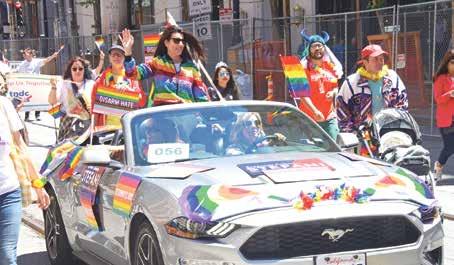
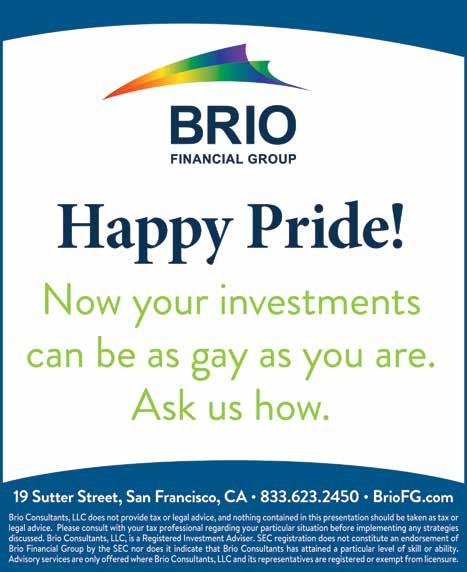



In a world yearning for deeper connection, Juneteenth stands as a beacon of resilience, remembrance, and liberation. It is not merely a historical milestone but an ongoing call to action—a reminder that freedom is something we nurture, protect, and expand through daily acts of love and recognition. The philosophy of Practice Makes Love Easy, with its emphasis on consistent, mindful acts of empathy and kindness, finds a natural counterpart in the legacy of Juneteenth. Both teach us that freedom and love are not passive experiences but require intentional practice, much like music, relationships, and collective healing.
Juneteenth: The Celebration of Resilience
Juneteenth commemorates the day—June 19, 1865—when enslaved people in Texas learned of their emancipation, two and a half years after President Lincoln signed the Emancipation Proclamation. This delay symbolizes not only the cruelty of oppression but also the ongoing struggle for equity, justice, and recognition. Yet, amid pain, the newly freed did not descend into despair. Instead, they built lives, communities, and traditions centered on resilience and love.
From that moment forward, Juneteenth became a yearly celebration of liberation— not just from physical chains, but from injustice, ignorance, and division. It is a reminder that love, when practiced in its purest form, is an act of defiance against oppression. To love openly, to uplift others, and to recognize unsung heroes is to continue the fight for freedom in the most meaningful way. This philosophy aligns seamlessly with Practice Makes Love Easy, as both demand action, intention, and unwavering commitment to human dignity.
Love as the Foundation of Freedom Love is often misunderstood as a fleeting emotion or grand gesture, but in reality, it is built through daily practice. It is found in the small moments—the courage to listen, the patience to understand, the humility to recognize another’s pain. Juneteenth reminds us
that the fight for freedom has always been interwoven with love:
• the love of community that supported the newly freed as they built new lives;
• the love of knowledge as education became a central goal for liberation;
• the love of art and music that preserved culture, stories, and resilience;
Similarly, Practice Makes Love Easy teaches us that love, when nurtured consistently, becomes second nature. It is not an abstract ideal but a learned skill—one that shapes relationships, communities, and social movements. By practicing love daily, we contribute to a world where freedom is not merely granted but deeply felt and upheld.
Recognizing Unsung Heroes:
The Heartbeat of Juneteenth and Love
Juneteenth is a story of collective effort—of individuals who, though often overlooked, played crucial roles in shaping history. From educators who taught literacy to newly freed people to leaders who fought for civil rights, the movement toward justice has always relied on unsung heroes. Similarly, the philosophy of Practice Makes Love Easy emphasizes the power of recognition.
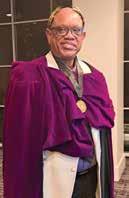
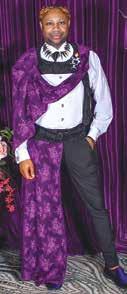
Who are the quiet yet transformative figures in our communities today? San Francisco is blessed to have many community-elected Black monarchs from both the Imperial Council of San Francisco and the Grand Ducal Council of San Francisco who have come together to celebrate, honor, uplift, raise funds, and showcase the 3rd Annual Juneteenth celebration and fundraiser for San Francisco-based nonprofit organization the Rafiki Coalition for Health & Wellness.
The founder of this 3rd annual Juneteenth celebration, Emperor 36 A.N. John Weber— along with Emperor 38 A.N. Stephen Dorsey, Emperor 47 A.N. Terrell Grimes Munro, reigning Emperor Ashlé Blow, A.E. 9 Frieda (deceased), A.E. 18 Connie (deceased), A.E. 52 Mercedez Munro, reigning Empress Afrika America, G.D. 13 Deena Jones, G.D. 40 Kippy Marks, G.D. 42 Aja MonetAshton, G.D. 44 Madd Dogg 20/20, G.D. 47 Scott Rice— and with the assistance of non-Monarch community titleholders: Mr. SF Leather 25 Tracii Ross More, Ms SF Leather 93 Queen Cougar, and committee members

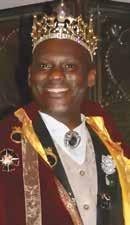
A.E. 53 Cameron Stiehl, Mr. IML 2024 Jamal Herrera-O’Malley, Lance Holman, and Bebe Sweetbriar.
We recognize them and others who are the activists who fight against systemic injustice; the neighbors who foster connection through acts of kindness; and the musicians, artists, and writers who bring healing through their craft.
By acknowledging these individuals—by lifting them up through storytelling, music, and communal celebration—we preserve the very essence of Juneteenth: the belief that every act of love is an act of liberation.

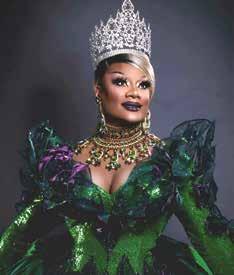

These genres thrive on improvisation, much like Practice Makes Love Easy thrives on adaptability in relationships.
• Improvisation requires listening—so does love.
• Music thrives on collaboration—so does a just society.
• Jazz, with its call-and-response nature, mirrors the way love requires continuous effort and engagement.
As someone who is deeply invested in musical improvisation, I understand that adaptability and creativity are at the core of both music and love. Black American music—jazz, blues, gospel— arose from the history of struggle and the need to express, heal, and resist.
By integrating music into Juneteenth celebrations, we honor those who have used sound as a form of resilience and connection. This 3rd annual Juneteenth celebration will showcase a wide range of talent from some of San Francisco’s exceptional community entertainers. And they, the committee, will also hold the annual Soul Idol Contest, where local individuals compete to receive a $200 prize and the title of Juneteeth Soul Idol 2025. (Yours truly won this prize and title in 2024.) If you would like to showcase your talent, just scan the QR code for your chance to be the next Soul Idol winner.

The Ongoing Practice of Love and Liberation
Juneteenth is not just a history lesson; it is a call to action. It asks us: How are we nurturing freedom today? The answer lies in
(continued on page 15)

(continued from page 14)
the daily practice of love—the small moments where we extend understanding, amplify voices, and challenge injustice. By sharing narratives of resilience and honoring those who practice love daily, we preserve the spirit of Juneteenth. The key is to recognize that love is not just sentiment; it is an ongoing practice that strengthens freedom in every form.
Love as the Bridge Between the Past and the Future
Juneteenth teaches us that liberation is not a one-time event but a continuous journey. Practice Makes Love Easy reminds us that love, too, is a discipline—one that, when nurtured, transforms individuals, communities, and movements. Together, these philosophies create a blueprint for a more compassionate and connected world.
Juneteenth is a powerful lens through which love can be expressed. By practicing love daily, we ensure that freedom is not merely remembered but actively upheld. And in doing so, we create a world where love and justice walk hand in hand.
I am honored, humbled, and inspired by each of these community-elected Black monarchs. Each is a beacon of light, is resilient, practices freedom, and is a spectacular representation of power for our community. They are all Practice Makes Love Easy champions.
Sir Kippy Marks: What does Juneteenth mean to you?
means recognizing and honoring our truth from the past. I remember when I first found out I was Black. I had some feelings of shame that felt horrible, even though I knew that they weren’t my feelings; they were the ones ingrained in me from those I grew up with, and those who adopted me, but not knowing how to deal with them was extremely hard, and I felt alone in that. And today, thanks to this community showing me what it means to be proud of who I am and proud of where I come from, I stand tall and walk side-by-side with some of the most amazing, impactful, and influential Black members of the community, and I’ve never been prouder to be part of it. So yes, I know we are still fighting oppression, but I also know it’s a fight we will win together.
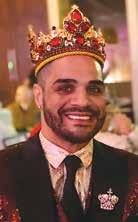
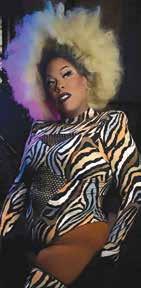
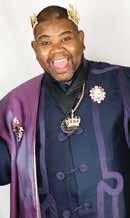
Emperor John Weber: Juneteenth represents the enduring struggle of Black people, particularly those who were enslaved, who have faced countless atrocities throughout history. Despite these injustices—both past and present—we have emerged as a community rich in extraordinary talent and contributions to the United States and beyond. As Black gay individuals, our journey has been even more challenging, confronting profound barriers, yet we continuously rise to the occasion. Our Juneteenth celebration on June 22 embodies this resilience, as many leaders from our BIPOC and Black communities have elevated the San Francisco Bay Area to new heights. I hope that my legacy from this event inspires other Black and BIPOC individuals who follow, reminding them that they are the heirs of those who forged the path before them with the blood, sweat, and tears of our ancestors.
Grand Duke Scott Rice: For me, as a Black elected monarch, and one who grew up with an adopted family who hid that I was Black so that I would never know, being a part of this celebration in this community
Reigning Empress Afrika America: Juneteenth means remembering the struggles and the challenges our ancestors had to overcome for us to be where we are today. Now we are those new ancestors creating change and driving a path of truth and light. We are a force to be reckoned with and to educate the masses.
Tracii Ross More: I firmly believe that my titles carry immense significance. To me, the title “Juneteeth” resonates as a celebration of my people, encompassing both the past, present, and future generations. Moreover, I feel compelled to showcase the diverse manifestations of Black pride from various perspectives.
Reigning Emperor Ashlé Blow: There are 4 words that come to mind when I think about Juneteenth: Representation, Freedom, Ancestors, Courage. We cannot forget our history or we will end up repeating it. We must continue being represented. We must respect the fight of our ancestors. We must be courageous and stand up to opposition. We must remember that freedom is not free.
Grand Duchess 13 Deena Jones: The LGBTQIA+ Juneteenth Celebration makes me reflect on how far People of Color have come in our own community.
Grand Duke 40 Kippy Marks: As the very first ever community-elected Black Grand Duke of San Francisco, I knew representation was to be an inflection point in adding to
the many Black kings, queens, and monarchs of the motherland and place of my birth. I knew that I am a very unique and blessed spirit, and that my gratitude and honor to my ancestors hold great value, and that I hold a tremendous amount of responsibility to the future Black monarchs who would come after. Juneteenth allowed this responsibility to flourish in ways that I did not perceive at first, and through the years and with the coming together of community, I have accomplished more than I ever imagined. I am forever grateful for my ancestors for their endurance, perseverance, and resilience, for I stand on their shoulders and always bring them with me with every step I take. Juneteenth reminds me always to live in gratitude, always to empower those around me, to teach others how to know that each person holds value, and always to practice love so that others may see, feel, learn, and follow in this practice—PMLE (Practice Makes Love Easy).
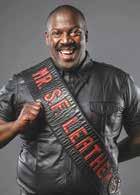
The 3rd annual Juneteenth celebration beneficiary is the Rafiki Coalition for Health & Wellness that has been building a healthier community. Since 1986, Rafiki has been at the forefront of providing health education, housing, advocacy, and essential services to San Francisco’s Black community and other marginalized groups.
Rafiki began as The Black Coalition on AIDS (BCA), a community-based organization founded in response to the devastating impact of HIV/AIDS on Black and African American communities. Our mission was clear: to ensure that Black people received appropriate healthcare services and had a voice in critical policy decisions that directly affected their lives.
As the needs of the community evolved, so did our work. Over the years, BCA expanded its offerings to include a comprehensive range of HIV/AIDS-related services, such as transitional housing, health education, advocacy, case management, and other health-promoting initiatives.

Recognizing the broader health disparities facing San Franciscans with limited access to care, we expanded our focus to serve the general public. In 2015, in alignment with our growing scope and mission, we rebranded as Rafiki Coalition
for Health and Wellness. Today, we are a vital wellness hub committed to breaking down barriers to health and empowering individuals to achieve better physical, mental, and emotional well-being.
We envision a vibrant, healthy San Francisco where health disparities no longer exist, and HIV/AIDS is a disease of the past. We dream of a future where Black and marginalized communities are thriving—educated, empowered, resilient, and engaged—living in unity and health. In this future, life is celebrated, the diverse cultures of the African Diaspora are honored, and every person has access to the resources and support they need to lead a healthy, fulfilling life.
At Rafiki Coalition, our mission is to eliminate health inequities in San Francisco’s Black and marginalized communities through education, advocacy, and the provision of holistic health and wellness services in a culturally affirming environment. We are committed to empowering individuals and communities to achieve optimal health and well-being by addressing the physical, mental, and social factors that impact health.
At Rafiki Coalition, our work is guided by core values that define our approach to health and wellness:
• Cultural Affirmation: We provide a space where Black people feel valued, supported, and respected for who they are.
• Holistic Health: We believe in an integrated approach to wellness, addressing the mind, body, and spirit through whole-person services that promote well-being.
• Community Empowerment: We are dedicated to uplifting and educating our community, providing the tools and support needed to take control of health outcomes and foster resilience.
• Equity and Advocacy: We advocate for systemic change to ensure equitable access to health resources and care for Black and marginalized communities.
• Respect and Dignity: We approach every individual with compassion, honoring their unique experiences and needs while providing quality care and services.
3rd Annual Fundraiser
“Celebrating a Night of Black Excellence” June 22, 2025
4–8 pm
Powerhouse
1347 Folsom Street, San Francisco
https://www.powerhousebar.com/
Video promo at Facebook at: https://bit.ly/4kv640r
Sir Kippy Marks is a spirited solo entertainer whose shows are permeated with an infectious joy. His distinctive sound arises from his heart, through his 1822 violin consort, Izabella. Marks’ rare talent, broad smile, and radiant warmth will brighten any event to create lasting impact. He is also Grand Duke XL of The Grand Ducal Council of San Francisco. He is the first ever elected African-American Grand Duke.

Annette Tracy passed away on Easter Sunday morning, April 20, 2025, surrounded by love. She was a free spirit, with a huge, infectious smile and a big laugh. She was always up for an adventure and brought an unmatched enthusiasm and unfailing support to crazy ideas. Whether it was one of her infamous “Operations” or a bold idea that just might make the world a better place, Annette was all in. Her generous nature benefited so many people— some she knew, and thousands she did not. She was born in Harvey, Illinois, on February 11, 1962. She was the fourth child of the Rev. David Tracy and Harriet Statton Tracy. As the daughter of a minister in the United Methodist Church, she spent her childhood years in the Illinois towns of Mendota, Freeport, and Glencoe. She graduated from New Trier High School in 1982, and later from Northern Illinois University and Benedictine University with advanced studies in education.
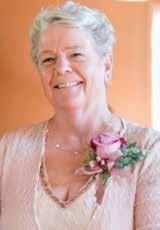
cial administration for Blue Cross Blue Shield and United Healthcare. After retiring from corporate positions, she returned to her beloved field of education working for the Oakland and San Francisco Unified School Districts.
Additionally, she served on the Board of Trustees for the North Shore Methodist Church. She was a volunteer leader for the We Golf for Charity benefit and also the Horizons’ Foundation Women’s Golf Tournament, where she met Anne Sterling Dorman.
In 2017, she and Anne were married. They traveled extensively and lived life to the fullest in the years they had together. She served on the Board of Trustees of Prescott College, where she led in the naming of the Anne Sterling Dorman Center. She also assisted Horizons in naming the Anne Sterling Dorman Extraordinary Service Award. Describing her legacy in leadership and legacy building, she said, “That’s the way we roll in my family.”

She excelled at sports of every kind, but her favorite was basketball. For many years, she was an NCAA referee in women’s basketball. She was passionate about Notre Dame football and the San Francisco Giants.
In 1994, she moved to Northern California where she worked in healthcare IT and finan-

She will always be renowned for a tradition she created called Crabfest. For nearly 30 years each Thanksgiving weekend, she gathered a ridiculously large group of beloveds, made everyone wear paper crab hats, and released a live Dungeness crab back into the waters of San Francisco Bay. In typical Annette fashion, she never really worried much about the fact that the crab may not have originated from said waters. After that, a huge crab feast ensued and lifelong memories were made.
She is survived by her loving wife, Anne, her sister Sharon Tracy (Lance) Garrett, her brother Mark, several nieces and nephews, her aunt Elaine Tracy (aka Aunt Winnie), and several friends in the San Francisco Bay Area and on Chicago’s North Shore. She is preceded in death by her parents and her sister Linda Tracy Wych.
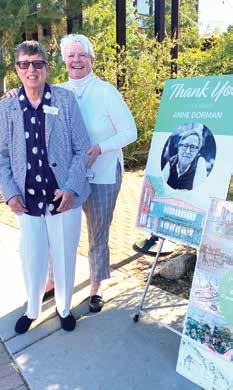

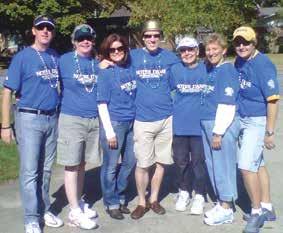

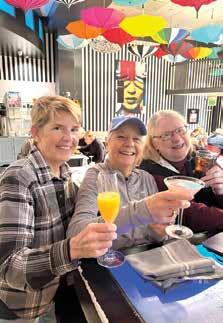
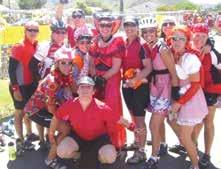
Annette Tracy was a friend of the San Francisco Bay Times team and will always be remembered for the inspiration and support she provided during the final years of her life.
A memorial service is planned for June 14, 2025, at St. Columba Catholic Church, 6401 San Pablo Avenue, Oakland, 11 am–12 pm. A reception will follow at the Lake Chalet, 1520 Lakeside Drive, Oakland.



Roland Schembari and Bill Hartman, Co-Founders
Randy Alfred, Founding News Editor, 1978
Kim Corsaro, Publisher 1981-2011
2261 Market Street, No. 309
SaN FraNciSco ca 94114
PhoNe: 415-601-2113
525 Bellevue aveNue oaklaNd ca 94610
e-Mail: editor@sfbaytimes.com www.sfbaytimes.com
The Bay Times was the first newspaper in California, and among the first in the world, to be jointly and equally produced by lesbians and gay men. We honor our history and the paper’s ability to build and strengthen unity in our community.
The Bay Times is proud to be the first and only LGBTQ newspaper in San Francisco to be named a Legacy Business, recognizing that it is a longstanding, community-serving business that is a valuable cultural asset to the city.
dr. Betty l. SullivaN/JeNNiFer l viegaS
co-PuBliSherS & co-editorS
Beth greeNe, JohN SigNer, Michael delgado deSigN & ProductioN
kate lawS BuS NeSS MaNager
Blake dilloN caleNdar editor
kit keNNedy Poet-iN-reSideNce
J.h herreN techNology director
carla raMoS weB coordiNator
Mario ordoNez diStriButioN
JuaN r davila voluNteer coordiNator
WRITeRS
Rink, Sister Dana Van Iquity, Ann Rostow, Patrick Carney, Leslie Sbrocco, Kate Kendell, Gary M. Kramer, Joanie Juster, Robert Holgate, Eduardo Morales, Dennis McMillan, Tim Seelig, John Chen, Rafael Mandelman, Jewelle Gomez, Phil Ting, Rebecca Kaplan, Philip Ruth, Bill Lipsky, Elisa Quinzi, Liam Mayclem, Beth Schnitzer, Andrew Freeman, Kippy Marks, Donna Sachet, Gary Virginia, Derek Barnes, Marcy Adelman, Jan Wahl, Stuart Gaffney & John Lewis, Brandon Miller, Jamie Leno Zimron, Howard Steiermann, Fernando Camino, Honey Mahogany, David Landis PhOTOgRaPheRS
Rink, Paul Margolis, Bill Wilson, Michael Kirschner, Sandy Morris, Karina Patel, Abby Zimberg, Joanie Juster, Debra Reabock
aDVeRTISINg
Display Advertising Standard Rate Cards http://sfbaytimes.com/ or 415-601-2113
Custom ad sizes are available. Ads are reviewed by the publishers.
National Advertising: Contact Bay Times / San Francisco. Represented by Rivendell Media: 908-232-2021
Circulation is verified by an independent agency. Reprints by permission only.
CaLeNDaR
Submit events for consideration by e-mail to: calendar@sfbaytimes.com
© 2025 Sullivan Communications, Inc



The last AIDS/LifeCycle ride ended on Sunday, June 8, 2025, with this year’s group of cyclists celebrating completing the 545-mil ride from San Francisco to Los Angeles in seven days—and the fact that the 2025 ride has raised at least $17,245,239 to benefit the San Francisco AIDS Foundation and the Los Angeles LGBT Center.
Since its inception in 1994, AIDS LifeCycle brought in over $300 million,
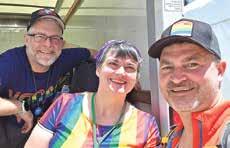
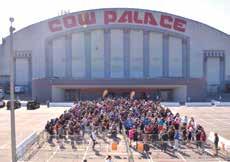
with the funds helping raise awareness about HIV/AIDS, directly benefiting many impacted by the disease, and honoring those who have died of AIDS-related causes.
Terry Asten Bennett of Cliff’s Variety was a longtime Roadie for the event and one of the top fundraisers. She was among the volunteers during the 2025 historic final ride. Over the years she has raised at least $56,000.
“In 1981, I was 7 years old,” Asten Bennet shares at her donation page ( https://bit.ly/449UeTC ). “But unlike most 7-yearolds, I had a front row seat to the beginning of the AIDS epidemic. I was born and raised in the Castro. My family’s business is in the Castro. On a daily basis, we saw young men who were vibrant and healthy a week ago, sick and wasting the next, and then gone. Our friends were dying, our customers were dying, our employees were dying. It was all so fast. With the advancement in research and medications, people with AIDS are living long full lives. I never want to see my community dying around me
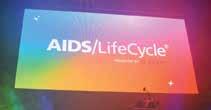
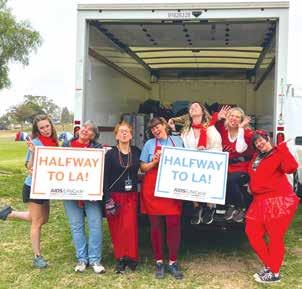
again. This is why I have decided to volunteer my time. I Roadie for my community.” Her sentiments are shared, in part, by the many other Roadies and volunteers, along with cyclists, who made this fundraiser such a success. It will be missed, but a few other cycling fundraisers are being planned for next year. See the May 22, 2025, issue of the San Francisco Bay Times for more information.

Congratulations to everyone who helped make AIDS/LifeCycle such an important fundraiser as well as a life-changing event not only for participants but also for those impacted by HIV/AIDS who have benefited from the money that was raised. Learn more about AIDS/LifeCycle: https://bit.ly/43PjIV8
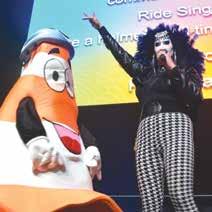
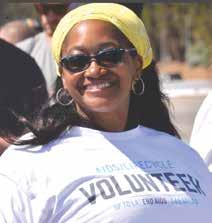
By Ann Rostow
You may have seen headlines recently proclaiming that the Supreme Court sided with a heterosexual woman who claimed she suffered workplace discrimination based on her sexual orientation in violation of Title VII of the Civil Rights Act of 1964. Well, yes and no. The Court said nothing about the woman’s actual claim, which sounds to me like a pity party even though I know next to nothing about the details. (I’m bad! Cue Michael Jackson.) Instead, the unanimous Court ruled that when an employer is accused of discriminating against a majority, like a man or a white staff member, the employer is not required to produce background evidence in its defense. Prior to this opinion, by Justice Jackson, some appellate courts did hold these types of cases to a tougher standard.
The decision is a narrow one, but yet again the justices managed to strike another teeny tiny blow against minority civil rights, making it somewhat easier to complain that, say, Black females get all the good jobs, or gay transwomen make more money. You get the drift. In this case, which will now be tried at a lower court under the new rules, the straight woman wanted a promotion, which went to a lesbian with lesser credentials. Tough luck, sistah!
Legal eagle Chris Geidner, writing in his Law Dork column, noted that Justice Jackson took pains to cite Bostock v Clayton County,
a 6–3 decision written by Justice Gorsuch that effectively added sexual orientation and gender identity to the protections of Title VII back in 2020. Justice Gorsuch wrote that sexual orientation and gender were subsets of “sex,” which is a protected category under Title VII (and many other civil rights laws), leading some of us naive court watchers to believe that our community might now be covered under Title IX and other bans on sex discrimination throughout federal law. We’ve had no such luck, however, as conservative courts have bent over backwards to make distinctions between Bostock and other cases. Yet, we can hope that Jackson’s citations to Bostock in her nine-page unanimous opinion here will add weight to our future arguments. Maybe.
Geidner also made the point that the liberal justices, when assigned the opinions for unanimous decisions, were managing to narrow the reasoning and avoid adding much to bad precedent, even as the conservative side comes out on top. An opinion by Sotomayor in favor of our frequent legal foe, Catholic Charities, for example, emphasized the First Amendment’s dictate that the state may not favor one religion over another. Even as the social services group won the right to avoid Wisconsin’s unemployment taxes, Sotomayor’s comments advanced a neutrality argument on which we all agree—particularly those of us of the Pastafarian faith who follow the Church of the Flying Spaghetti Monster.

We still await the likely horrible ruling on whether Tennessee, and other states, have the constitutional right to outlaw medical treatment for transgender youth. As you no doubt recall from years past, the Court issues all its opinions prior to July 4, usually at the end of June, so we don’t have much longer to wait.
I just reviewed some of my recent columns in search of news about Polish elections. I see here that a right-wing Trump type edged out a moderate candidate in the presidential runoff June 2. Running on an anti-gay platform, Karol Nawrocki outdrew his opponent 50 to 49 percent, leaving the current centrist Prime Minister in a political mess that I can’t untangle without excessive effort. I was particularly confused by the feeling that I had just read that a good guy won this same runoff, but after checking, I realized that a good guy won in Romania last month, not Poland. I’ve been sipping lightly from the Pierian Spring when it comes to Eastern Europe. Again.
Oh, and before we continue, I just read that an expert in baby names is telling parents to stop calling their kids “Olivia” and “Liam,” which have been the number one names for six years running. Really? Six years? How does that happen? “Noah” and “Emma” have been the number two names for six years as well.
What are these parents thinking? These poor kids are going to be “Liam H.,” and “Emma P.,” and “Olivia S.,” all though school. And when they finally get into the workforce, they’ll probably change their names to John, Kate, and Mary in order to stand out from the crowd.
Meanwhile, I was all set to write my column last week when I discovered to my delight that our publication schedule had changed to this week. Yay! I was on a family beach vacation so I tossed aside responsibilities and lounged by the sea. However, I did do quite a bit of research earlier, which is now meaningless because days have gone by and I’ve forgotten the underlying contexts.
My useless notes include: “orange cats,” “Utah report on trans health,” “Pope said something bad back in the day,” and “Which lesbian scent are you Le Labo Santal 33.” That’s just for starters!
Well, it wasn’t too hard to google “Le Labo,” a perfume company based in Grasse and New York, the former, of course, being the famed center of scent in the hills of Provence behind Cannes (or Nice or wherever). SANTAL 33 will set you back $235 for 50 ml, and I’m not sure where the lesbian angle comes into play.
“Imagine sitting in solitude on the rugged, wide plains of the American West, firelight (continued on page 28)

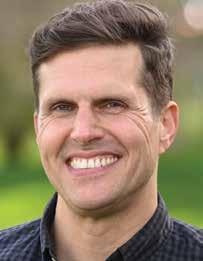
My practice is more than just my work—it’s a calling and a deep commitment to supporting your journey toward emotional well-being.
Specializing in:
• LGBTQ+ affirming therapy
• Couples & relationship counseling
• Depression & anxiety
• Life transitions & identity
In person (San Francisco) & virtual availability
grahamgallivan.com
415.805.2848
LMFT 137223
Schedule a free 15-minute consultation

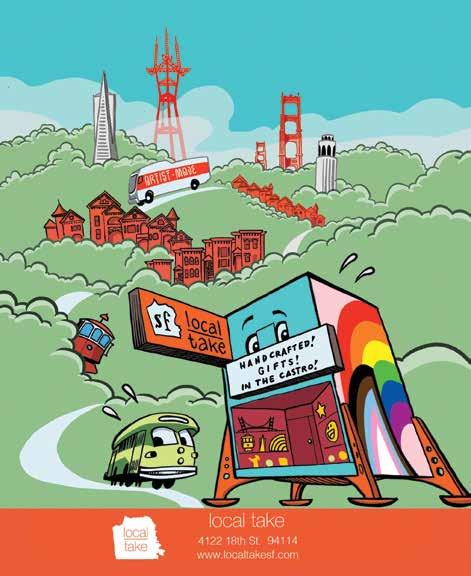

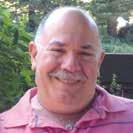
Dr. Bill Lipsky
The scandal began almost the moment the good doctor died on July 25, 1865, at his home in London. Although he had left specific orders to be buried immediately, in the garments he was wearing at the time of his passing and without an autopsy or any traditional preparations, a London housemaid, given the task of preparing the body for transportation, decided to replace his nightclothes with more suitable attire. Her revelation that James Barry’s remains were those of “a perfect female” caused a controversy that still endures.
His personal physician, Major D. R. McKinnon, who certified Barry as male on his death certificate, immediately denied the claim, but deepened the mystery. “It was none of my business whether Dr. Barry was a male or a female,” he wrote, although “I thought it as likely he might be neither, viz. an imperfectly developed man.” But “whether Barry was male, female, or hermaphrodite [intersex] I do not know, nor had I any purpose in making the discovery as I could positively swear to the identity of the body.”
The second child of Mary Anne and Jeremiah Bulkley, Barry was born in Cork, Ireland, in 1789, the year that George Washington became the first president of the United States. Identified as female, she was given the name Margaret Anne. Careers for women then were mostly limited to marriage (although she lacked the social standing to marry well), motherhood, midwifery, domestic service, and harlotry. With some education, she might become
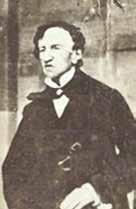


a teacher or a governess. None was to the future doctor’s liking.
When financial misfortune struck the family in 1804, Mrs. Bulkley left Ireland with daughter Margaret Anne to seek help from her brother James Barry, a celebrated artist and professor of painting at London’s Royal Academy; he died in 1806. Three years later, with the help of influential family friends, his niece, and adopting her uncle’s name, Barry was admitted as a man to the medical school of the University of Edinburgh, considered to be the most eminent in the English-speaking world. He was never again seen in public as a woman. Barry began his studies as a “library and medical student,” eventually taking more courses than almost anyone else in his year. Although he was less than five feet tall, had “delicate features,” and spoke in a “high voice,” no one doubted his male gender, at least not openly. Some members of the University Senate tried to stop him from taking his final examinations, but only because they thought he was underage, not because they thought he was anyone other than who he said he was.
(continued on page 28)

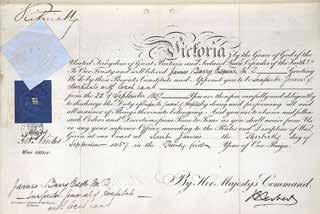

DBy Donna Sachet
o yourself a favor and get tickets now on any Friday or Saturday for Compton’s Cafeteria Riot, an immersive theatrical reenactment of the San Francisco evening when members of the frequently targeted and victimized transgender community rebelled. You’ll arrive at Larkin Street, near to the original location of the event, and step into a retro-styled cafeteria with period photographs on the walls and uniformed waitresses serving breakfast and coffee.
Slowly, you become aware of characters in the play mingling among the diners, exchanging their lines as if in casual conversation. Occasionally, a microphoned drag queen behind the bar guides you through the action as new patrons enter and exit, a belligerent policeman swaggers through, and the cafeteria proprietor tries to maintain peace in this little Tenderloin oasis.
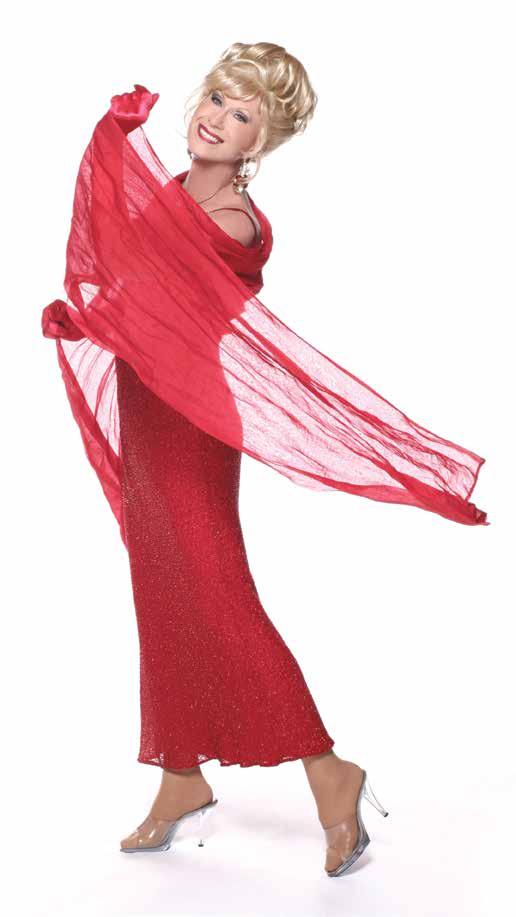
As you chew your bacon and sip your coffee, you sense the tension building. Characters exchange stories of police harassment and social exclusion, family estrangement and drag competitions, as a small group of relentlessly persecuted minority just try to find a way to live life day to day. Finally, the primarily verbal confrontations become physical as the cop pushes a little too hard and the patrons reach their limit and strike back. Bedlam ensues. And all this preceded the Stonewall Riots by three years.
Not enough people know this story and not enough people have witnessed this theatrical experience. Co-written by Collette LeGrande, Donna Personna, and Mark Nassar, directed by Ezra Reaves, and acted by local talents with vigor and conviction, this play brings to life that night in 1966 so vividly. The creative team deserves special credit for so accurately recreating the cafe and ambiance.
Having read Susan Stryker’s well-researched book and seen the documentary film, we wondered what this play could add to our understanding. It is a remarkable piece of theater. Having known some of the characters upon whom the play is based only added to our enjoyment. Whether you have heard of the Compton’s Cafeteria Riot or not, this is an experience that will enrich your understanding of the birth of our modern queer struggle. Go with friends and you’ll discuss it well into the night. Get your tickets today!
Fridays & Saturdays, through July 26
Compton’s Cafeteria Riot
Written by Colette LeGrande, Donna Personna, & Mark Nassar
Immersive theatrical experience 835 Larkin St. 7 pm $75 www.tickettailor.com
Saturday, June 14
5th Annual Wine Fest
The Academy SF, 2166 Market St. 6–9 pm $85 www.academy-sf.com
Sunday, June 15
Broadway Bares SF VIII: Hex Appeal REAF spectacular show 1015 Folsom 7 pm $50 & up www.broadwaybaressf.org
Wednesday, June 18
Frameline Film Festival
Opening Night
Film Jimpa with John Lithgow & Olivia Coleman Toni Rembe Theater, 415 Geary St. 7 pm $33 & up www.frameline.org
Saturday, June 21
AIDS Legal Referral Panel Garden Party Open bar, hors d’oeuvres, auction, hat contest
We were happy to co-emcee with Bobby Friday Pride Renaissance, an ambitious gala fundraiser for Queer Life Space, providing affordable individual, couples, and group therapy to the LGBTQIA+ community in the Bay Area. The Swedish American Hall on Market Street was the setting for a lavish cocktail hour, seated dinner, live auction conducted by Gary Virginia, dazzling entertainment by Mahlae Balenciaga, Oliver Branch, Unicorn Breeding Ground, and Kippy Marks, and various awards and recognitions. This was a new organization on our radar, but this event and its Executive Director, Ryan MacCarrigan, and our friend Moxie Penn made a strong case for its support. The evening ended with a reception next door at The Academy SF. With limited space and so many events to cover, we’ll only touch briefly on these remaining happenings. The San Francisco Business Times’ Business of Pride at the Westin St. Francis Hotel on June 4 showcased vibrant LGBTQ+ businesses and leaders and provided valuable networking opportunities for all. One of our favorite annual events, the rainbow flag raising at City Hall, took place on Friday, June 6, attended by Pride Parade Grand Marshals, SF Pride leadership, city officials, and Reigning Emperor Ashlé Blow and Reigning Empress Afrika America.
Hosted by Donna Sachet Hot Johnnie’s Smokehouse, 4077 18th St. $40 & up www.givebutter.com/garrdenparty25
“The heart of justice is truth telling, seeing ourselves and the world the way it is rather than the way we want it to be.” bell hooks
That night, we joined Emperor Nic Hunter for one of the last performances of Opera Parallele’s Harvey Milk Reimagined at Yerba Buena Center for the Arts. It is an emotionally charged and musi-
Saturday, June 21
SF Gay Men’s Chorus Pride Concert
Artistic Director Jake Stensberg
Special guest Justin Tranter Curran Theatre, 445 Geary Street Chan National Queer Arts Center, 170 Valencia St. 1 & 7:30 pm $61 & up www.sfgmc.org
Tuesday, June 24: Threads of Pride Dr. Nas Mohamed’s fashion event Yerba Buena Center for the Arts, 701 Mission St. 5:30 pm $80 & up www.sfpride.org
Thursday, June 26
Divas & Drinks Bay Times Celebration of Pride and 10th Anniversary of Nationwide Marriage Equality The Academy SF, 2166 Market St. 6 pm $15 www.academy-sf.com
Friday, June 27
SF Opera Pride Concert Host Monet X Change Pre-show with Suzanne Ford, concert, dance party with Juanita MORE! War Memorial Opera House, 301 Van Ness Ave. 6:30 pm $30 & up www.sfopera.com/pride
Saturday June 28 Pride Festival Civic Center Free! www.sfpride.org
Sunday, June 29
SF Pride Parade Market St. Free! www.sfpride.org
cally dramatic recounting of the political life of our local icon. The next morning, we were joined by Emperor Ashlé Blow atop Twin Peaks for the Pink Triangle dedication ceremony, where project organizer Patrick Carney hosted scores of assembly volunteers, the SF Pride Band at its finest, Mayor Daniel Lurie, State Senator Scott Wiener, Assemblyman Matt Haney, City Supervisors Rafael Mandelman, Matt Dorsey, and Joel
(continued on page 24)

Dr. Tim Seelig
Some days you just feel old. It happens from time to time, when you’re old. “What made you feel old today, Tim?” you ask. Thanks for asking. I was doing research for this month’s article and realized this is the 10th year I have penned a June article about Pride for the San Francisco Bay Times. This is my 39th Pride Month since coming out at the ripe young age of 35. Now you know about that old thing.
Normally, I work on an article for a couple of weeks before each deadline. I decided to look back on my ten Pride Month articles. I was going to purposely skip this June. To say this June is a tough one is an understatement. It may well be the most tumultuous of all the 39 Pride Months. I decided it was better to
let others opine about current politics. Then the administration came after our Patron Saint Harvey Milk. It was too much. I couldn’t ignore that. It hits too close to home.
The San Francisco Gay Men’s Chorus was formed in October 1978. It was only one month before Milk was assassinated.
The chorus’ first public performance was at the candlelight vigil. In some ways, the chorus took the baton of activism from his inspiration. It sang for the commemorations of Milk’s death and birthdays every year. In 2013, the 35th anniversary of the assassination, the chorus commissioned a huge choral work, I Am Harvey Milk. We were honored to perform it at the unveiling of the Harvey Milk stamp by the U.S. Postal Service.

In 2016, the chorus received a phone call inviting us to sing for another incredible event honoring Milk. We were invited to perform at the naming of a navy ship for him. We were honored to be there and sing. It was one of the most exciting experiences the chorus has had.
We gathered on Treasure Island with the city skyline as the backdrop. Every dignitary you can

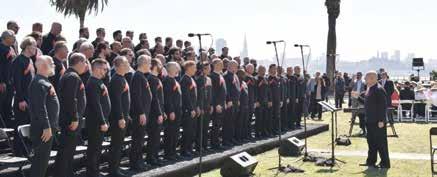
imagine was there including the Secretary of the Navy, Speaker Pelosi, Mayor Lee, and on and on. We sang our hearts out. Having such an inextricable history with Milk and singing for the ship naming made the ridiculous, petty move by the current occupants of the Pentagon even more difficult to swallow. It hit especially hard. We had a part in that incredible moment that is now being ripped out of our LGBTQ+ history.
There is obviously so much more going on that defies logic and human decency. How do you kill diversity? Who knew people would have the audacity to try? But they are. So, that’s how my June is going. Heartbreaking.


Our community is not the only one under assault. My article from 10 years ago was about three immigrants singing in the San Francisco Gay Men’s Chorus. The article was ironically titled, “Sanctuary.” The three were from Columbia, Indonesia and Russia. They each knew living openly gay lives in their country was not possible, and they suffered discrimination, rejection, and even violence before seeking asylum. They found sanctuary in San Francisco and singing in the chorus.
Sound familiar? Here we are, nine years later, and things have only gotten worse. Much worse. The article also announced the new organization in town specifically addressing this issue: The LGBT Asylum Project, which is going strong. I can only imagine what they are experiencing these days. If you are looking for a group to support, please consider them: https://www.lgbtasylumproject.org/
June of 2017 took a much-needed lighter tone: “Pride set to music!” It was a lively romp through the top 35 gay songs up to that point. I worked them into a tragic story! When I began conducting LGBTQ+ choruses in 1987, we had few choices. Thank goodness for Diana Ross and her 1980 hit “I’m Coming Out” and Cyndi Lauper’s “True Colors.”
We wore those out. We had to steal songs and alter the words. For the very first concert by the San Francisco Gay Men’s Chorus, they changed the lyrics of “If They Could See Me Now” to a commentary for the folks back home where they came from. What a difference the next three decades would make. Since 2017,
when I wrote the article, things have exploded. Not only do we have openly queer artists flooding the airwaves, but also the number of allies is astounding. Most of the biggest stars in the world support our fight.
The articles kept coming. In 2019 the title was, “It’s Not OK.” It was a list of things that were not OK. If I were to update that one, it would fill most of the paper. The article in 2021 was about bringing up our baby gays with an important course, “Homosexualization 101.”
Fast forward to 2023. “Pride is a Trigger Word.” Let me explain. When I came out after 35 years of indoctrination by the Southern Baptists, I was very confused. We had been taught that Pride was a bad thing. It wasn’t just bad; it was a sin. In fact, as my fellow recovering evangelicals will attest, we all know that “Pride cometh before a fall.” Then, I began conducting a gay men’s chorus and Pride was suddenly a good thing and it cameth in June, not the fall!
Pastor Natasha Penny from Hope Bible Church preached a sermon titled, “The Fruits of Pride.” It sounded like the perfect theme for a Pride parade float. In the “you can’t make this up” category, the pastor dove even more deeply into the topic; she literally ended by listing the “Fifty Fruits of Pride.” I thought this would be a great name for a choir! She said, “God is not out to hurt your pride; he is out to kill your pride. God hates pride. Pride is the first sin and the most serious sin. Pride is our greatest problem. Not the devil. Not low self-esteem. Not our upbringing or injustices suffered.” Good to know.
I wonder how pride went from the greatest sin to parades? I am certain they are not OK with us stealing one of their favorite sins and turning it into rainbow flags! I have a sneaky feeling our liberal use of the word pride gets under the fundies’ skin. Let’s keep that going.
It was enlightening to go back and read 10 years of June articles. It was also disappointing to read the things that have not improved in our lives and our fight for equal rights. It does inspire us to remember the life of Harvey Milk. He never gave up fighting. He also reminded us to have hope. We’ll try.
Dr. Tim Seelig is the Conductor Laureate of the San Francisco Gay Men’s Chorus. http://www.timseelig.com/
The annual Pride Crawl, presented by lifestyle marketing and public relations firm af&co., happened on June 3, 2025, from 5–8:30 pm. Hosted by Bobby Friday, the Pride Crawl featured some of af&co.’s top-tier clients. Guests sampled foods and beverages from Alora, Acme, Humphry Slocombe, Gott’s, One Market, Proper San Francisco, Saluhall (including the Guava Have Pride cocktail), and closed out the evening at Canela in the Castro.
The Founder of af&co. is Andrew Freeman, who recently wrote for the Bay Times while the Gay Gourmet (David Landis) was recovering from a shoulder surgery. Freeman’s businesses help support a number of Bay Area nonprofits including Dress for Success San Francisco, Meals on Wheels, Foodwise, the San Francisco Food Bank, and the James Beard Foundation’s Taste America series.
https://www.afandco.com/

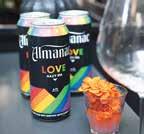
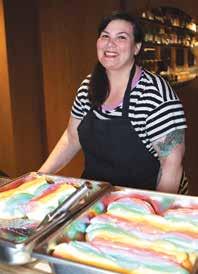
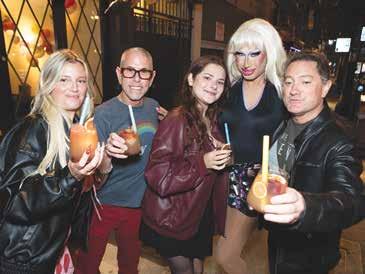

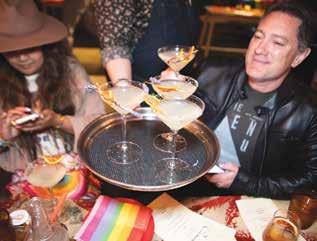
Manny’s, founded by Manny Yekutiel who is also the Executive Director of the Civic Joy Fund, was targeted by vandals following anti-ICE protests on June 9, 2025. The café that additionally serves as a community gathering hub for political and other events had been vandalized earlier in the evening, but individuals returned and broke a large window and spray-painted graffiti all over the front of the space, including antisemitic tags and statements attacking Yekutiel.
Mayor Daniel Lurie stopped by Manny’s on June 10 to console Yekutiel and later, at a press briefing, said, in part: “Vandalizing local businesses with hateful language, damaging
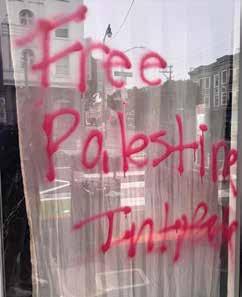

property is unacceptable. When that happens, law enforcement will take action.”
State Senator Scott Wiener posted via social media: “Another major example of antisemitism targeting a Jewish-owned business in the Mission. Manny’s has been targeted for years because the owner is Jewish. And now this vandalism calls for the death of Jews. Antisemitism spans the political spectrum. And it’s always toxic & dangerous. It leads directly to violence against Jews. It has to stop.”
Manny’s has remained open as the space is repaired.
https://welcometomannys.com/
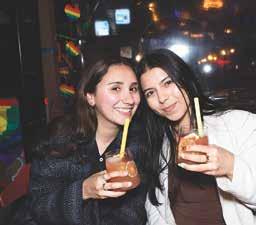
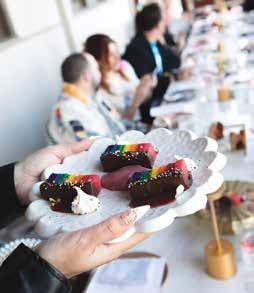


3rd Fridays (select months), 5-10pm, 18th & Castro 2025 Dates: July 18 & September 19
The Castro Night Markets, which began in October 2024, is a series of recurring public events featuring local food vendors, merchants, and live entertainment on the 3rd Friday of select months. The event is free and open to the public, and is a non-alcoholic event.
Vendor Information: castronightmarket@cgevents.com
Queen-owned and Castro-based businesses have priority to be included among the various types of vendors: food, retail, non-profit information, community engagement and more.
NCLR has filed four lawsuits challenging discriminatory and unconstitutional executive orders, and we are preparing for additional litigation.”
Minter added, “I have devoted my more than 30-year legal career to working at NCLR, an organization committed to putting the community first, supporting LGBTQ people and their families, and using the power of the courts to fight for a better and more just world. I am excited that our new name captures and expands that spirit and vision.”
While the mission is not changing, the newly renamed organization is excited to bring forward new and innovative ways to honor their history, and the feminist approach to justice they are so proud of to a bigger audience.
JUSTER (continued from pg 6)
embrace and respect this diversity.” Chosen family and allies are welcome to join the march, and considering everything the government is doing now to literally erase trans people from society, let’s all show our support and make this the biggest, proudest, most unforgettable Trans March ever. https://www.transmarch.org/
June 28: Dyke March - The San Francisco Dyke March is holding its 33rd year of celebrating dyke identities and honoring the civil rights struggles they have endured, as well as those that still lie ahead. They proudly hold the Dyke March as a self-identified dyke-only space, and to that end, their website makes their wishes very clear: “We love our allies. But if you want to be a real ally, step aside.” Instead, allies are encouraged to rally with them in Dolores Park, and to support and cheer from the sidelines during the march. https://www.thedykemarch.org/
Bonus Events in Brief
Castro Street has a new landmark, thanks to the vision and hard work of artist Harry Breaux. Check out the Intersex Pride flag he has painted at
LGBTQ people are in the fight for our lives right now, watching as so much progress is being questioned and challenged. But NCLR isn’t going anywhere. NCLR and its movement partners are working tirelessly to fight back—in the courts and in the streets.
This moment is calling all to act, to be brave and resilient, and to dig into our collective history of resistance, our expertise in building community and family from the ground up, and for doing it all with boundless queer joy. The National Center for LGBTQ Rights is meeting this moment, and cannot wait to bring you along!
https://www.nclrights.org/
Jane Warner Plaza (17th & Castro). It is visible throughout the world thanks to the Bay Times’ Castro Street Cam: https://tinyurl.com/CStCam25
The Pink Triangle on Twin Peaks is particularly meaningful this year, as the government steps up its attacks on LGBTQ+ people. Huge thanks to Patrick Carney and his team for mounting this powerful reminder of man’s inhumanity to man— and how we all need to guard against that happening again. For info, or to volunteer: https://thepinktriangle.com/
A Word About Safety
All the events listed here, and many others, have been successful to date because they are centered on the principles of non-violence, inclusivity, and peaceful resolution of conflicts. When joining public events, particularly protests, please stay peaceful, stay safe, and stay aware of your surroundings. Do not engage with counter-protesters or agitators. Take care of yourself and your companions. See you in the streets!
Joanie Juster is a long-time community volunteer, activist, and ally.
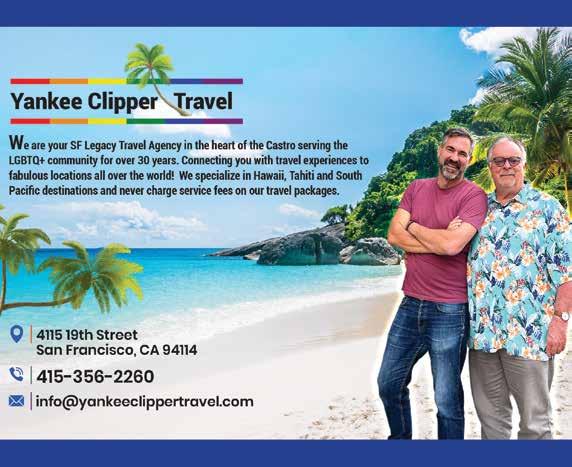
MANDELMAN (continued from pg 12)
Night Market features local food vendors, merchants, and live entertainment.
The Pride Family Block Party will be on June 28. Join the Castro Merchants for this vibrant celebration of Pride and community at Noe and Market streets from 12–5 pm. Learn more at: https://bit.ly/45NRSLr
Rafael Mandelman is the San Francisco District 8 Supervisor and the President of the San Francisco Board of Supervisors. https://bit.ly/4iQvwvY
STEFANI (continued from pg 13)
these measures, AB 381 ensures that California’s purchasing power supports ethical business practices, not exploitation.
AB 381 doesn’t ask California to invent a new system—it simply asks us to catch up. These federal standards have been on the books for nearly a decade. It’s time we bring that same level of accountability and transparency to our state contracts. Updating these policies now is also crucial as federal oversight and leadership around national and global worker protections can be expected to wane under the current administration.
California has already shown it can lead the way in tackling complex global problems—from climate change to digital privacy. We are the fourth-largest economy in the world. When we update our procurement policies to reflect 21st Century realities, we send a powerful message: forced labor is unacceptable, and responsibility is non-negotiable.
This is not just a moral issue. It’s a matter of good governance and smart economics. Human trafficking undercuts legitimate businesses, destabilizes communities, and fuels a global criminal economy. We shouldn’t be subsidizing that with public contracts.
This bill is a crucial step toward a future where California’s economic strength is matched by its ethical leadership. With AB 381, we have the chance to ensure that our tax dollars uphold the values we claim to stand for: dignity, fairness, and human rights.
Let’s not waste that opportunity.
Assemblymember Catherine Stefani represents California’s 19th Assembly District, which includes the west side of San Francisco and northern San Mateo County. With a background as a prosecutor, policy analyst, and San Francisco Supervisor, she has long been a champion for public safety, affordable healthcare access, and government accountability. Stefani founded the San Francisco chapter of Moms Demand Action and has been a steadfast advocate for gun violence prevention and support for survivors of domestic violence.
Engardio, Treasurer José Cisneros, Assessor-Recorder Joaquin Torres, and many others.
Later that day, many enjoyed the SF Giants Pride Day with Jason Brock singing the National Anthem and many of our friends providing entertainment segments captured on the Jumbotron, followed by a Victory Party, hosted by Gary Virginia, at Moby Dick. And on Sunday afternoon, with the last bit of energy and creative wit we had, we headlined Sunday’s a Drag, a Pride Party at the beautiful new Starlite at the Beacon Grand Hotel in Union Square. Fellow performers Holotta Tymes, Nicki Jizz, and Evian gave the crowd a spectacular show that would have made our dear friends Harry Denton and Michael Pagan proud.
Yes, it’s been quite a whirlwind of activities, but what does one expect in June? Get ready for the many remaining Pride-themed events, many of which, but not all, are listed in our calendar section. And whether you dash headlong into this Pride season or simply enjoy our hard-fought successes in more private and personal ways, please hold your head high, speak with confidence, and embody SF Pride’s theme: Queer Joy is Resistance. Happy Pride, everyone!
Donna Sachet is a celebrated performer, fundraiser, activist, and philanthropist who has dedicated over two decades to the LGBTQ Community in San Francisco. Contact her at empsachet@gmail.com
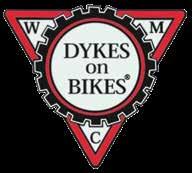
San Francisco Dykes on Bikes® kicked off Pride Month 2025 with a thunder! On May 31, we had the honor of leading the Sonoma County Pride Parade in downtown Santa Rosa. It was a fantastic parade filled with all of the love and pride for the LGBTQ+ community. After a brief break from the heat, we spent a fantastic evening at Pride Night with the Sonoma Stompers collegiate baseball team. The next day, we rolled into the Clayton Pride Parade, embracing our love for Pride parades big and small.
Each moment was special, but I was especially moved during the Stompers game, where I was invited to share the history of
By Kate Brown, Ph.D.
Dykes on Bikes and our mission to support philanthropic endeavors in the LGBTQ and women’s riding communities with the crowd and then threw out the first pitch. We had a warm, joyful welcome from all the fans in the stands and played some fun games on the field. A heartfelt highlight came when longtime Stompers fan Pat sent over Cracker Jacks and shared that her daughter rode with the Dykes who moved to the front of the parade in 1976— a beautiful reminder of the legacy we continue to build on today. A heartfelt thank you to “Hey Trey,” Director of Entertainment for the Stompers, for the invitation and we look forward to joining you again next year!
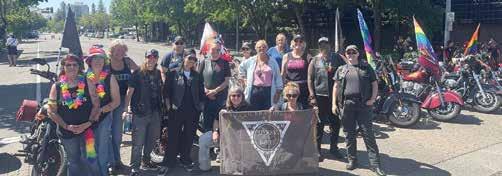
we were thrilled to be the beneficiary of the Mimosa party at Catch French Bistro hosted by the San Francisco Bay Times. Then on June 15, we ride with pride in the Sacramento Pride Parade.
We’re just getting started! Pride Month is packed with more celebrations. On June 8,
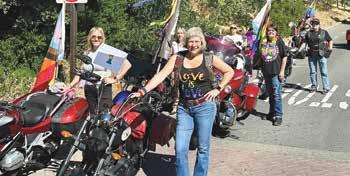
And, of course, we invite everyone to our annual Pride Saturday Fundraiser at The Academy SF (2166 Market Street) on June 28 from 12:30–3:30 pm. Join us for music from DJ Rockaway, auction prizes, and community celebration. It’s the perfect place to pick up your limited-edition Dykes on Bikes® merchandise and register to ride with us at the San Francisco Pride Parade. Speaking of which—don’t forget to sign up to ride with us as we lead the annual San Francisco Pride Parade on June 29 for the 49th year! You can register at https://bit.ly/43ymGP0

Whether you’re a seasoned rider or a firsttime participant, we welcome you to be part of this iconic tradition. Let’s make this Pride Month one to remember. Ride loud, ride proud.
Kate Brown, Ph.D., is the President of San Francisco Dykes on Bikes® Women’s Motorcycle Contingent. https://www.dykesonbikes.org/

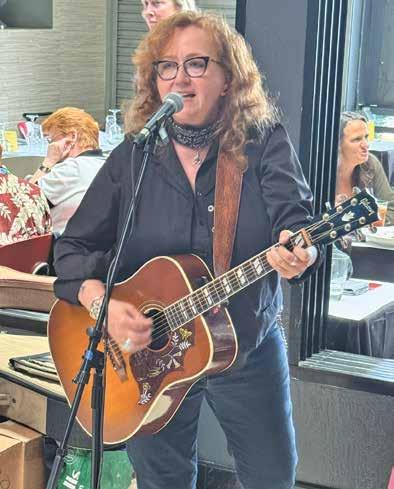
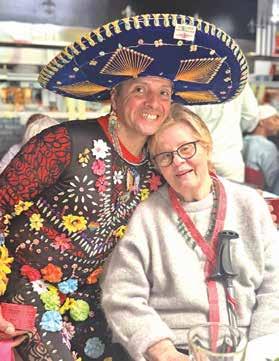

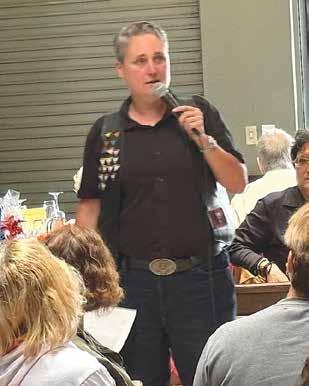
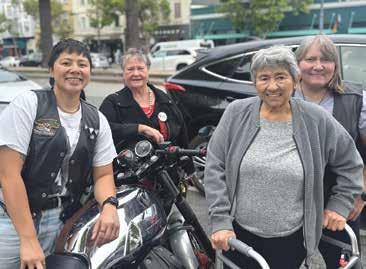
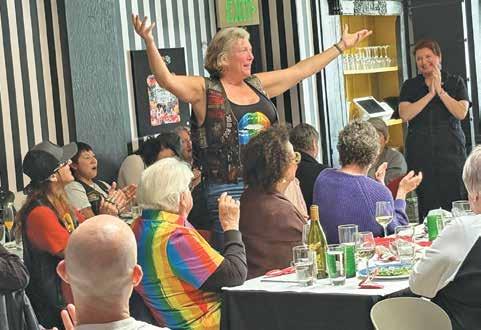
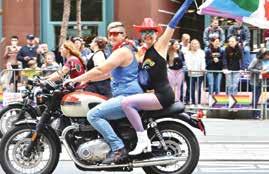

Women from throughout the Bay Area converged on Catch French Bistro on Sunday, June 8, to enjoy brunch, live music, cocktails, and outstanding camaraderie as the San Francisco Bay Times’ Mimosa Brunch for Pride Month celebrated Dykes on Bikes® Women’s Motorcycle Contingent.
Sponsors for the event, benefiting the Dykes on Bikes® were legal entities Boone Callaway, specializing in personal injury law, and Procopio, Cory, Hargreaves & Savitch LLp with offices in entertainment industry hubs such as Los Angeles, Las Vegas, San Jose, and others.
Brooke Oliver, a senior counsel from Procopio who is a nationally recognized arts and entertainment attorney, spoke about her work on behalf of the Dykes on Bikes® organization, arguing their trademark cases before the U.S. Supreme Court twice and securing historic wins.
Dykes on Bikes® President Kate Brown and San Francisco Pride Executive Director Suzanne Ford led a lively round of live auctions and raffle presentations that included contributions from the woman-owned Castro-based businesses For Your Eyes Only optometry and Local Take gift shop. Additional prizes were contributed by SoulCycle Castro, the Fresh Meat Festival/Sean Dorsey Dance, Grubstake Restaurant, Broadway Under the Stars, the Rossmore Lesbian Social Group, members of the Dykes on Bikes, and others.
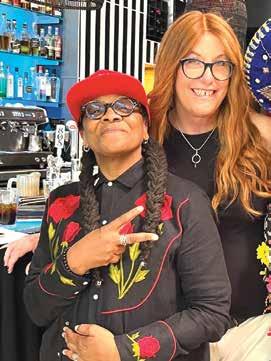
Catch’s resident musician Dr. Dee Spencer tickled the keys on “The Red Piano” during the brunch and served as music director for the Open Mic session that fol-
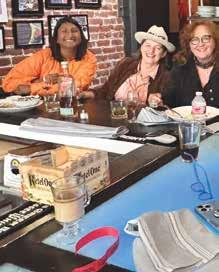


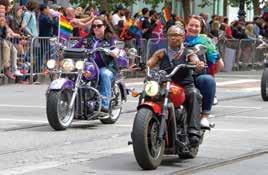
lowed. Among the performers taking the microphone was Marina Garza, trumpeter and well-known member of the Shake It Booty Band. She was the first up and delighted listeners performing solos while stopping intermittently to tell amusing jokes.
Activist Alex U. Inn, who soon will be co-leading the People’s March in San Francisco, stopped by after her address earlier in the day at MCC San Francisco. She introduced singer Ariel Bowser, who performed a beautiful version of the Cyndi Lauper hit, “Time After Time.”
Also performing were East Bay-based folk singer Carrie Gerendasy (known for her lightning-fast flat picking guitar work), and South Bay-based singer/songwriter Karen Soo Hoo, who also helped with introductions and more. Singer/ songwriter/musician Katharine Cole, who left the Bay Area to live in Atlanta but now resides in Ukiah, made a special return to San Francisco with her musician partner Yvonne for a performance that closed the program and got guests on their feet to dance and applaud. Yvonne is a drummer, and pulled out a tambourine that added to the memorable set. (Watch for videos soon at the San Francisco Bay Times website: https://sfbaytimes.com/ )
Throughout the benefit, photo sessions with Dykes on Bikes members were organized by professional photographer Debra Reabock ( https://www.debrareabock.com/ ).
Special thanks to all volunteers and supporters, including Reabok, Linda Phillips, Steve Scheitliin, Susan Berston, and Juan R. Davila.
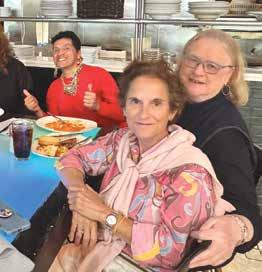

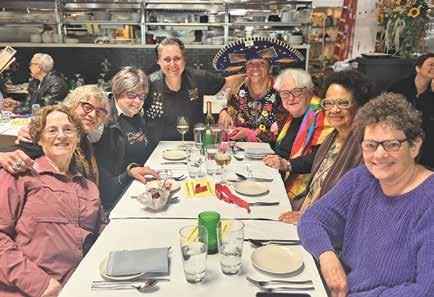

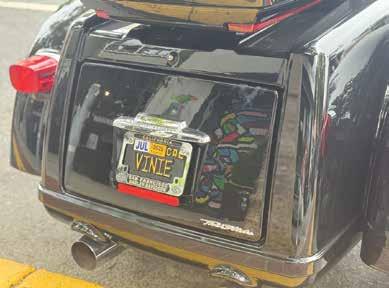
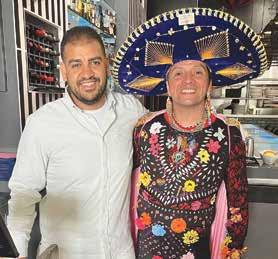
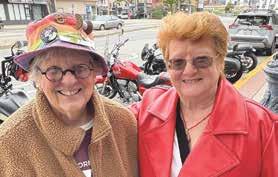
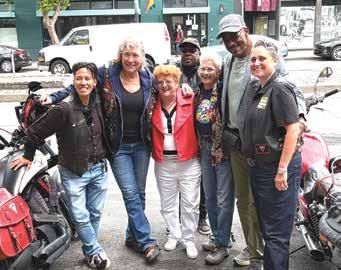
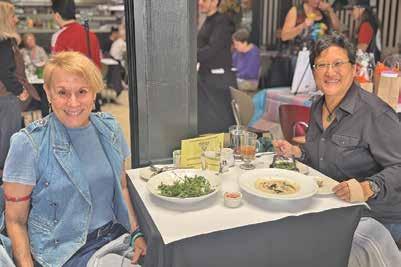

on your face, indigo-blue night skies above,” a marketing pitch suggests. “There is nothing around save for the soft, desert wind. You. Are. Free.”
This image, we learn, was the inspiration for SANTAL 33, “a perfume that touches the vast and wild universality of this dream ... that intoxicates.” SANTAL 33 is “an open fire ... . The soft drift of smoke ... . Where sensuality rises after the light has gone.”
Hey, I’m sold! A manifesto under the “About Us” rubric contains a dozen or so beliefs, ending with, “We believe that we are only young once, but we can be immature forever,” and, “We believe that explanation kills art. Therefore, forget about all of this!” I’m a big fan of both notions.
As for the Pope, I’m skipping this item, and if I’m not mistaken, the orange cats have an unusual genetic makeup that gives them their color. Surely that’s true of all cats, both common and rare, but I think I had the idea that I’d use the orange cats as a springboard to a discussion of, what? Transgender girls? Middle-aged gay men? I can’t recall.
On June 3, D.C. Judge Royce Lamberth, the last active Reagan nominee on the federal bench, ruled in favor of transgender inmates who seek to maintain their hormones and other healthcare while in federal prison. Judge Lamberth certified over 1,000 inmates in the class action suit that challenges Trump’s anti-trans executive orders on constitutional and other grounds. The suit argues that the sudden denial of medication and care violates the Eighth Amendment’s ban on cruel and unusual punishment. But before reaching the Eighth Amendment claim, Judge Lamberth agreed that discontinuing treatment likely breached the Administrative Procedure Act.
track of book bans, drag show prohibitions, sports bans, bathroom laws, and attacks on health. I know the High Court just allowed the military to oust transgender soldiers, heroes who have stood ready to die for the United States and who are now rewarded with disdainful dismissal.
And I’m sure you saw that the Trump Defense Department is planning to rename the USS Harvey Milk, removing the honor from the nation’s first openly gay elected politician, a Korean War veteran who volunteered for the Navy, and was booted in 1955 for being gay. Milk was assassinated in his office in 1978.
Shameful.
Meow
arostow@aol.com ROSTOW (continued from
public education including student clubs that offend the powers that be. Writing in The Houston Chronicle, law professor Dale Carpenter noted that forcing LGBT clubs to close would be a flat violation of the First Amendment, and would also be illegal under the Equal Access Act, which protects student clubs against viewpoint discrimination. The Chronicle paywall snapped into place and severed my connection to the handsome professor, but not before I got the gist of his remarks.
Let me just say that this is not the Texas envisioned by the makers of SANTAL 33.
As for Utah, I guess Republican lawmakers arranged for a study on transgender youth healthcare, which was designed to guide future policy. The 1,000-page study of thousands of transgender people was organized in 2023, and was just published by Utah’s Department of Health and Human Services. It concluded that gender care produced “positive mental health and psychosocial functioning outcomes.” Ooops. That’s not what the representatives wanted to hear.
The Act forbids the Bureau of Prisons from “arbitrarily [depriving] inmates of medications or other lifestyle accommodations that its own medical staff have deemed to be medically appropriate without considering the implications of that decision,” Lamberth wrote. As such, the judge concluded, the plaintiffs were likely to win their challenge and the Bureau of Prisons was enjoined from fussing with everyone’s drugs until after the underlying litigation was concluded.
I have long since lost track of the number of transgender civil rights cases now in the courts, the status of these cases, the specific challenges or rights at stake, and the preliminary injunctions either granted or not. I have lost track of the number of anti-transgender state laws under consideration around the country, although I think there are around 600 such proposals, and maybe 50 or more have even enacted. I’ve lost
Barry graduated as a Medicinae Doctor in 1812 and was certified by the Royal College of Surgeons of England in 1813. He accepted a commission as a Hospital Assistant in the British Army soon after. Two years later, he was made an Assistant Surgeon to the Forces and assigned to the garrison at Cape Town, South Africa. During his 12 years there, he not only established new standards of health care, but he also demanded all patients be treated equally, regardless of their race, social standing, or affliction.
At Cape Town, Barry became a dear personal friend of the colony’s governor, Charles, Lord Somerset, who appointed him Colonial Medical Inspector in 1822. Their closeness eventually led to rumors that they were intimate in all ways, when same-sex intimacy was illegal everywhere in the British Empire. An investigation, which cleared both men of any wrongdoing, could have been avoided had Somerset, who may or may not have known the doctor’s birth gender, simply stated publicly that Barry was female. He never did.
Barry was recognized for his achievements with praise and promotions. He was particularly proud that he “had the thanks of the Duke of Wellington” for his work on Malta during a cholera epidemic, where he was Principal Medical Officer from 1846–1851. His efforts during the Crimean War (1854–1856) earned him commendation from Edmund, Lord Lyons, then commander-in-chief of the Mediterranean Fleet, for his “zeal and services” on board the HMS Modeste, a Royal Navy corvette, and for his
I read the other day that a GOP state legislator in Texas has proposed a bill making it illegal to supply cat litter to public school kids, as if that’s a thing. But there’s more! The F.U.R.R.I.E.S. (Forbidding Unlawful Representation of Roleplaying in Education) Act bans “non-human behavior,” including “barking, meowing, wearing a leash, licking oneself or others for the purpose of grooming, and wearing a fur suit or anything else that is inconsistent with behaviors or accessories typically displayed by a member of the Homo sapiens species.” The idea is based on the nonsensical theory that some schools allow kids to pretend to be animals and cater to their stated “identities” by providing pet products. It’s not clear where this originated, and obviously it’s been repeatedly debunked. And yet here we are.
There is also a pending bill in the Lone Star State that simply gets rid of anything DEI in
“successful treatment of the sick and the purification of the ship.”
For all he accomplished during the Crimean War, Barry was promoted “By Her Majesty’s Command” to the position of Inspector General of Hospitals, his certificate of appointment signed by the queen herself. Then the second-highest medical office in the British Army and equivalent in rank to a brigadier general, Barry was appointed to oversee all military hospitals in Canada, his last assignment. He also received “a magnificent diamond ring from the Archduke Maximilian,” later proclaimed as Emperor of Mexico, “for services to one of His Imperial Highness’ crew.”
Not everyone was enamored with the good doctor and the way he practiced medicine. In an article published in All the Year Round, a British weekly literary magazine founded and owned by Charles Dickens, an anonymous observer wrote in 1867, “When first called in to a patient, ‘he would have the room cleared of everything previously prescribed ... . ‘ If the patient recovered, Doctor James had all the merit; if death ensued, ‘Doctor James had unfortunately been summoned when the case was hopeless.’”
Barry also made powerful enemies because of his sometimes-caustic personality. Florence Nightingale, acknowledged as the founder of modern nursing, wrote of a confrontation they had during the Crimean War. “I never had such a blackguard rating in all my life—I who have had more than any woman.” The doctor “kept me standing
And finally, while we’re on the subject of outrageous, illegal, nasty posturing by smalldicked Republican men, the attorney general of Florida, James Uthmeier, has strongarmed a private fitness club, Life Time, into banning transgender women from its locker rooms in Palm Beach, even though anti-trans state bathroom laws only apply to public facilities. At first, the gym stuck to its guns, but after a few days, the company reversed itself when it seemed clear that Uthmeier was willing to drain the situation for publicity. The gym became a target after a woman, Sonja Horton, claimed she saw a man in the locker room and did not feel safe.
I couldn’t dig up any more information on Sonja’s revelation, but the last time I saw a story like this, the “man” was a transwoman who had transitioned with surgery over a decade earlier. She was a regular at the pool, where some young girl saw her backside naked, had a conniption, and went crying to the press. I’m not sure what exactly Sonja did or did not see, and I’ll just leave it at that.
in the midst of quite a crowd of soldiers...during the scolding I received, while [he] behaved like a brute... . [He] was the most hardened creature I ever met.”
Across his 50 years in the army, Barry had an influence on the development of modern military medicine that was significant. He reformed medical practice; introduced new surgical techniques (in 1826, he performed possibly the first successful caesarean section, saving both mother and child at a time when the procedure was invariably fatal for the mother); improved hygiene; and advocated for a healthier diet and better living conditions for soldiers, prisoners, and enslaved people wherever he was stationed, from South Africa to posts in the Mediterranean and the Caribbean. He saved thousands of lives.
Was Barry a woman posing as a man to have a career that society then denied to women? An individual born with the physical attributes of both sexes? A man whose gender was misidentified at birth? Surviving documents support all three possibilities, but none of that really matters. For his entire adult life, publicly, professionally and privately, Barry gave his word to one and all that he was a man. As the world’s leading expert about himself, let us take him at his word.
Bill Lipsky, Ph.D., author of “LGBTQ+ Trailblazers of San Francisco” (2023) and “Gay and Lesbian San Francisco” (2006), is a member of the Rainbow Honor Walk board of directors.
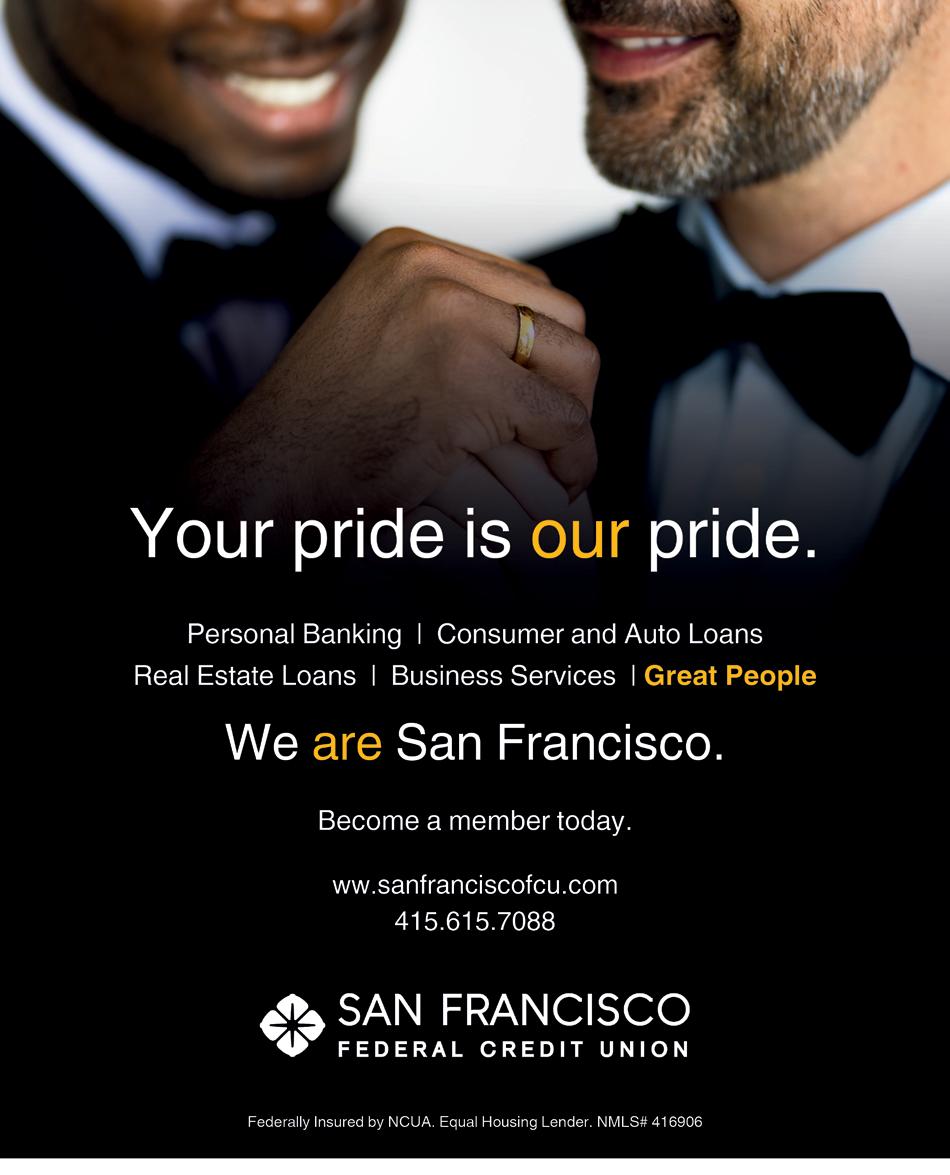
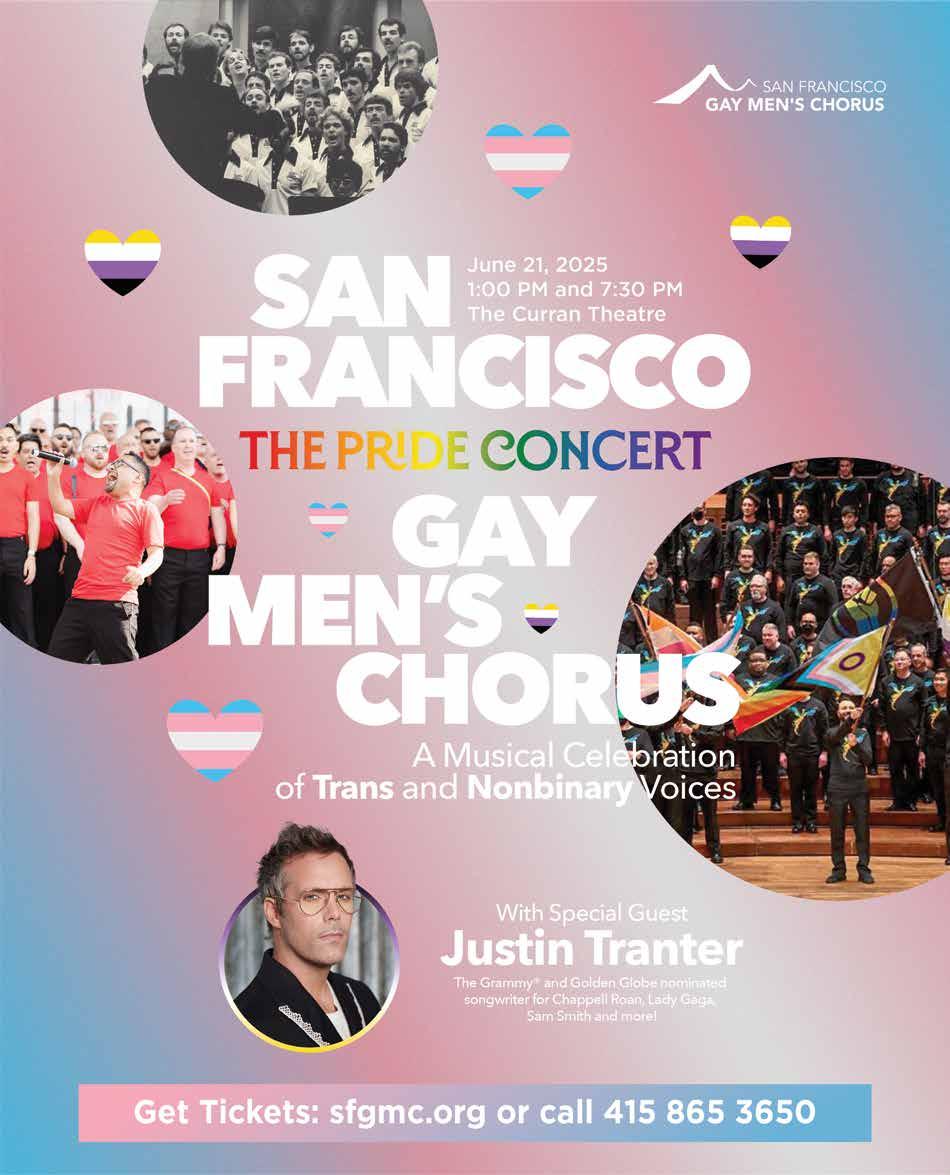

This year’s Frameline Film Festival opens June 18, 2025, with Jimpa , which has non-binary teen, Frances (Aud MasonHyde), wanting to live with their gay grandfather Jimpa (John Lithgow) in Amsterdam—much to the chagrin of their mother (Olivia Colman). The festival closes June 28 with Twinless, James Sweeny’s drama about the gay Dennis (Sweeney) who befriends the straight Roman (Dylan O’Brien) at a meeting for people who have lost their twins. In between, the festival offers more than 100 features, shorts, and documentaries by, for, and about LGTBQ+ lives.
Several films have local connections, such as A Body to Live In about Bay Area artist Fakir Musafar and his “Modern Primitives” movement, and the 1970 set-in-San Francisco erotic film The Meatrack
Here is a rundown (in chronological order) of what to catch in this year’s program.
Between Goodbyes is an excellent if bittersweet film that chronicles the renewed relationship between Mieke, a queer woman in the Netherlands, and Okgyun, her Korean birthmother. Okgyun and her
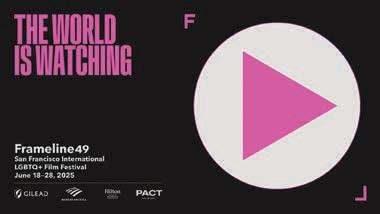
husband Kwangho were too poor when Mieke was born and gave their daughter up for adoption. Both Mieke and Okgyun each experience a profound sadness, but through Kwangho’s efforts, the family reunites. The initial visit is a bit awkward and tinged by unspoken feelings of guilt and shame over lost years. However, Mieke waits more than a decade to reconnect, in part, because she has concerns, not just about how her birth family will accept her and her Dutch girlfriend/wife, Marit, but also that she does not know what it means to be Korean, having spent almost her entire life abroad.
Between Goodbyes investigates what home and family mean for Mieke and her birth parents as they each seek understanding and forgiveness. This is a heartbreaking, but life-affirming, film about the power of love. Mieke is a very inspiring subject and Okgyun is equally compelling.
Plainclothes is an ambitious, yet muddled, debut by writer/director Carmen Essi about Lucas (Tom Blyth), an under-

cover cop in 1997 who entraps gay men in public restrooms. When he meets Andrew (Russel Tovey) in a bathroom stall, Lucas finds himself attracted to the suspect and lets him go; they later begin a secret affair. Essi uses pretentious cinematic devices from time-jumping narrative (cue facial hair signposting), and erratic editing to illustrate Lucas’ paranoia and conflicted mindset. Moreover, Lucas’ heavy-handed exchanges with his homophobic uncle (Gabe Fazio) are cringe-inducing. Plainclothes makes obvious points about shame, which is a real shame.
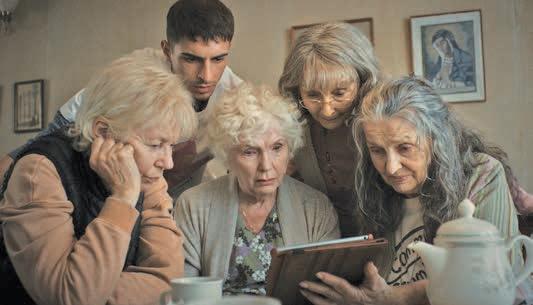
I Was Born This Way is a celebratory documentary that walks viewers through the highs and lows of gay singer, activist, and archbishop Carl Bean. He recounts his difficult childhood in Baltimore, MD, and musical success—first as a gospel singer, and then for Motown, when Berry Gordy asks him to record a new version of “I Was Born This Way,” in 1977. The song became a gay anthem, but Bean took his passion and energy—and his big voice—back to the church, founding the Unity Fellowship Church, a space for queer people of color. He also became an AIDS activist. Directors Daniel Junge and Sam Pollard nimbly trace Bean’s life and work using animation, archival footage, and interviews with Billy Porter, who produced the film and records a new version of Bean’s B-side “Liberation,” as well as Lady Gaga, whose monster hit “Born This Way” was inspired by Bean. (Editor’s Note: Also check out Dusty
Springfield’s “Born This Way,” which was released in 1990.) I Was Born This Way is a fitting tribute to an underknown legend.
Heightened Scrutiny chronicles trans advocate and activist Chase Strangio arguing the December 2024 Supreme Court case, United States v. Skrmetti, about banning gender-affirming care in Tennessee. (Strangio is the first transperson to argue in front of the country’s high court.) The film, directed by Sam Feder ( Disclosure) shows not only how Strangio must counter transphobic thinking that instills fear and misunderstanding, but also how the media creates trans narratives about regret and detransitioning that are being used to create laws and criminalize acts. With observational footage and a plethora of smart talking heads, including actor Elliot Page, Heightened Scrutiny generates both uplift and justifiable anger as it creates awareness. Hopefully, it will also change minds.
Sandbag Dam has teenager Marko (Lav Novosel) struggling with his sexuality after his neighbor, Slaven (Andrija Žunac), returns to Croatia from Berlin. Slaven was kicked out of his house because he and Marko were caught together. Now Marko, who is dating Petra (Franka Mikolaci), tries to avoid Slaven, but the guys meet up in secret and give into their desires. Director Čejen Černić Čanak establishes a strong sense of place, and she captures the homophobia of Marko and Slaven’s parents
(continued on page 32)
(continued from page 31)
and classmates realistically, but this simmering drama fails to generate much emotion or insight despite Novosel’s valiant performance as Marko.
Sally is a flattering portrait of Sally Ride, the first American woman to go into space. A role model for breaking a glass ceiling, Ride endured incredible sexism and gendered expectations on the job and in the media—before, during, and after her famous shuttle flight. As director Cristina Costantini’s informative documentary shows, she handled it all with aplomb. However, Ride did not publicly disclose her sexuality, or her decades-long relationship with her partner Tam O’Shaughnessy, until after her death. She was even reluctant to tell her sister, Bear, who was also a lesbian. Sally recounts Ride’s life and work, her ambitions and training at NASA, her positive impact on women in STEM, as well as her marriage to fellow astronaut Steve Hawley and her relationship with O’Shaughnessy, making points about how things are harder for women in general and queer woman in particular. As a pioneering lesbian who remains an inspiration, Ride gets some overdue love and even more respect.
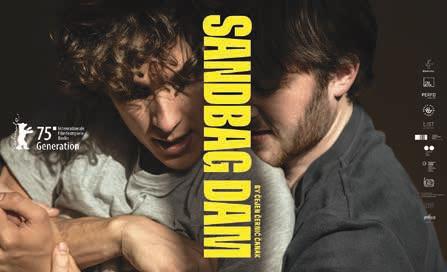
Keep Coming Back, Uruguayan filmmaker Sergio de León’s debut, has the baby-faced teenager Emilio (Bruce Pintos) overwhelmed by emotion after his mother, Lucía (Anabella Bacigalupo), dies. He is silently attracted to her boyfriend, Juan (Juan Wauters), with whom he manages a dovecote. They hope to win a race with their carrier pigeons. Emilio also explores his budding sexuality, by fighting with a man he spies on showering and visiting a gay erotic hothouse underground. Keep Coming Back is about Emilio’s endurance as he processes his feelings of grief and desire, but this slow, overly symbolic drama is more of an endurance test for viewers.
The feel-good Irish film, Four Mothers, has harried gay YA novelist Edvard (James McArdle) caring for his ailing widowed mother, Alma (Fionnula Flanagan), who has been debilitated after a stroke. Although speechless, Alma can still manage to make demands of and chastise her adult son using a computer. When Edvard is asked to participate in a book tour in the states, he struggles with getting care for Alma. Making matters worse, his friends all head off to a Pride event, leaving their mothers in Edvard’s care. Four Mothers is a bit farcical as Edvard tries to manage everyone’s needs but his own. He is given some assistance from his ex, Raf (Gaetan Garcia), a nurse, but what Edvard really needs is a backbone because he is taken advantage of too easily. Cue him denying the ladies a trip to Galway to see a medium—then getting on a bus to take them. The humor is gentle, and the emotions are sincere in this crowd-pleasing comedy.
Dreams in Nightmares invites the audience along for the ride as three Black queer friends, Z (Denée Benton), Tasha (Sasha Compère), and Lauren (Dezi Bing), go on a road trip to find their missing friend, Kel (Mars Rucker). Writer/director Shatara Michelle Ford takes time to introduce and appreciate each woman, so their interactions feel truthful and lived in. The trio of performers are all engaging and genial, with Compère’s practical Tasha a standout. As they drive from New York to Iowa City, to see Kel’s girlfriend Sabrina (Jasmin Savoy Brown), they make a stop in Pittsburgh for some queer poetry and head off to Kansas City to check in with Kel’s parents (Regina Taylor and Robert Wisdom), who fail to use their daughter’s preferred pronouns. The episodes are dramatic, funny, and heartfelt, especially when the trio arrive in Mexico. The film as a whole is uneven, but as with many road movies, one’s mileage may vary.
Outerlands is a sensitive character study of Cass (non-binary actor Asia Kate Dillon), who is eking out life in San Francisco. After spending a night with Kalli (Louisa Krause), Cass is asked to watch Kalli’s twelve-year-old daughter, Ari (Ridley Asha Bateman). Cass is also struggling because their landlord is making it increasingly more difficult for Cass to live in their apartment. Outerlands tells a not unfamiliar story,
but it benefits from Dillon’s strong central performance and a sly supporting turn by queer icon Lea DeLaria as a kindly queer bank employee who offers Cass support and community.
A gritty, moody gem, Baby has 18-year-old Wellington (João Pedro Mariano) connecting with Ronaldo (Ricardo Teodoro), a man more than twice his age. The sexual attraction between these guys is intense, and Ronaldo, a sex worker, takes Wellington under his wing. But Baby, as he is renamed, wants to do what he pleases. Director/cowriter Marcelo Caetano presents Baby’s story in an elliptical narrative that shows the young man living by his wits and his looks. The film generates considerable emotions because of the tender romance between Wellington and Ronaldo, and the attractive actors deliver lived-in performances.
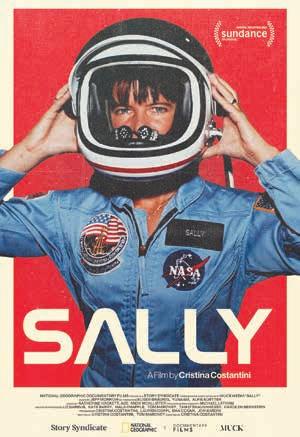
Gen_ is a marvelous documentary showcasing Milanese endocrinologist Dr. Maurizio Bini, who provides a humanist, empathetic approach to his patients, many of whom are either trans or couples seeking to have children. Dr. Bini handles his trans patents with compassion and care that is inspiring; he does what is right working
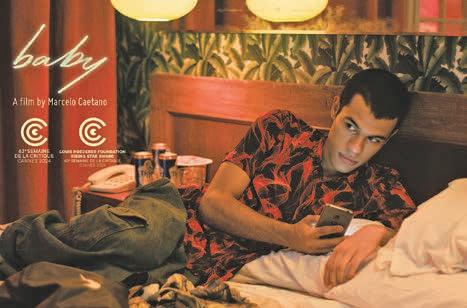
around the bureaucracy. He is encouraging when a client is struggling with their gender identity and reassuring with a patient who wants to suppress an erection, or one who wants to grow a beard. He makes queer youth feel at ease so they can “be in harmony with their body,” and tells a trans patient their father is “concerned, but not opposed” to their child transitioning. Dr. Bini is especially helpful with one adoptee trans patient grappling with abandonment issues. Director Gianluca Matarrese’s film gently eavesdrops on these riveting consultations, and he includes a montage of Dr. Bini’s patients’ bodies to emphasize the humanity of these transpeople’s lives. This is a rewarding, life-affirming documentary. Touch Me is out gay writer/director Addison Heimann’s wildly inventive film about Joey (Olivia Taylor Dudley) and her gay bestie, Craig (Jordan Gavaris), who fall under the seductive spell of Brian (Lou Taylor Pucci), a hot alien who can heal their traumas through cross-species intercourse. Or can he? This fabulous sci-fi horror comedy is equally ticklish and violent as the friends jealously battle each other for the love of a man who may have nefarious intentions.
In Marco Berger’s wondrous drama Perro Perro , Juan (Germán Flood) is vacationing with his girlfriend Jazmín (Bianca Brandimarte) and another couple, Rama (Matías Quiroga) and Viole (Aldana Dante), when he sees “MAN” (Juan Ramos), who is basically a dog, but in human form. (The film slowly clues viewers into this situation.) MAN is always completely naked and does not speak. Juan pets him and scratches his curly hair. In doing, he imprints himself upon MAN, creating a love that grows deeper and causes issues for (continued on page 48)
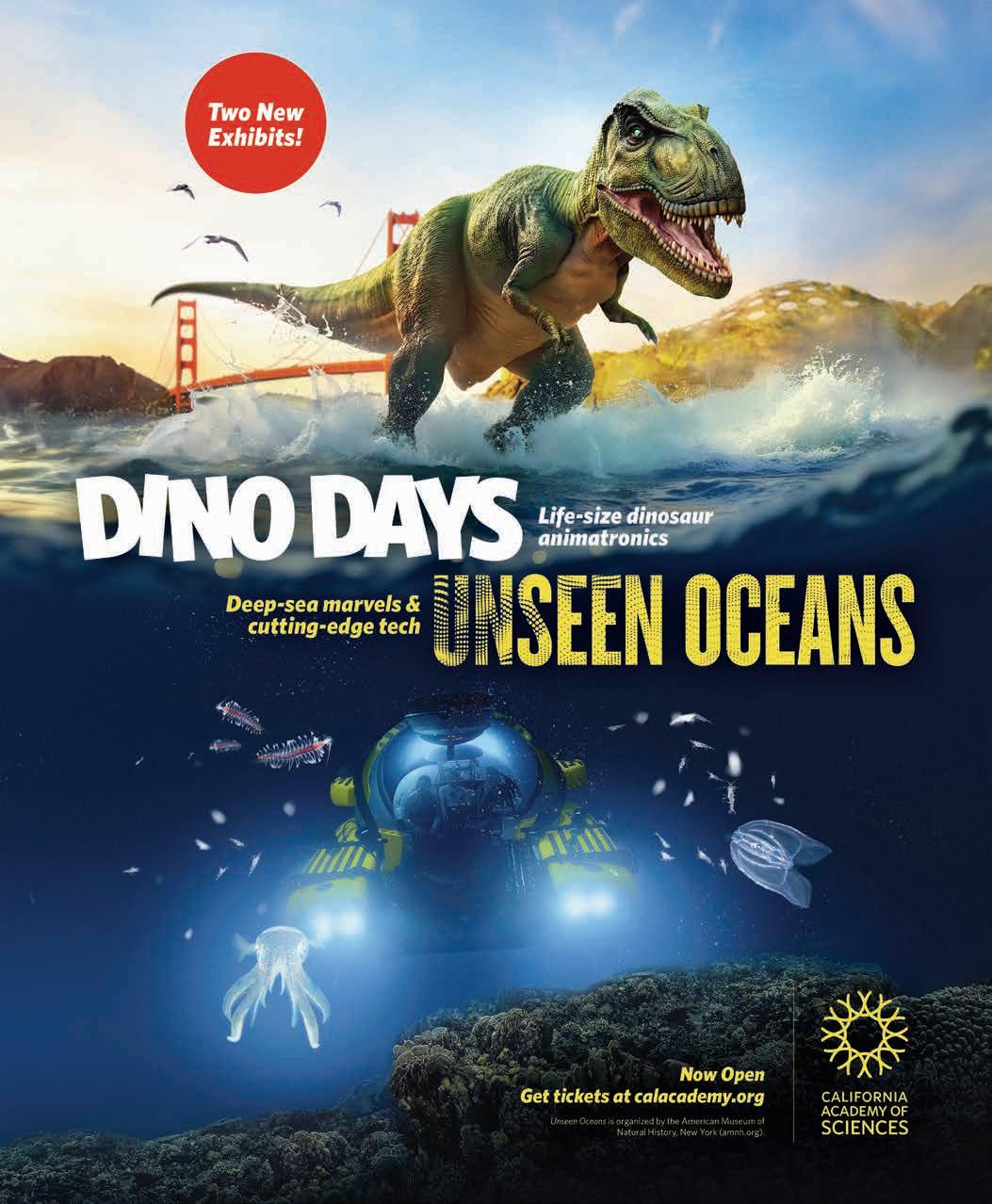
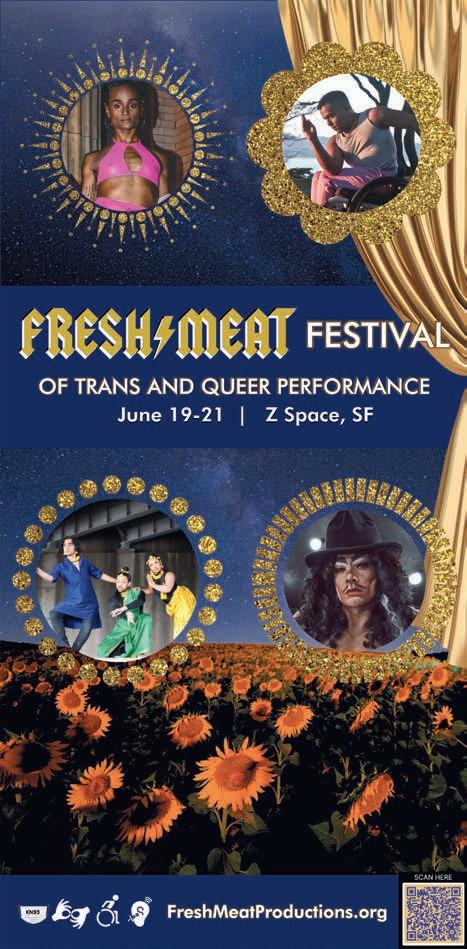
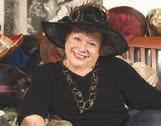
Off the Wahl
Jan Wahl
I recently discovered a new book worth checking out. It’s called Notorious: Portraits of Stars from Hollywood, Culture, Fashion, and Tech by Maureen Dowd. She
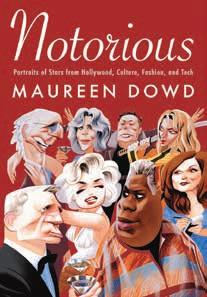
is a Pulitzer Prize-winning columnist for The New York Times, known for her sharp, incisive commentary on politics and culture.
In Notorious, she presents a captivating assortment of features and profiles. Silver screen foxes such as Paul Newman and Idris Elba, funny folks like Mel Brooks, and fashionistas like André Leon Talley are all featured. Don’t miss the chapters “Kate Winslet: Has No Filter,” “Sean Penn: Rebel with Many Causes,” and “Diane von Furstenberg: Has No Regrets.” It is a perfect and light summer read!
One of the most beautiful books I have ever seen is Moxie: The Daring Women of Classic Hollywood. From Dietrich to Lupino to Roz Russell, these are the women who defied stereotypes, fought the casting couch, and made many of us love classic film. It’s a coffee table extravaganza with gorgeous photos, by Ira M. Resnick and Raissa Bretaña, with a foreword by Jane Fonda. Go get some Moxie! Taking a brief break from books for the small screen: on Prime Video there is a great documentary, Bob Fosse: It’s Show Time! From the seedy strip clubs of Chicago to the bright lights of Hollywood, the award-winning director and choreographer boozed, pill-popped, and bed-hopped his way through life while creating amazing works of art. This would be a perfect gift for a dancer or choreographer, as some very articulate


dance experts comment throughout.
Last but certainly not least is a rich historical novel, based on the life of the luminous, groundbreaking Anna May Wong, who was the first Asian-American woman to gain stardom in early Hollywood. She is the focus of The Brightest Star by Gail Tsukiyama. Wong got big breaks in Tinseltown and huge heartbreaks. I couldn’t put this biographical novel down. Happy reading!
Jan Wahl is a Hollywood historian and film critic on various broadcast outlets. She has two Emmys and many awards for her longtime work on behalf of film buffs and the LGBTQ community. Contact her at www.janwahl.com
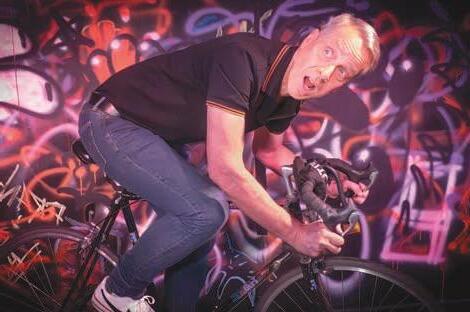
Doodler —a true crime thriller by John Fisher that has been hailed by reviewers as “Excellent! Chilling and compelling” (Stage and Cinema), “A joy to watch” (Theatrius), and “Wonderful. Fascinating!” (SF Theatre Blog)—is now at The Marsh San Francisco through July 6, 2025. Declared “The P.T. Barnum of gay theatre” (Theatrius), performer extraordinaire Fisher takes the audience on a wild ride that offers side-splitting camp, an electrifying thriller, an actionpacked crusade, and dead-serious memoir. Don’t miss the show that’s as morbid as it is magnificent, and as funny as it’s fabulous.
Whether you’re into true crime mysteries, cutting edge theatre, or just a great night out, you will have a blast at this high-energy production, which recently earned a San Francisco Bay Area Theatre Critic’s Circle “Go See!” recommendation.
For his subject, playwright, historian, and actor Fisher takes audiences back to the
when a killer stalked San Francisco’s gay community. The piece follows a young gay man’s relentless search for answers after losing a friend and possible love interest to the infamous “Doodler” killer. From Castro bars to Ocean Beach, the amateur sleuth flies through San Francisco’s historic queer landmarks in pursuit of clues and closure. The Doodler, infamous for the charming drawings he used to bait gay bar patrons, is a cold-case true crime story that has almost been forgotten.
Fisher combs through this chilling tale and takes the one-man show format to the extreme in a tour-de-force in which he operates all staging and technical elements live while delivering his signature dynamic and hilarious performance style.
Doodler plays Saturdays at 8 pm and Sundays at 3 pm at The Marsh San Francisco on Valencia Street, a venue renowned for nurturing daring, boundary-pushing solo work. It’s the perfect home for Fisher’s blend of drama, humor, and history, where Fisher tells this compelling story with the intimacy of a fireside tale and the bravado of an off-Broadway production.
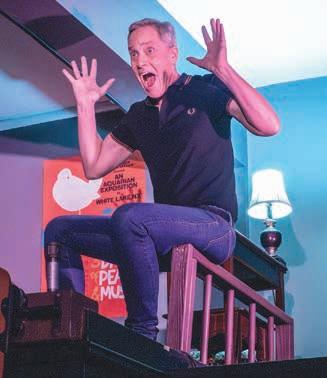
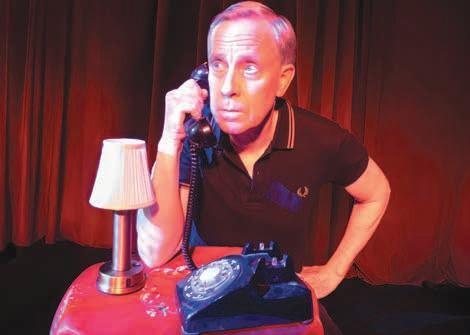
pervasive was the fear of public outing at that time—and the case remains unsolved to this day.
If you are looking for a taste of San Francisco history, Fisher’s Doodler serves up a slasher with a twist of camp, a splash of humor, and heartful, well-written characters who keep you hooked.
at The
Performances are 8 pm Saturdays, and 3 pm Sundays
Tickets: $25–$35 general seating, $50–$100 reserved https://themarsh.org/
It has been 50 years since the serial killer now known as the Doodler stalked victims in gay bars, doodled their portraits, then lured them to the outskirts of Golden Gate Park to finish them off with a knife, leaving their bodies to be found in the shrubbery. At one point, police actually had a suspect, but none of the survivors came forward to testify—a reminder of how corrosively
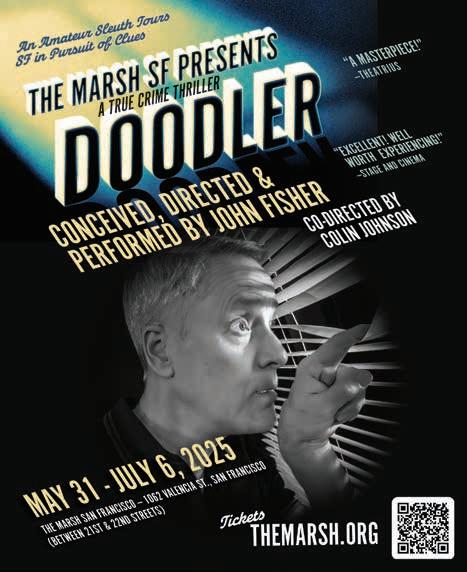
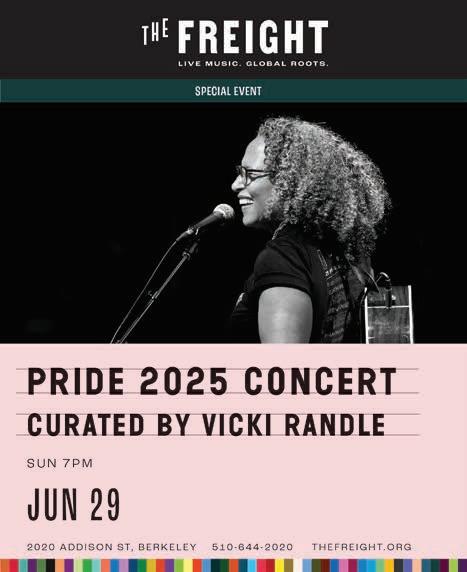
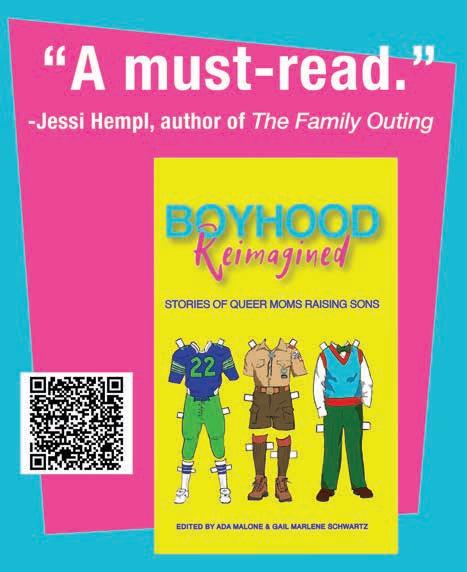


Maybe This Will Save Me (non-fictionhardcover) by Tommy Dorfman
Tommy Dorfman’s memoir comes together based on the revelations she received during a tarot card reading. Beginning with her troubled teen years, through her transition, and spanning her creative career, Maybe This Will Save Me is a beautifully written and honest memoir.

Atmosphere (fiction - hardcover) by Taylor Jenkins Reid
Taylor Jenkins Reid is back with a new novel, Atmosphere. Set in 1980s Houston, Atmosphere follows a woman who sees an advertisement seeking women scientists to go to space.
RECOMMENDATIONS FROM BOOK PASSAGE (continued on page 48)

After being accepted, Joan forms unlikely friendships with her fellow astronauts and begins to question everything she thought she knew.

Bury Our Bones in the Midnight Soil (fictionhardcover) by V.E. Schwab
A new genre-defying novel from V.E. Schwab, Bury
Our Bones in the Midnight Soil follows three women in three different time periods and the choices they make. Full of tension, desire, and hunger, this novel is Schwab at her best.
Upcoming Events
Saturday, June 14 @ 3 pm (non-ticketed - SF Ferry Building store) Mike Curato, author of Gaysians
Gaysians follows a group of 4 gay Asians as they navigate life in the early aughts. This



The great Marsha P. Johnson is rumored to have thrown the first brick at the Stonewall uprising. Here is her story, as an early Black trans activist and artist who said, “Thank God the revolution has begun, honey.” We need her more than ever today.
The most fun title for this summer is a heartfelt Fire Island romp with witches saving the day back in 1989. What’s not to love?

Disappoint Me by Nicola Dinan

Dinan brings us a funny, sharp, and poignant story of transwoman Max and maybe true love along with reckoning with the mistakes of her past. Max is due to learn that it’s love that matters, whether familial or romantic.
https://www.fabulosabooks.com/
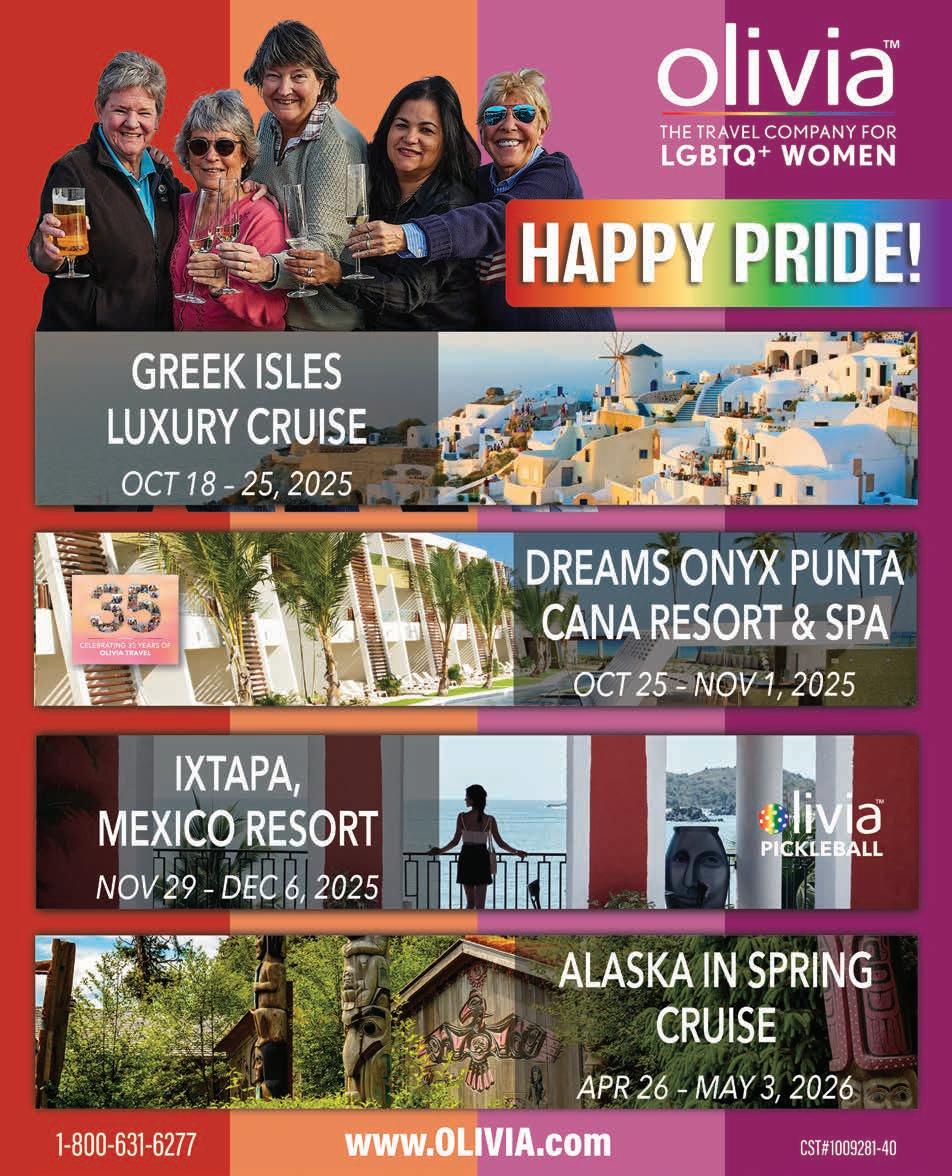
By T. Kebo Drew
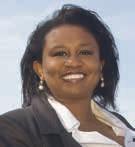
By the time I moved to San Francisco in the mid 1990s, I was burned out. I’d spent most of my youth in Oregon in social justice movement organizing, and fighting back against neo-Nazis and the right wing. I taught popular education workshops on fascism and I went on a Black lesbian poetry tour of small town and rural white Christian churches. I came here looking for ways to weave my art and activism into a stronger, flexible, brilliant fabric. Within my first few months in the city, I met filmmaker Madeleine “Mad” Lim. A few years later, she had founded the Queer Women of Color Media Arts Project (QWOCMAP), asking the question: “Who will tell our stories if we don’t?”
This year, QWOCMAP celebrates its twenty-fifth anniversary. Our annual International Queer Women of Color Film Festival runs June 13–15 at the Presidio Theatre, 99 Moraga Avenue.
Lately, I’ve been thinking about why I feel so fiercely about these films and why they feel so necessary. It all came together after reading something my old organizing buddy Scott Nakagawa wrote about how authoritarians manipulate history. He and I came up together as queers of color doing anti-fascist work in the Pacific Northwest. His piece about historical memory reminded me of something unsettling: I keep watching people discuss events that I’ve lived through, and the way those histories get twisted or disappear entirely.
One of the things that we discussed in my popular education workshops was how fascists burned Magnus Hirschfeld’s library in 1933—thousands of books and research on queer and trans lives, gone. Today feels familiar: removing the “T” from Stonewall, banning books, and defunding any organization that dares to name us as Black or transgender or immigrant in our work and grant applications.
Here’s what they can’t burn: our stories.

name the LBTQIA+ people of color community we serve, or couch what we do in “safer” language and euphemism to prevent legal challenges.
The message is clear: your histories don’t matter, your present can’t be named honestly, and your futures aren’t worth investing in.
But QWOCMAP refuses to stop. Our Saturday night Featured Screening of Standing Above the Clouds matters. It shows Kanaka Maoli (Native Hawaiian) mothers and daughters protecting the sacredness of Mauna Kea. Their story is about the right to exist, to practice ceremony, to pass traditions to the next generation. Our Sunday Featured Screening Can’t Stop Change: Queer Climate Stories from the Florida Frontlines is important. It demonstrates how queer and trans people of color and white LGBTQ+ folks show up for each other through mutual aid and collective care. Their story contrasts violent legislation with climate justice, disaster with hope and transformation.
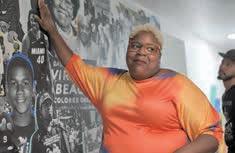
These films show that what’s happening now connects to what has happened in the past. They also show us how to build the worlds we need for the future.

Last year, a filmmaker traveled from New York just to attend the screening of her film at our film festival. She told us it was the first time she’d seen people who looked like her living full, complex lives on screen. That recognition changed how she saw her own possibilities as a person and as an artist.
Our films expand the imagination of what’s possible. They document survival and thriving. They practice the futures we dream.
These are scary times. Arts funding is disappearing. Organizations are struggling to survive.
When Lim made The Worlds of Bernice Bing, she recovered a piece of our history that mainstream culture ignored—a pioneering Chinese American lesbian abstract expressionist artist in San Francisco whose work deserves more visibility. In her film Jewelle: A Just Vision, she has documented the wisdom of an artist, activist, and celebrated Black femme elder who participated in the second Pride march in 1971 and continues to fight today.
Films trace traditions that colonialism desperately tried to sever. QWOCMAP Freedom & Film Academy alums Julia Nacario’s The Painted Ones, and M. Kaleipumehana Cabral’s KA ʻĀʻUMEʻUME: Navigating Home —show how two-spirit, māhū, and other Indigenous gender traditions existed long before European colonization arrived with binary thinking, which is proof of what we’ve had and what we could have again.
And at this year’s film festival, we’re screening RENEGADES: Celestine Tate Harrington: Building a Legacy. Celestine was a disabled Black mother who fought for her right to be both an artist and a parent. In a world that tells disabled people, queer people, and Black people that we’re burdens, Celestine said: I am a creator; I am worthy; I make history.
What’s Happening Right Now
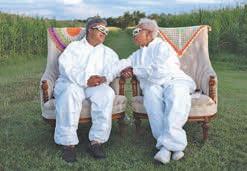
Yet, the twenty-five years of QWOCMAP has taught me that hope is a daily practice. Mariame Kaba calls it “the belief that we can change conditions that are harming us.” Our films are practices in that belief—exercises in imagining the worlds we need.
QWOCMAP began as a local light for Bay Area LBTQIA+ communities of color. We never expected to become what people call a global beacon. That’s what happens when you consistently make it possible for our communities to shout their truth, struggles, and joy: light travels much further than you planned.
QWOCFF2025 and Beyond
This June, QWOCMAP screens forty-nine films from around the world. We’re creating a space where our stories matter, where our communities are at the center, and where our futures are visible. We’re proving that, even in overwhelming times, we can create joy and connection and collective dreaming.
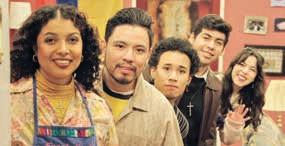
Our film festival is unique: it’s completely free, fully accessible, and open to everyone, with ASL interpretation, audio description, open captions, and COVID-conscious protocols. We believe our community deserves good things—including the chance to see ourselves as the complex, powerful people we’ve always been.
Decades ago, I learned that controlling language is one of the first things authoritarians do: deciding who can say what about their own lives; defining who and what is valued. We’re seeing it happen now. This year, the City of San Francisco unconscionably rescinded grants to 38 organizations led by people of color, including QWOCMAP. We lost $500,000 in funding that would have supported queer and transgender people of color filmmakers telling the truth of LGBTQIA+ communities. Some in the city have advised us not to

Queer and trans stories have survived book burnings and budget cuts, library raids, and legislative attacks. Our dreams will survive what’s coming. When we’re erased from the status quo version of history, we stitch fragments of the past into vibrant new stories. When someone attempts to silence us, we sing louder. When they try to steal our futures, we dream bigger, brighter, bolder. Come dream with us. All of our lives depend on it.
The 21st annual International Queer Women of Color Film Festival runs June 13–15 at the Presidio Theatre, 99 Moraga Avenue, San Francisco. All events are free. For the full schedule and accessibility information, visit https://qwocff.org/
For more information about QWOCMAP, visit https://qwocmap.org/ T. Kebo Drew is the Managing Director of the Queer Women of Color Media Arts Project: https://qwocmap.org/
Photos by Joanie Juster
In honor of National HIV Long-Term Survivors Day, the film Surviving Voices: HIV Lifetime & Long-Term Survivors was presented at the Roxie Theatre on Thursday, June 5, 2025.
The film’s premiere was a red-carpet event that featured, not only the screening of the documentary, but also the screening of the fulllength interviews of three of the interviewees featured in the film. An on-stage panel discussion was additionally presented that included local activists and survivors who appeared in the film.
Surviving Voices is a project of the National AIDS Memorial. More information is at https://bit.ly/3ZodWZf



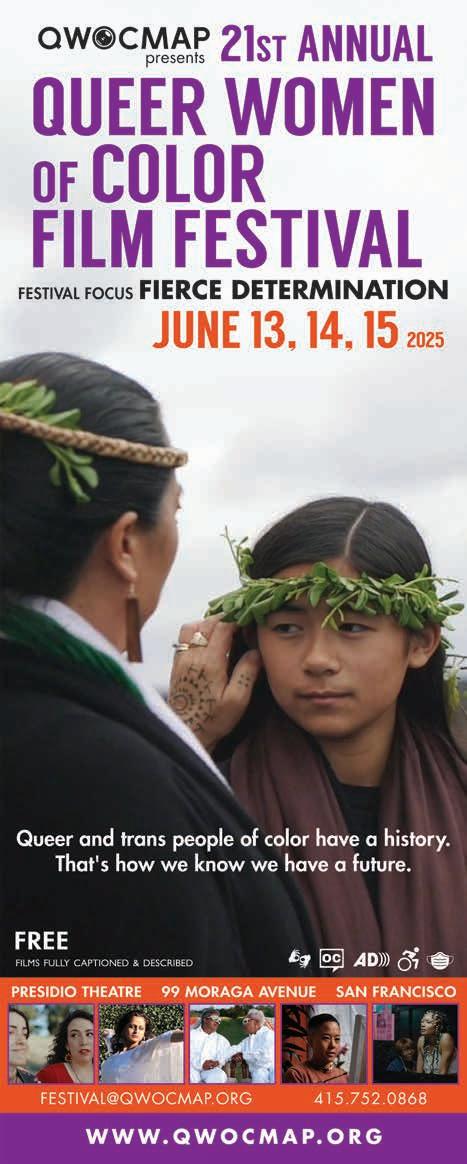
A Pride-season audience favorite, the FRESH MEAT FESTIVAL of Trans and Queer Performance, is back with exquisite, extraordinary dance, theater, and live music—June 19–21 at Z Space theater in San Francisco.
Featuring a star-studded lineup of world champion bachata dancers, gorgeous trans-americana music, stunning South Asian contemporary dance, cutting-edge drag performance artists, comedy, and more, the festival promises to bring joy, beauty, and resistance to the stage at a time our communities need it most.
At a time of unprecedented attacks on trans and queer communities, the 24th annual FRESH MEAT FESTIVAL resists erasure and celebrates our communities unapologetically.
“Audiences look forward to the festival all year long,” founding Artistic Director Sean Dorsey told the San Francisco Bay Times. “It truly is a love fest! The artistry is stunning, the energy is electric, and the performances offer audiences a re-charge ... and healing.” Dorsey is an Emmy Award-winning transgender choreographer who has toured his
work to over 35 cities across the U.S. and abroad.
Los Angeles-based comedic storyteller D’Lo returns to the festival after many years and shares, “The FRESH MEAT FESTIVAL is absolutely an important event for not just trans folks, but for queer folks and allies. And it’s a space that’s meant to fortify not just audiences but performers, because of the careful and deliberate manner in which the festival is artistically curated to be a radical and loving space for us all to share and be seen and celebrated.”
The full lineup includes: Aísha Noir, D’Lo, Ishami Dance Company, Jahaira and Angelica, JanpiStar, Mudd the Two Spirit, Sean Dorsey Dance, Shawna Virago, and hostess Churro Nomi.
Managing Director Eric Garcia co-directs Fresh Meat Productions with Dorsey, and is celebrated as their drag persona Churro Nomi and their monthly club Clutch The Pearls. As Co-Director of Detour Productions, Garcia creates immersive, queer performances. Garcia said, “The FRESH MEAT FESTIVAL, after 24 years, is still here! In the face of burnout, surveillance,

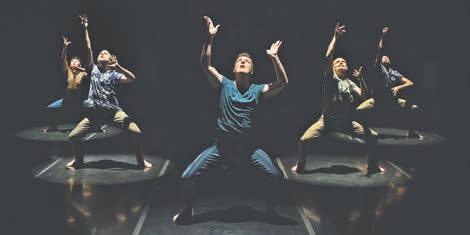
censorship, defunding, and disinformation—we’re still showing up, still making work, still creating space for artists and truth-telling.”
Dorsey added, “This festival is about more than performance: it’s about gathering, building sanctuary, reclaiming the body, the stage, and the future. The FRESH MEAT FESTIVAL reminds us that joy, rigor, care, and resistance can coexist.”
This year’s festival is brimming with world premieres—including new works commissioned especially for the festival through Fresh Meat’s FRESH WORKS! Program. Look for new works by JanpiStar, Mudd The Two-Spirit, Aísha Noir—and Ishami Dance Company, who will premiere “Tehzeeb,” a new work that explores South Asian culture through a contemporary and queer lens.
Blending classical movement with subversive flair, Tehzeeb celebrates the intersections of heritage and queerness, asking: What power, beauty, and resistance emerge when tradition meets self-expression?
As Amit Patel, Director of Ishami Dance Company said, “Ishami Dance Company is proud to debut this work at the FRESH MEAT FESTIVAL 2025. Especially in a time of rising anti-trans and anti-LGBTQ+ legislation, spaces like FRESH MEAT FEST aren’t just important; they’re essential sites of visibility, resistance, and collective joy.”
Bay Area drag superstar Mudd The TwoSpirit shares, “I will be performing an original piece featuring local drag artists Major Hammy, Glamputee, Cheetah Biscotti, and Sassi Fran. It will feature lip sync, choreography, and all POC talent! The piece is about the community you can find in nonconformity within the bounds of capitalism. Many of us were not made to serve the machine that has been actively working against us, no matter how much you try to adapt to it; if you can break away from it, whether by rejection, by choice, or by personal expansion, there is always something that can feel far more gratifying if you just exist in the way that you want to exist.”
Fresh Meat Productions is a beloved fixture in the Bay Area performance scene—
(continued on page 48)

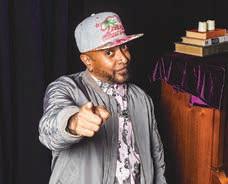

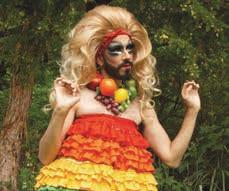


Jewelle Gomez
The high schools in Boston during my formative years were mostly segregated by gender at that time, which meant our basketball team had three Barbaras, Georgette, Jeanette—and Gwen, who remains my best friend. These were my heroes; their athleticism and dedication thrilled me, although I only sliced up the oranges for them to eat at half-time. Even believing in them as I did, I couldn’t imagine a future in which they were professional ball players like my (then) beloved Celtics were, except maybe in fantasy fiction.
I’ve thought of them many times over the sixty years since then. Their smiles, sweat, and camaraderie were prime ingredients supporting my feminism as my social consciousness evolved through the progressive
movements. The Girls High School team was once again by my side (metaphorically speaking) when I attended the pre-season game of the Golden State Valkyries, the first expansion team added to the WNBA in seventeen years. It further made history by hiring Natalie Nakase, who had earlier been the first Asian American coach to win a WNBA title.
I imagine there was a significant portion of the crowd that had never used the world Valkyrie in its life and wasn’t quite sure what Valhalla was, much less the announcer’s derivative rallying cry. Still, they were decked out in the team’s t-shirts, caps, and jackets (I’m still waiting for the earrings!), creating a sea of lavender.
Being in a women’s space has been increasingly rare and this was definitely that. A women’s space doesn’t mean there are no other genders present, only
that the dominant energy is female and the cultural effect is slightly different from another space. And there were more children; some so young they needed to wear earmuffs.
When the cameras scanned the crowd, projecting faces on the jumbo screens, it was the ecstasy of the children that sent the crowd roaring. That was equaled by the cheers when the more elderly fans were featured on the screen, such as my spouse and
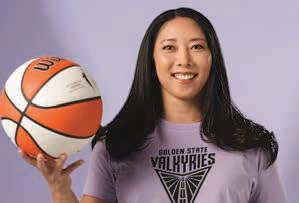
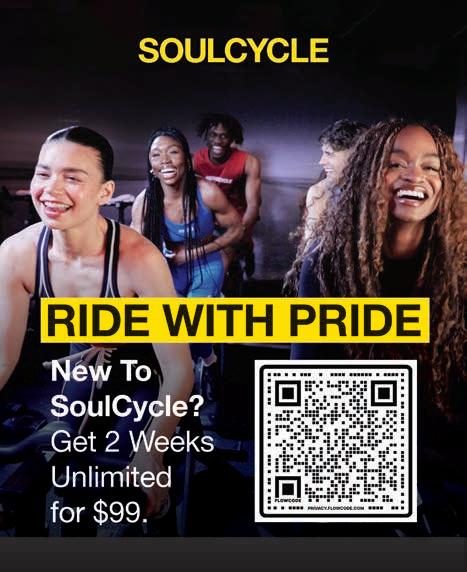
I (in our 70s) with two former colleagues in their 80s.
Yes, it is odd to see the athletes racing down court wearing layers of make-up, fake eyelashes, and hair weaves. It was especially jarring because such camouflage was prescribed in the early days so people wouldn’t assume the players were lesbians. Maybe younger players today just like to leave their marketing options more open.
Yes, it’s discouraging to know that the WNBA #1 pick’s salary for the first year was $78K while the NBA #1 pick’s first year salary was $13.8 million. I know that,
(continued on page 48)
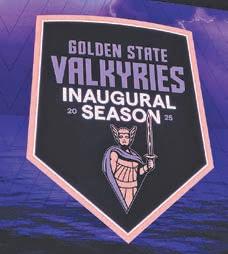
By Danilo Olla, Personal Trainer at FITNESS SF Castro
This is a variation of the kneeling hip flexor stretch, often called the couch stretch. It targets the quads, hip flexors, and side body. It is ideal for people who sit a lot. Take deep breaths and hold for 20 to 30 seconds per side to improve posture, open the hips, and restore mobility.



Troy Macfarland at FITNESS SF shares monthly tips that he has learned from colleagues, fellow professional trainers, and more. For additional information: https://fitnesssf.com/
Rikki’s, the only place in San Francisco that is dedicated to celebrating women’s sports, held its Grand Opening on June 11, 2025. The evening before, on June 10, San Francisco Bay Times sports columnist Beth Schnitzer was among those at a preview that followed a soft opening on Sunday, June 8.
Also attending were Sara Yergovich and Danielle Thoe—Rikki’s two co-owners, Mayor Daniel Lurie, Bay FC CEO Brady Stewart, Golden State Valkyries SVP of Marketing and Communications Kimberly Veale, SF LGBT Center Director of Programs Jennifer Valles, and Openhouse Interim Executive Director Vinny Eng.
All received an early look at the space, dedicated to Rikki Streicher and women’s sports, and could enjoy Rikki’s full menu of foods and drinks. The two featured matches on Rikki’s 14 televisions that evening were the WNBA’s Indiana Fever vs. Atlanta Dream at 4:30 pm and Chicago Sky vs. New York Liberty at 5 pm.
Check out the next issue of the Bay Times for more about Rikki’s! https://www.rikkisbarsf.com/
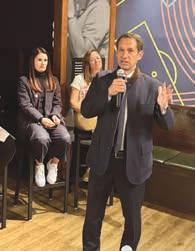

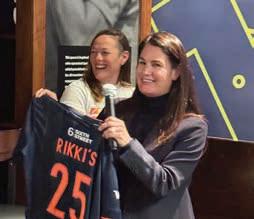
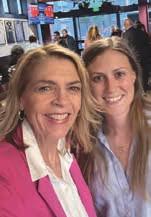

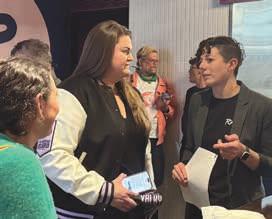


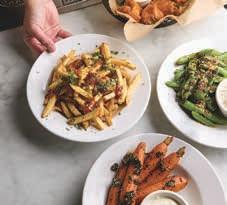
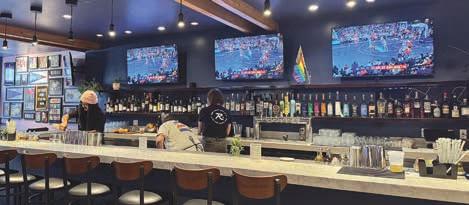
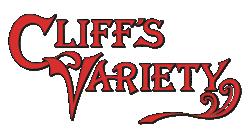

Foam Party Wig
It’s party season! No time to shake out your wig? Throw on a foam party wig and skip the hairspray. We’ve got updos, bobs, Marilyns, and more! Starting at $42.99 each.
Portable Telescoping Stool
Bring your own seat with this amazing compact portable telescoping stool with a weight capacity of 285 pounds. Available in assorted colors. $24.99.

Keep up with Cliff’s Variety news at Facebook ( https://www.facebook.com/CliffsVariety ) and Instagram @hilario¬_sf
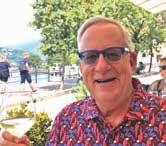
David Landis
While the San Francisco Bay Times’ Pride Week issue is still on the horizon, yours truly wanted to give you the heads up for culinary and bar Pride specials that begin even earlier. So, if you’re looking to celebrate Pride throughout the month, here are some fun ideas.
Compton’s Cafeteria Riot
Let’s start with a little LGBTQ+ history 101. Did you know that one of the most important LGBTQ+ uprisings that defined the movement that created Pride came 3 years before Stonewall in 1966—and it happened in San Francisco? The now-chronicled event is called the Compton’s Cafeteria riot . It took place at the gathering haunt of many transgender women and drag queens at the former eatery located at 101 Taylor Street (now marked with a historical plaque). Advocates are now trying to reclaim that spot for the LGBTQ+ community. I, for one, applaud those efforts.
So, what happened there? The folks who headed to Compton’s after their nightly gigs would meet up with likeminded souls in a friendly atmosphere, especially since at the time it was a crime to crossdress in public. One night, they got fed up with police harassment and fought
back. That became a turning point for our tribe.
If you want to have an immersive theatrical experience—complete with a “breakfast for dinner” of delicious pancakes, syrup, sausages, and decaffeinated coffee—head to the re-enactment now playing at 835 Larkin Street in the Tenderloin. The show is produced by The Tenderloin Museum , and the producers have built a real replica Compton’s Cafeteria from the ground up. You sit in the eatery while the actors mill about and perform that “legacy of resistance.” I found the experience incredibly moving, while learning a lot about our shared history. The performers are mostly transgender, which adds authenticity to the story. Because the show takes place in the middle of the Tenderloin, you still feel the grit of the neighborhood that these people encountered on a daily basis. When the actors talk about just wanting to live their lives, have jobs, and not be harassed, the humanity of it all hits home, and especially now. An added bonus? You’re invited postshow to the kitschy Kung Fu Lounge next door to mingle with the cast. It’s a delightful saloon festooned with red Chinese lanterns, amidst an array of Kung Fu movies on several screens. Speaking and drinking with the cast add immensely to the adventure.
I asked co-writer and co-producer Mark Nassar how they were able to build an entire diner from scratch. “It was a scavenger hunt to keep prices down,” Nassar told me for the San Francisco Bay Times. “The circular and chaise black booths are from the original Original Joe’s, by way of Piano Fight , after they closed. The tables are from the great vegetarian restaurant, Ananda Fuara, which was on Larkin and Market. (Note: both of these now-shuttered restaurants were nearby in the neighborhood.) Our other booths, counter, and stools are from a diner in Bakersfield that was closing. Our set designer, Roxy Rose, is transgender; she’s a wild looking blonde,
usually in a cowboy hat and black leather. She went to Bakersfield and negotiated with a farmer, whose dad owned the diner, to get the items (at an incredible price).”
So, go now, join the riot, and continue to resist. The fight continues, and it’s a great way to celebrate Pride.

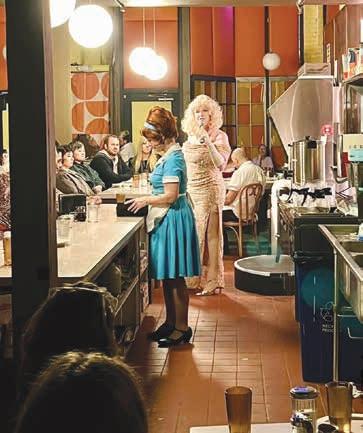
from 2 pm–6 pm. Welcoming more than 25 makers and small businesses, many of which are LGBTQIA+ owned and operated, TETRA’s Oasis Makers Fair: Pride Edition is free and features a performance by Bay Area drag troupe the Rice Rockettes. The event includes raffles throughout the afternoon, with proceeds benefiting the Rainbow Chamber of Silicon Valley.

The Ferry Building Marketplace is celebrating Pride with a series of weekly drag pop-up performances from 4–6 pm, featuring Afrika America and friends. On June 12, you’ll see Drag Race/WOW Presents stars Jax, Dee Dee Marie Holliday, and Militia. On June 19 (Juneteenth), the performers will also include BeBe Sweetbriar and Mercedez Munro. On June 26, the Imperial Court of San Francisco will reign supreme with Emperor Ashlé Blow, Empress Afrika America , and Imperial Crown Prince Nathan D’Aguiar
During the month, Saluhall is offering a rainbow “Guava Have Pride” cocktail (vodka, mint, jalapeño, guava, lime, and elderflower), with the proceeds going to the SF LGBT Center. They’re also selling Pride cardamom swirls alongside their regular baked goods.
TETRA Hotel’s Oasis Makers Fair: Pride Edition returns to the Silicon Valley property on June 21
1 Hotel San Francisco is hosting its 3rd annual Pride Brunch on the resident restaurant Terrene’s al fresco patio on June 14 . The fan-favorite brunch will include performances from a curated group of drag queens, festive themed cocktails, seasonal bites, and more. DJ Juanita MORE! provides the vibey beats, with performances by talented local queens, Lady Camden, Tila Pia, Nicki Jizz, and Carnie Asada. Proceeds from the event benefit the SF LGBT Center as well as the Transgender Law Center.
Also on June 14, Hotel Zeppelin will host the Downtown Divas Drag Brunch, a high energy kickoff to Pride. Guests will enjoy dynamic performances from legendary queens Alexis Miranda and Queen Cougar, with special appearances by Tiger Lily and Linda Summers DJ Donnie Moon will spin, and a full brunch will be served. Tickets include the show and brunch. Guests can purchase mimosas, sangria, and handcrafted Fever Tree cocktails throughout the afternoon. Brunch seating begins at 12:30 pm, with the show starting at 1 pm.
(continued on page 45)
The Downtown SF Partnership’s Drag Me Downtown series is returning on Fridays this June. This free-toattend drag show series features pop-up drag shows at downtown San Francisco businesses each week throughout June to celebrate Pride Month with local performers. This year’s final show, Drag Me to Front St., will close out the event with an open-air drag show and block party taking place on Front Street, California’s first-ever Entertainment Zone. This performance will be co-hosted and headlined by Peaches Christ . Since it is the first drag show at the Front Street Entertainment Zone, attendees can enjoy alcoholic beverages outdoors during the event. The event is free to attend, but attendees are encouraged to pre-register to secure Pride swag, with proceeds directly supporting The Transgender District , the world’s first legally recognized transgender district.
The Ritz-Carlton, San Francisco celebrates the LGBTQ+ community during Pride Month in June with a vibrant-themed afternoon tea inspired by love and the spirited colors of the rainbow flag. Guests begin the experience with a champagne toast and a pot of premium tea of their choice before indulging in a tea tower of summer-inspired tea sandwiches and desserts and pastries. These include: Funfetti Scones, “Love Shack” Linzer Cookies, Pride & Passion Mousse, and Rainbow Love Cake. Beverages for additional purchase will include the Hermana cocktail—dedicated to the historic Castro district in San Francisco—crafted with Ketel One vodka, prickly pear, passion fruit, lemon juice, and Cointreau liqueur. This afternoon tea is available on the weekends in June from 2–4 pm.
Dirty Habit , Hotel Zelos’ sultry rooftop bar and restaurant, offers the return of its Blue and Fancy cocktail for Pride Month. With vibrant blue, pink, and purple hues inspired by the bisexual Pride flag, Blue and Fancy is as bold and beautiful as the community it celebrates. Crafted with Roku Gin, pear brandy,
citrus, and butterfly pea flower powder, this patio-perfect cocktail is as photogenic as it is delicious—topped with an edible flower for that extra flourish.
Gentleman Farmer Wines is back with another limited-edition Pride wine that continues its tradition of celebrating and supporting the LGBTQ+ community. The husband-and-husband team behind this Napa-based, gay-owned winery has released a 2022 Red Blend (75% merlot, 25% cabernet sauvignon) just in time for Pride. Only 25 cases were produced, with 10% of proceeds going to the
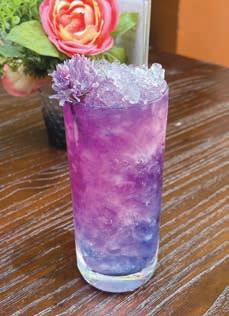
It Gets Better Project, LYRIC , and Napa’s own VOICES.
The Yountville Chamber of Commerce is presenting the second annual Yountville Pride Celebrations in June. This multi-day celebration includes special offers, events, and packages, including Pride Trivia, special wine and food pairing events, an evening of “Bean Bags, Pride Flags and Cornhole,” Pride Bingo, Pride Paint Night, a special screening of The Rocky Horror Picture Show, and more. Yountville Pride Celebrations culminate with the Pride in the Park event on June 22 at Yountville Veterans Memorial Park. The event is free and open to all, featuring live music, food trucks, arts, crafts, booths, and more.


If you stay at LUMA Hotels in San Francisco or New York during June, you can enjoy a Pride package where 10% of proceeds benefit the SF LGBT Center or the NYC LGBT Community Center David Landis, aka “The Gay Gourmet,” is a foodie, a freelance writer, and a retired PR maven. You can email him at: davidlandissf@gmail.com Or visit him online at: https://gaygourmetsf.com/
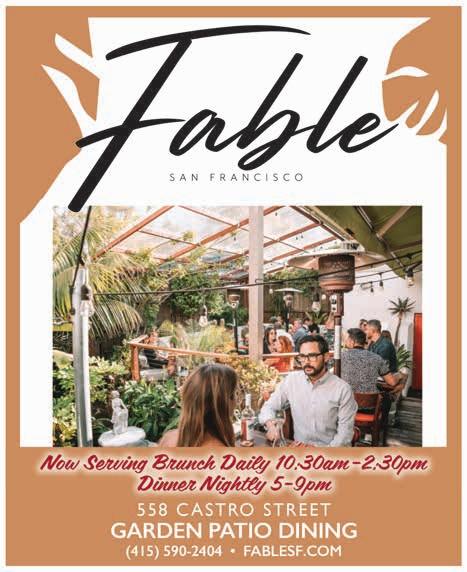
Cocktails With Dina by Dina Novarr
The day I met him, Phil Collins—the beverage director at TableOne, not the musician—sauntered in wearing a crop top, leggings, and the most magnificent trench duster I’d ever seen. In the back of my mind, all I could think was: I wish I could be as cool as him one day (spoiler alert: I’m still working on it).
That’s the thing about people like Phil. They have this gravitational pull that comes from complete ownership of their space, like they’ve figured out some cosmic secret. He doesn’t just craft cocktails; he orchestrates liquid storytelling with the same fearless confidence he brings to everything else, including showing up to professional meetings dressed to impress.
When I asked Phil about this year’s Pride, his response was pure gold wrapped in a rainbow: “I have a feeling Pride this year is going to be extra special and extra loud. It’s a terrifying time for our community when someone as unhinged as our president teeter totters between tantrums and has the ability to impact my entire life in the swipe of a pen. But our community has never not taken the opportunity to live more out loud when people try to darken our shine. I’m personally excited to be surrounded by us in all capacities ... . It’s scary, but we all

have each other’s backs.”
Phil embodies this philosophy like he was born for it. This is particularly resonant here in San Francisco, where Pride isn’t just a celebration—it’s our reminder to the world that we invented fabulousness and we’re not giving it back. This is where the modern Pride movement found its voice. In the Castro, Harvey Milk reminded us that hope is never silent. Every June, Market Street becomes a glittery testament to the power of living out loud.

where identity is celebrated, where chosen family gathers, and where the art of hospitality becomes an act of radical inclusion served with the perfect ice cube. The drinks are strong, but the stories are stronger.

San Francisco’s cocktail culture mirrors this same spirit of unapologetic creativity and community, with a healthy dash of “watch me make magic happen with three ingredients and a garnish.” From historic queer-friendly speakeasies, to the legendary bars of the Castro, up to the newest cocktail lounges in SOMA, our city’s drinking establishments have always been more than just places to get tipsy—they’re spaces
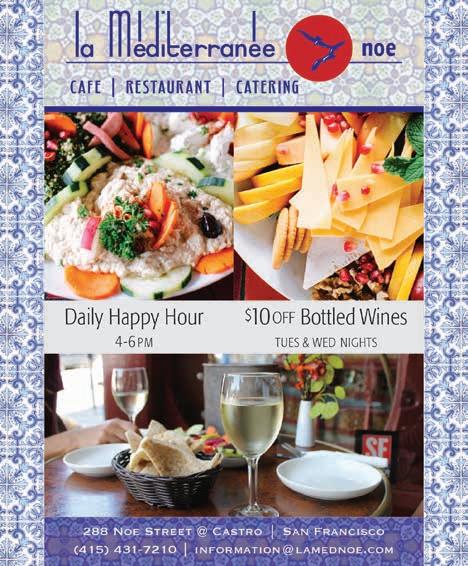
Phil speaks with the passion of someone who’s clearly found their calling: “I’m a gay hospitality professional that is in active pursuit of opening my own bars and restaurants, not just to take up space, but to bring a true sense of community. We are excited to base the mission of our group in giving back to our neighborhoods by offering scholarships to LGBTQIA+, female and minority students who want to pursue a career in hospitality ... we then bring our students back on to our teams to offer them real life experience in their chosen profession.”
It is giving back while instilling Pride in a tangible, digestible, and impactful manner.
Phil’s been perfecting his approach—make it taste great, make it look great—in his work around the country: “I’ve been back behind the bar working at various different spots, and one thing I’ve loved is sharpening up my classics. I have been on an Old Fashioned kick lately trying to hone in on the perfect build. I’ve been adding a slight pinch of salt into the mix to balance out the sweet, and split basing the whiskey with a mix of bourbon and rye to add in a hint of spice.”
His Old Fashioned is basically Phil in cocktail form—a classic with a twist, sophisticated yet approachable, and guaranteed to make you feel like you’ve got your life together.
That pinch of salt he adds? It is San Francisco genius, conveying a city surrounded by ocean, where the fog carries brine and every great drink needs that mineral kiss to make it sing. The split base of bourbon and rye mirrors our city’s own beautiful contradictions: rooted in Gold Rush grit, but always reaching toward the future.
There’s something Phil taught me without ever saying it directly: the people who scare others are often the ones who possess the power to sway hearts and minds. Phil has mastery over his craft, and complete comfort in his own skin. He doesn’t shrink to make others comfortable, and that’s exactly the energy our community needs right now, especially as we prepare for Pride in
the city that wrote the book on celebrating queer joy.
In San Francisco, we’ve always known that the best cocktails—like the best lives— require equal parts skill and fearlessness, tradition and innovation, precision and passion, plus just a pinch of that indefinable something that makes people stop and think, “I wish I could be as cool as them one day.”
Phil Collins gets that. And honestly? I’m still trying to be as cool as him.
San Francisco-based Dina Novarr enjoys sharing her passion for fine wines, spirits, non-alcoholic craft beverages, and more with others.

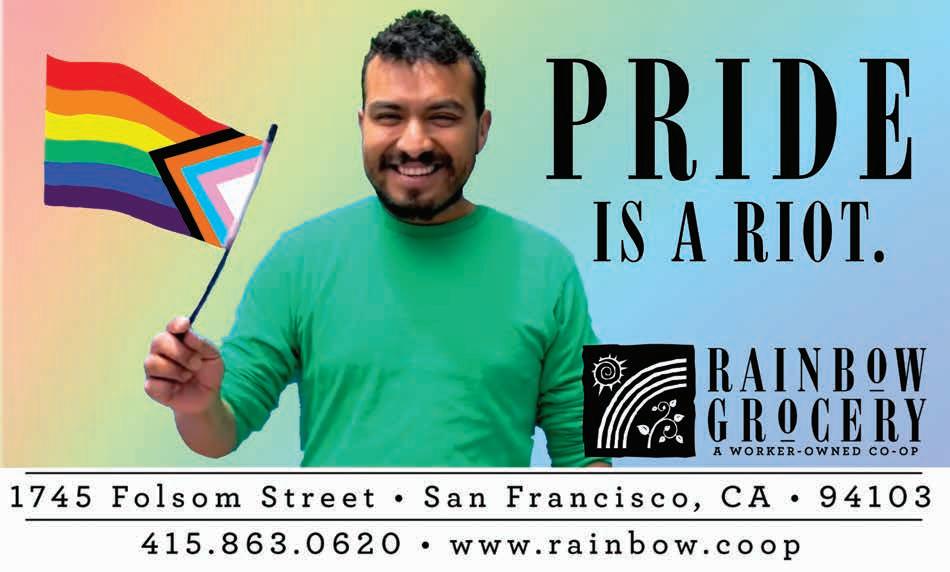

(continued from pg 36)
beautifully illustrated graphic novel is a celebration of self-discovery and queer resilience. Curato will be joined in conversation by Brontez Purnell.
Saturday, June 21 @ 2 pm (ticketed -Calvary Presbyterian SF) B. Dylan Hollis, author of Baking Across America
Baking Across America takes readers on a culinary journey through the United States. Hollis uncovered amazing dessert recipes from each state ranging from the classics to local favorites. Tickets include a meet & greet and photo opportunity.
Saturday, June 28 @ 4 pm (ticketed - Corte Madera store) Shannon Watts, author of Fired Up: How to Turn Your Spark Into a Flame and Come Alive at Any Age
Shannon Watts, founder of Moms Demand Action, has helped thousands of women find themselves and take center stage in their lives. Her empowering new work, Fired Up, is all about harnessing your potential and coming alive. Watts will be joined in conversation with Amanda Haas.
https://www.bookpassage.com
in a country where the median salary is under $40,000, nobody needs to make $13 million to survive. In 1983, women earned approximately 83% of what men earned, but today’s WNBA deficiency is by 175 times! All that said, the Chase Center was a fantasy fiction dream come true for those of us remembering how women’s sports have developed since Title Nine.
Many workers were deployed to help fans to our seats; I imagine the assumption being there would be a lot of first-time attendees. I heard a woman comment to a worker as she descended to her seat, “Wow, looks like I’m in the lesbian section.” He responded smiling, “It’s all the lesbian section tonight!”
I know a basketball game doesn’t disband DOGE, impeach a criminal president, refund desperately needy government agencies, re-educate Nazi sympathizers, or any of the “stranger things” that keep emanating from Washington. But maybe it gives some of us, like the kids who keep battling the Upside Down, the inspiration to stand up to Vecna.
Jewelle Gomez is a lesbian/feminist activist, novelist, poet, and playwright. She’s written for “The Advocate,” “Ms. Magazine,” “Black Scholar,” “The San Francisco Chronicle,” “The New York Times,” and “The Village Voice.” Follow her on Instagram and X @VampyreVamp
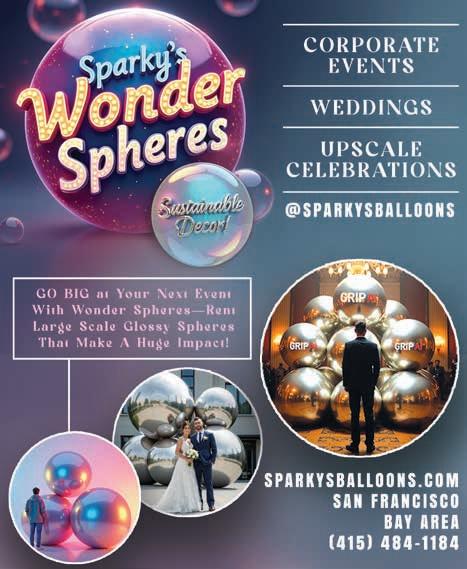
(continued from pg 32)
him and Jazmin and the others. Shot in luminous black and white, Berger’s film is an allegory that shrewdly lets viewers draw their own conclusions about sexuality and gender, but it is also a deeply romantic love story between a man and his naked human-looking dog.
A Night Like This has the straight Oliver (Alexander Lincoln) trying to befriend the gay Lukas (Jack Brett Anderson) first in a bar, then on a bus on a winter’s night in London. When the morose Lukas relents and agrees to pal around with the fast-talking Oliver until his 8 am work shift, it is not sexual; they just walk and talk, go to a bar, or grab food. The entire time they discuss their lives, dreams, and frustrations—and encounter various people who have an impact on their night. The conversations range from serious to silly, which makes A Night Like This rather bumpy. Oliver can be sweet, but he is also boisterous and, at times, irritating. His bluster masks a real fear, which eventually comes to light. Lincoln sells his character—especially when he spouts heartfelt speeches in a bar or to Lukas. In contrast, Anderson gives a more internal performance and is at his best during a moment of honesty. While there is mild sexual tension between the leads, there is not enough satisfaction when they do finally kiss, which lowers the stakes about wanting them to couple up. A Night Like This is kind of like Oliver—it will either charm or annoy viewers.
During the intense drama Sauna , when the lonely Johan (Magnus Juhl Andersen) meets William (Nina Terese Rask), he reveals, “I’ve never been with a trans guy before.” William is taken aback, but Johan’s curiosity soon leads to consent, and they start a hot and heavy relationship. However, an imbalance soon develops; William gives Johan several reality checks. Sauna remains absorbing as Johan becomes more self-destructive—Magnus Juhl Andersen gives a blistering performance—and he is ably supported by Nina Terese Rask, who is so marvelous, viewers may wish the film was told entirely from William’s point of view.
Diciannove captures the messy life of its handsome protagonist, Leonardo (Manfredi Marini), a 19-year-old sexually fluid student. Quitting business school in London, Leonardo goes to Sienna to study literature. But he is restless and mostly miserable, fending off invitations from classmates and railing against his professors. He is actually not very likeable, despite newcomer Marini’s insouciant performance, which makes it hard to care what happens to him. Writer/director Giovanni Tortorici takes a quasi-experimental approach that focuses on details to create its portrait of a youth finding his way, however, the episodic Diciannove ultimately proves to be both stylish and empty.
#300 Letters When Jero (Cristian Mariani) comes home from a workout to find his partner Tom (Gastón Frías) is gone and ghosting him on their anniversary, he experiences the five stages of grief. As a way of explanation, Tom has left a box of 300 letters explaining his side of their relationship. When Jero starts reading Tom’s missives, he learns that his ex thinks he is childish and superficial. He also learns that Tom was no saint, lying to him and (at least) once cheating on him. #300 Letters cannily lets viewers process Jero’s breakup in ways that illuminate the relationships, from the irresistible sex to the first “I love you,” to moving in, and other milestones, including a threesome. Directed and cowritten by Lucas Santa Ana, this nimble film succeeds because Mariani, who reads the letters mostly in his underwear, expresses Jero’s emotions and enlightenment with style.
© 2025 Gary M. Kramer
Gary M. Kramer is the author of “Independent Queer Cinema: Reviews and Interviews,” and the co-editor of “Directory of World Cinema: Argentina.” He teaches Short Attention Span Cinema at the Bryn Mawr Film Institute and is the moderator for Cinema Salon, a weekly film discussion group. Follow him on X@garymkramer
known not only for their annual festival, but also resident dance company Sean Dorsey Dance, FRESH WORKS! and TRANSfutures artist commissions, trans-supportive dance classes, and advocacy for intersectional trans justice in the performing arts.
Garcia said, “The festival believes that artists are the stewards of our collective future. We create the worlds we want to live in—bold, brilliant, accessible, unapologetically trans and queer, and full of joy. That’s what you’ll see at this year’s festival!”
Get your joy on at the 2025 FRESH MEAT FESTIVAL. Advance tickets are recommended for this popular event.
ASL Interpretation will be provided at all performances. Z Space is wheelchair accessible and has all-gender bathrooms. KN95 masks will be provided and required.
2025 FRESH MEAT FESTIVAL of Transgender and Queer Performance
June 19–21, 2025 (all shows at 8 pm)
Z Space (450 Florida Street, San Francisco, 94110)
All performances feature ASL Interpretation Tickets/Info/Access Information: http://freshmeatproductions.org/ View a trailer for the festival at https://bit.ly/3T6FUoZ

By Sister Dana Van Iquity
Sister Dana sez, “Participate in NO KINGS DAY on June 14, because Trump is NOT a king and does NOT deserve a military parade with tanks on his birthday—paid for with tens of millions of dollars by taxpayers!”
The organization INDIVISIBLE and a coalition of other pro-democracy partner organizations are promoting the nationwide NO KINGS DAY of Defiance on Flag Day (June 14). The actions are set to take place during tyrant Trump’s military parade (including armored tanks) in Washington, D.C., on June 14. Protesters across the country will come together for marches, rallies, and demonstrations to reject corrupt, authoritarian politics in the United States. In San Francisco, gather at Dolores Park at 11:30 am, June 14. Then at noon, march to Civic Center Plaza for a rally 1–2 pm.
“June 14th is also the U.S. Army’s birthday—a day that marks when Americans first organized to stand up to a king. Trump isn’t honoring that legacy. He’s hijacking it to celebrate himself,” commented a spokesperson from Indivisible. They added, “This is bigger than politics. They’ve defied our courts, deported citizens, disappeared people off the streets, attacked our civil rights, slashed essential services, and handed billions to their allies. We’re not gathering to feed his ego. We’re building a movement that will leave him behind. The flag doesn’t belong to Donald Trump. It belongs to us. Enough is enough!” More info at https://www.nokings.org/
Trump and his arch-conservative Supreme Court thought his immunity from the law was a done deal. But Justice Sonia Sotomayor heartily disagreed stating, “The president is now a king above the law. With fear for our democracy, I dissent!”
It was MARTINI WEEK , May 19–25 nationally (“Drink a Martini that Matters”), so a dozen of us local SF Sisters of Perpetual Indulgence (SPI) appeared at 18 Harlan Place on May 19 to celebrate! JUNIPERO GIN was excited to throw this weeklong celebration and continue raising funds for SPI—a longstanding LGBTQ charitable organization whose roots in San Francisco go back to 1979, and now have chapters worldwide. Funds raised this year for Martini Week went towards four other SPI chapters. Martini Week began in 2022 as a love letter to San Francisco and the martini,
which has become a coast-to-coast celebration of creativity, community, and giving back. This year, they expanded to 14 cities. Cheers, everyone!
Celebrate the INTERSEX PROGRESS PRIDE FLAG MURAL being installed by Castro Ambassador and activist Harry Breaux and community volunteers in Jane Warner Plaza on June 20, 5:30–6 pm. This plaza is visible to the whole world via the San Francisco Bay Times Castro Street webcams—giving the universe a view of the inclusiveness and how it is represented in the Castro.
PRIDE BINGO is back! Join us Sisters of Perpetual Indulgence on June 13 at 7 pm, Elks Lodge, 450 Post Street, 3rd floor. Bingo cards available in advance and more info at the SF Elks website store. ( https://store.sfelks.org/ ) Ohhh 69! Bingo!
While most of us Americans were asleep an hour after midnight May 21, Republicans were wide awake, trying to gut Medicaid and Medicare without us knowing. They snuck votes for over $500 BILLION in cuts to Medicare and tried to rip Medicaid from nearly 14 million Americans. Governor Gavin Newsom had pointed out that, if passed, the bill would strip up to 3.4 million Californians of their health coverage and cost the state an estimated $30 billion in lost federal funding. The loss of federal funding would also force a number of hospitals and clinics across the state to shut down. This massive tax break to ultra-wealthy corporations and billionaires would also gut nutritional aid assistance—which puts food on the table for children, veterans, and seniors. So, on May 22, just two Republicans and every Democrat in The House voted “nay,” and thereby the “Bogus Billionaire Bonus” passed for Senate approval. Sister Dana sez, “Repugnicans know this is wildly unpopular, which is why they did it when they thought no one would notice—under the cover of night, behind closed doors. Is this in ANY way a form of democracy?!”
They gave a “big, beautiful” gift in their tax bill to any mass shooter or assassin who intends to take lives when they deregulated silencers, allowing ANYONE to access them. So now rogue gun dealers who flout the law and have ties to violent crime have been invited to reapply for their licenses. Sister Dana sez, “We really need SILENCERS on Trump and his awful administration. No, not with guns—but something with which to hush them up! Silence, you haters!”
More “silencer” news, but about silencing Trump’s goofiness: The White House has scrubbed its website of transcripts from PresiDense Donald Trump’s speeches and appearances—hiding his lies, unhinged comments, and even moments when world leaders have rebuked his statements. NBC News reports that while transcripts for some of Trump’s appearances were on the official White House website recently, they have been pulled due to a shift in the
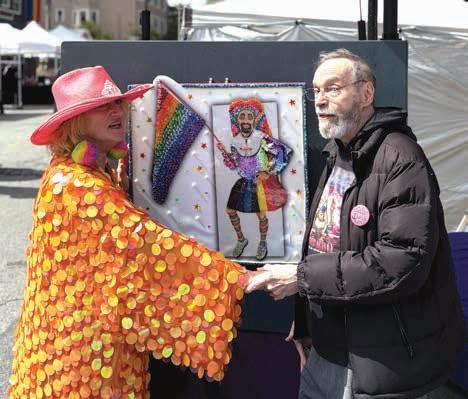
administration’s communications policy. Now, only videos of those moments are available and there is no accompanying transcript. Sister Dana sez, “What is the White House trying to hide? Do they not want to have PROOF of this dictator’s huge decline in mental and physical health?!” But if we want documents, the AMERICAN PRESIDENCY
PROJECT has nearly 170,000 records to check out, and if we want transcripts, we can get facts at https://rollcall.com/factbase/
Sister Dana sez, “Happy FATHER’S DAY on June 15 to all you Dads, Daddies, and Drag King Fathers! Your offspring are awesome!”
(continued on page 50)
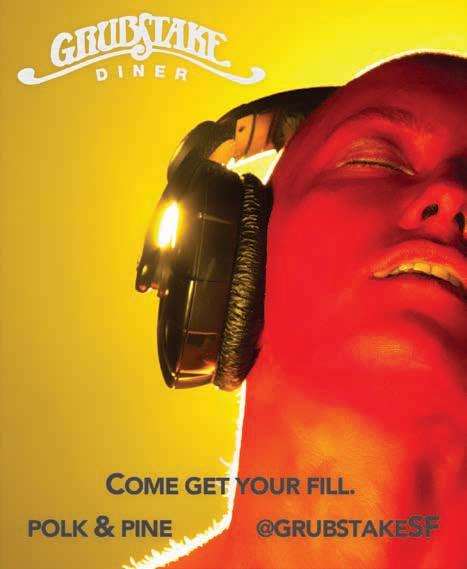
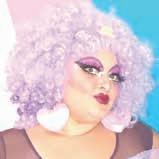
“Have fun, be with community, have a gay ol’ time”
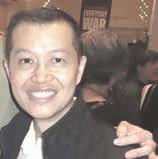
“I am looking forward to Tita Aida being Community Grand Marshal and Juanita MORE!’s Pride Party benefiting the Transgender Law Center”
BROADWAY BARES SF: HEX APPEAL is June 15, 8 pm at 1015 Folsom Street. Each year, Broadway Bares SF brings together a community of dancers, dreamers, and doers for a night unlike any other. This year’s show, Hex Appeal, brings a spellbinding cast of performers ready to enchant you with show-stopping moves and mesmerizing stage presence. The vibe is a little spooky, sparkly, and a whole lot
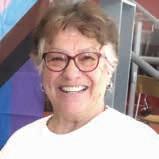
“The Pride Parade and Pride parties”
of fun. Featuring RuPaul’s Lady Camden , illusionist Jack Alexander, and cabaret star Leanne Borghesi, and a few magical surprises—this cast might just leave you bewitched. All proceeds benefit THE RICHMOND/ERMET AID FOUNDATION (REAF) and BROADWAY CARES/EQUITY FIGHTS AIDS (BCEFA) https://www.reaf-sf.org/

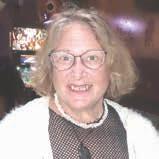
“To bring art to Polk Street”
Since Trump became Presi-dense in January, he has changed his tariff policy more than 50 times. Because of this maddening behavior, a delicious meme has emerged in calling him TACO ( Trump A lways Chickens O ut)! Sister Dana sez, “He is definitely el pollo loco, so I need to change my restaurant order from tacos to burritos, please!”
Everything you ever wanted to know about FRAMELINE FILM FESTIVAL, “The World Is Watching,” June 18–28 is at https://www.frameline.org/
Join Donna Sachet and the AIDS LEGAL REFERRAL PANEL (ALRP) at Hot Johnnie›s, 4077 18th Street on June 21, 2–5 pm for a GARDEN PARTY ! ALRP is protecting the rights, dignity, and health of people living with HIV/AIDS. Open bar, hors d’oeuvres, win $100 for Best Summer Hat! https://www.alrp.org/
SAN FRANCISCO GAY MEN’S CHORUS will present THE PRIDE CONCERT, a musical celebration of Trans and Nonbinary Voices, featuring special guest Justin Tranter (famous songwriter for Lady Gaga, Chappell Roan , and Sam Smith) on June 21, 1 pm & 7:30 pm at Curran Theatre. https://www.sfgmc.org/
Every first Sunday, mark your calendars for shopping joy therapy in San Francisco’s iconic Castro neighborhood. From noon–5 pm enjoy the fabulous CASTRO ART MART featuring dozens of local artists, small businesses, and live entertainment taking over Noe and Market Streets, infusing creative joy and queer spirits! At Castro Art Mart on June 1, I delighted in seeing two of my fave artists, superb photographer Gareth Gooch and exquisite portrait painter Deidre Defranceaux I was thrilled to discover a new, miniaturized, more sparkly Sister Dana rainbow nun portrait by Deige on display!
Activists and community leaders Alex U. Inn and Juanita MORE! have
compiled by Rink
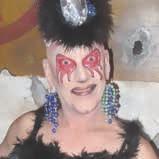
“Spread happiness and joy”
announced details for their sixth annual Pride event, PEOPLE’S MARCH & RALLY – UNITE TO FIGHT! While in past years the event was held on Pride Sunday, this year it will be on Sunday, June 22. It will begin with a rally at 11 am at the corner of Polk and Washington Streets in San Francisco, featuring speakers and entertainers; then march down Polk Street—the same route as the first Gay Liberation Protest, which occurred on Saturday, June 27, 1970. The march will end at Civic Center for a celebration of culture and community with DJs, performers, and artists’ booths from 12:30–4 pm. https://juanitamore.com/
On June 7, the official 30TH ANNUAL PINK TRIANGLE installation on Twin Peaks was celebrated—including inspiring speeches by Pink Triangle Co-founder Patrick Carney, SF Mayor Daniel Lurie, and Senator Scott Wiener. The Pink Triangle will be visible all month long! Later, on June 7, MAITRI (“no one should suffer, transition, or die alone”) and its Chief Executive Officer Michael Armentrout presented the HEELS FOR HOPE variety show fundraiser at Marines’ Memorial Theatre. Glorious entertainment was provided by hilarious standup Baruch Porras-Hernandez, amazing, amusing costumed circus troupe Fou Fou Ha , and RuPaul Drag Race ’s drag singer-songwriter Adore Delano
Sister Dana sez, “Congratulations to the SF Pride Committee for naming this year’s PRIDE PARADE CELEBRITY GRAND MARSHAL to be Emmy-winning writer Harper Steele! She is known for her starring role in Netflix’s stunning documentary, ‘Will and Harper,’ following her transition.”
WORLD PRIDE DC is celebrating its 50th Anniversary. Sister Dana sez, “We in San Francisco can be proud of our 55th annual PRIDE CELEBRATION, ‘Queer Joy Is Resistance,’ on Saturday and Sunday, June 28 & 29!”






LGBTQ News & Calendar for the Bay Area

CELEBRATING FOUR DECADES Est. 1978

HONORED TO BE A LEGACY BUSINESS OF THE CITY OF SAN FRANCISCO, THE BAY TIMES IS THE MOST COMMUNITY-ENGAGED LGBTQ+ NEWS SOURCE IN NORTHERN CALIFORNIA



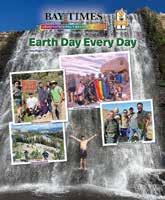
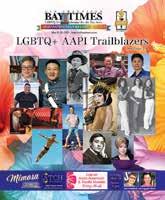
Founded in 1978 by gay men & lesbians working together, the San Francisco Bay Times welcomes your support.
